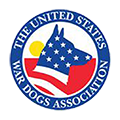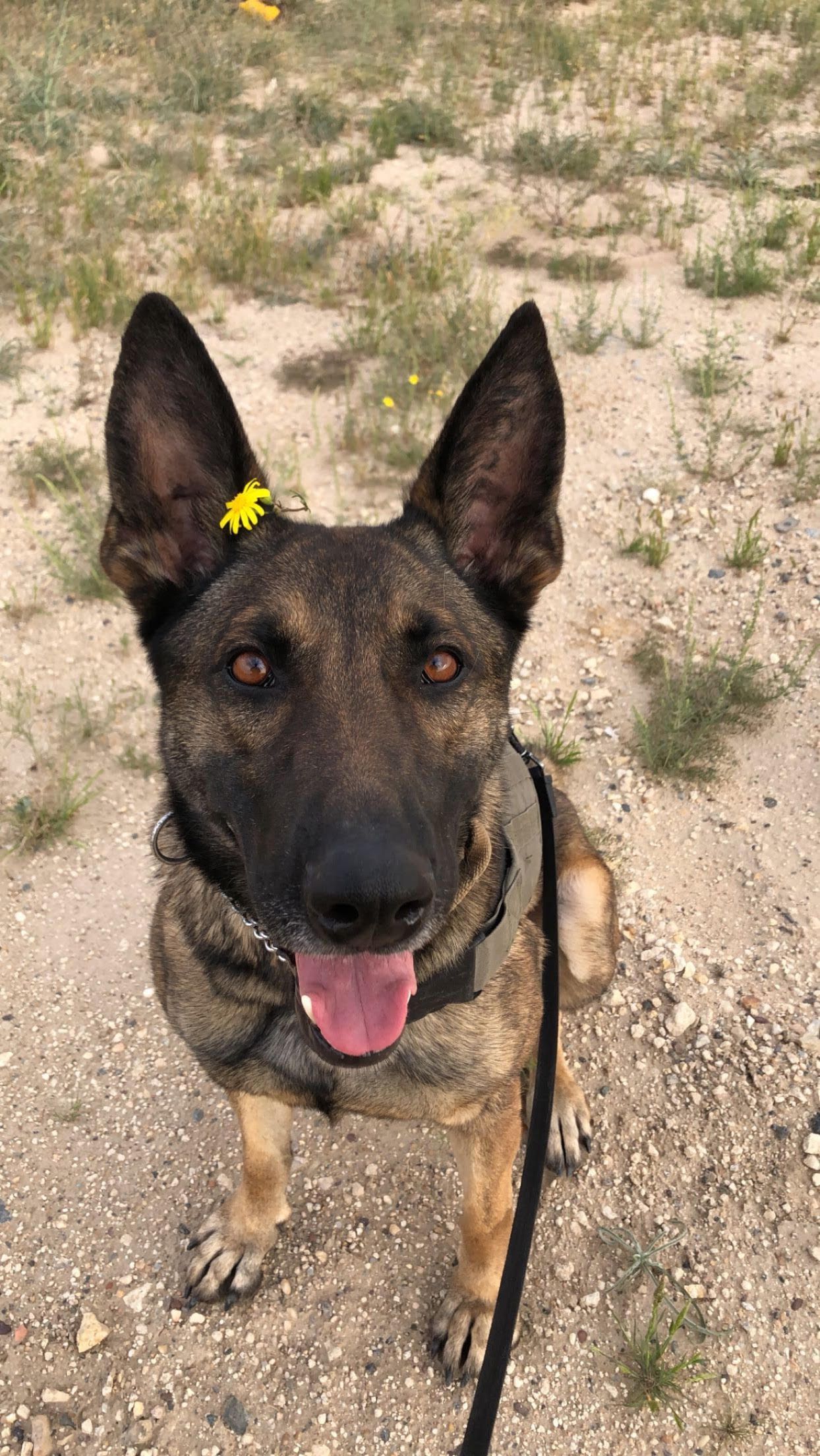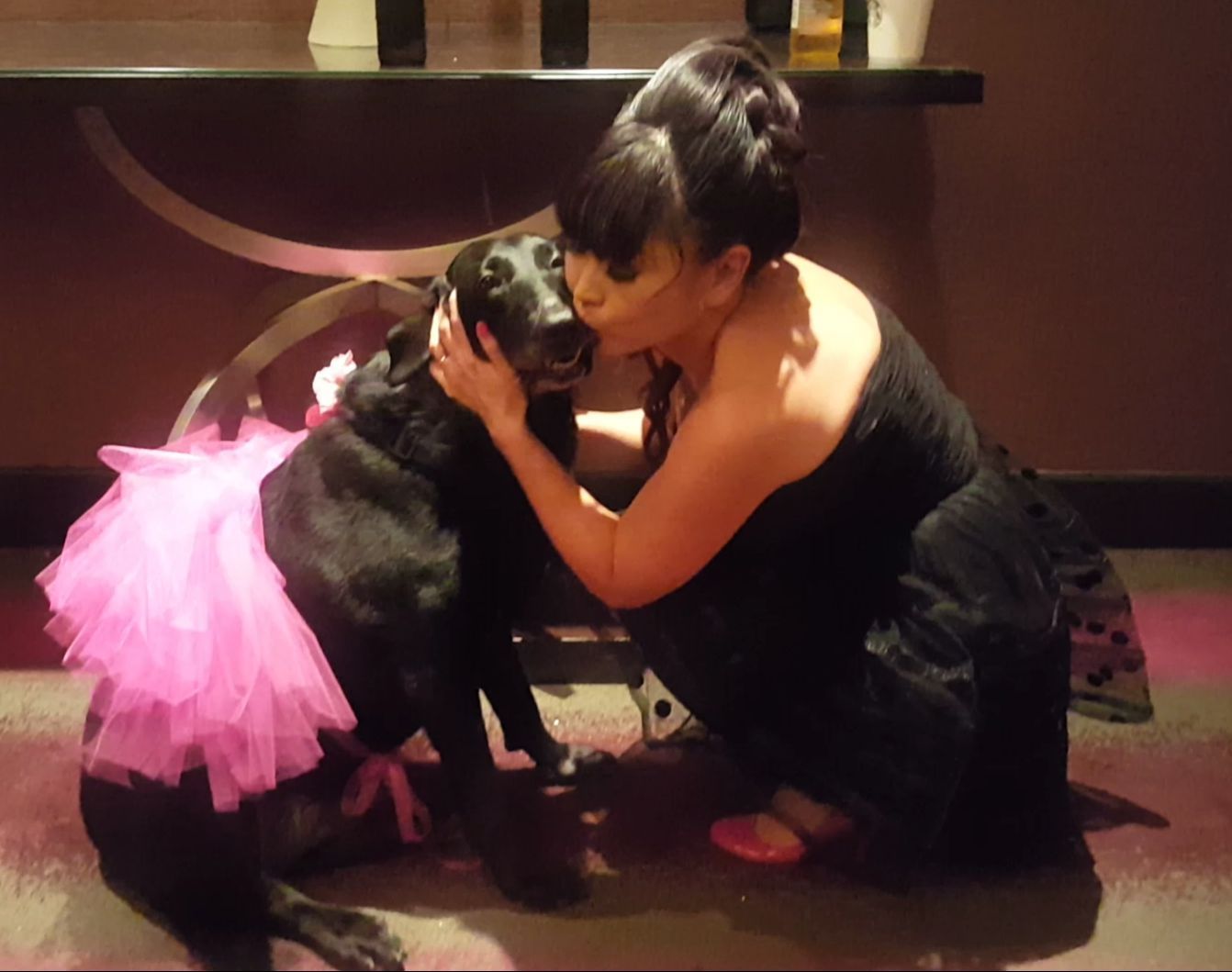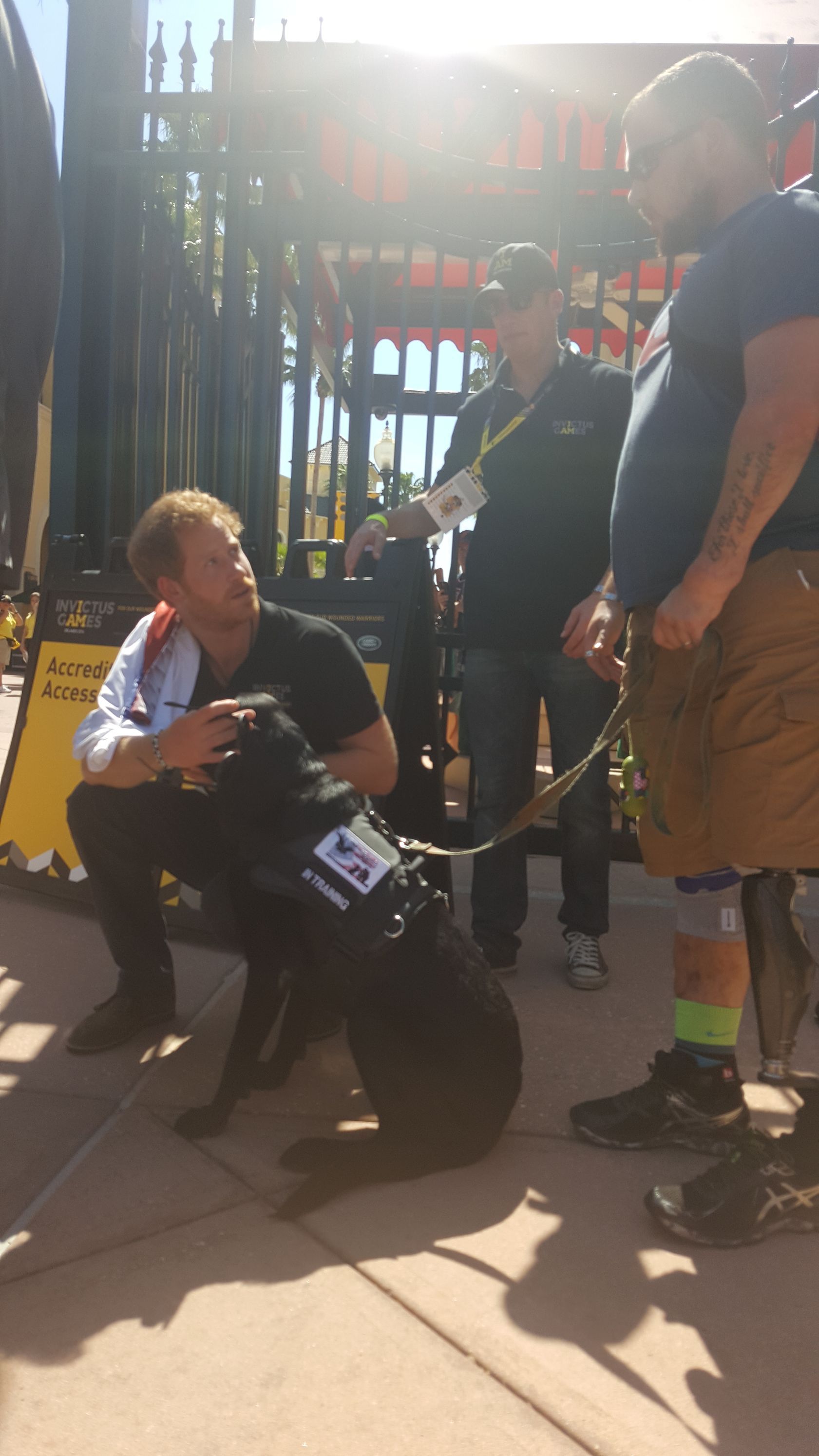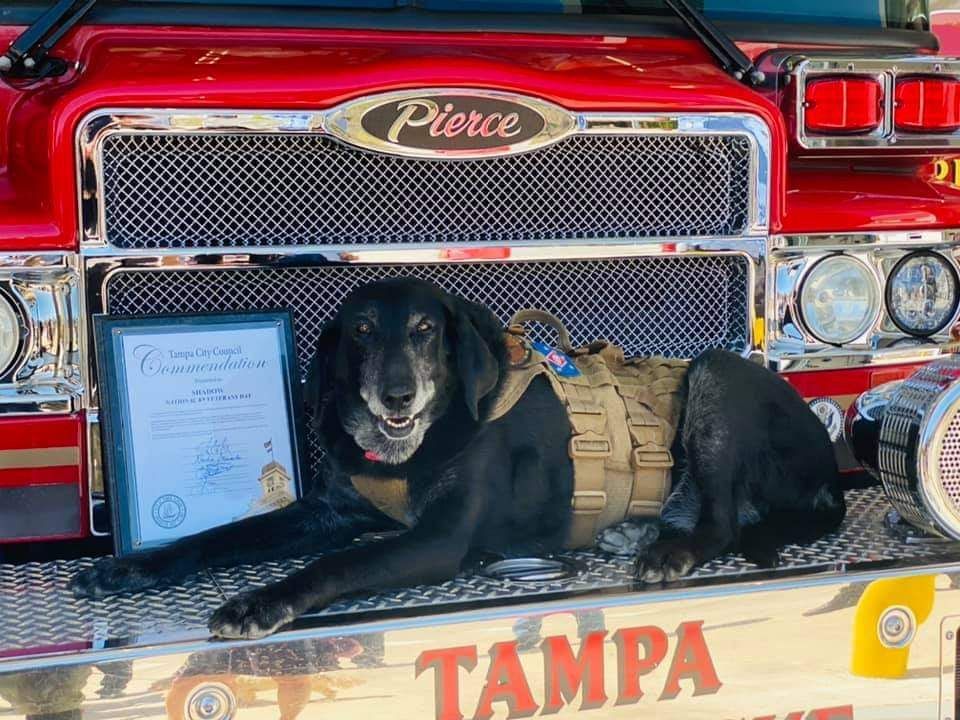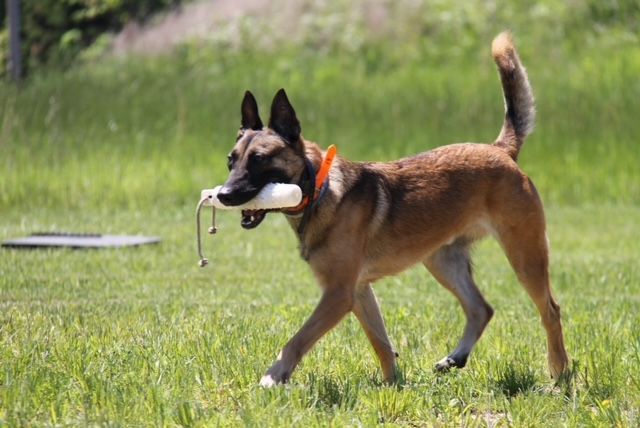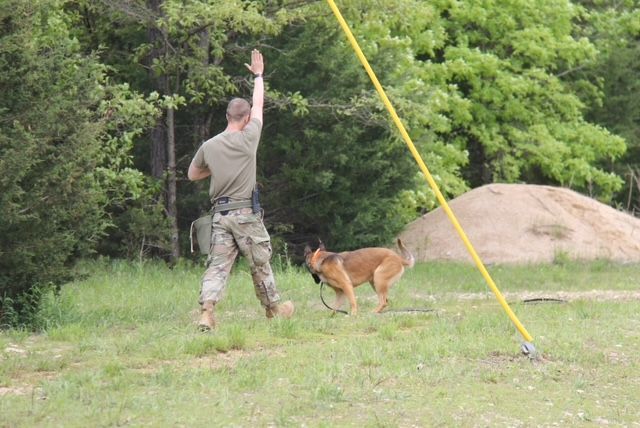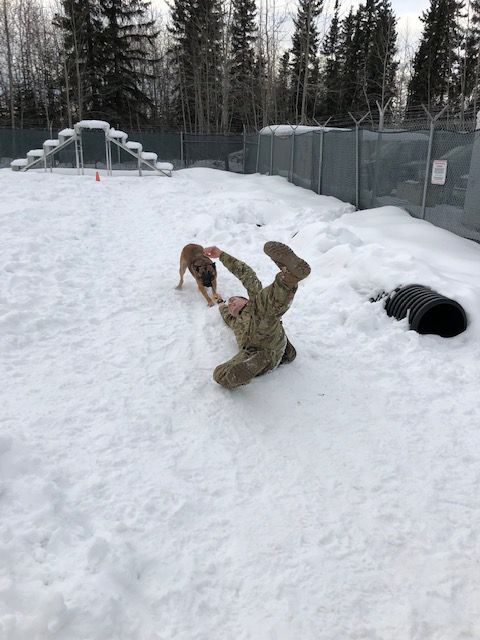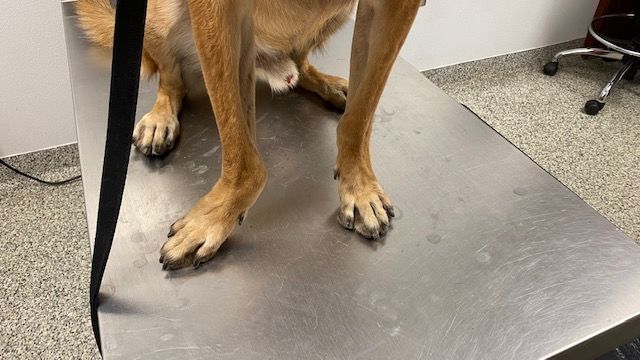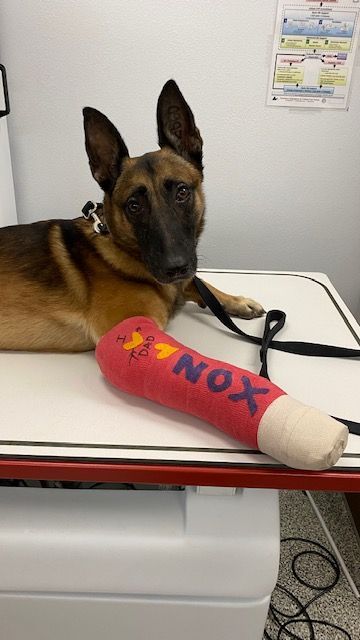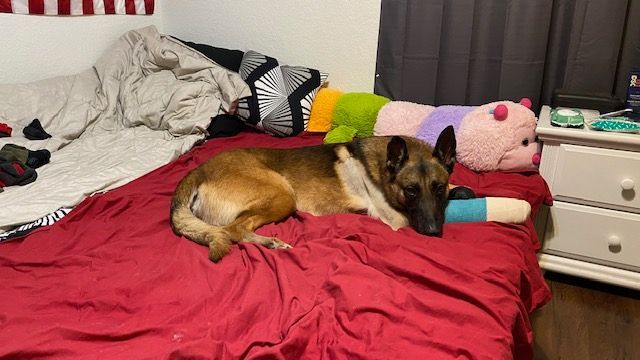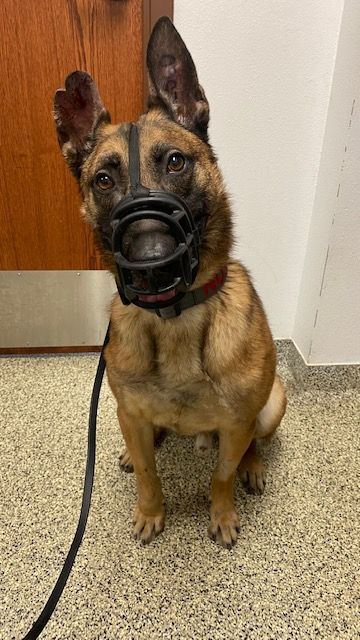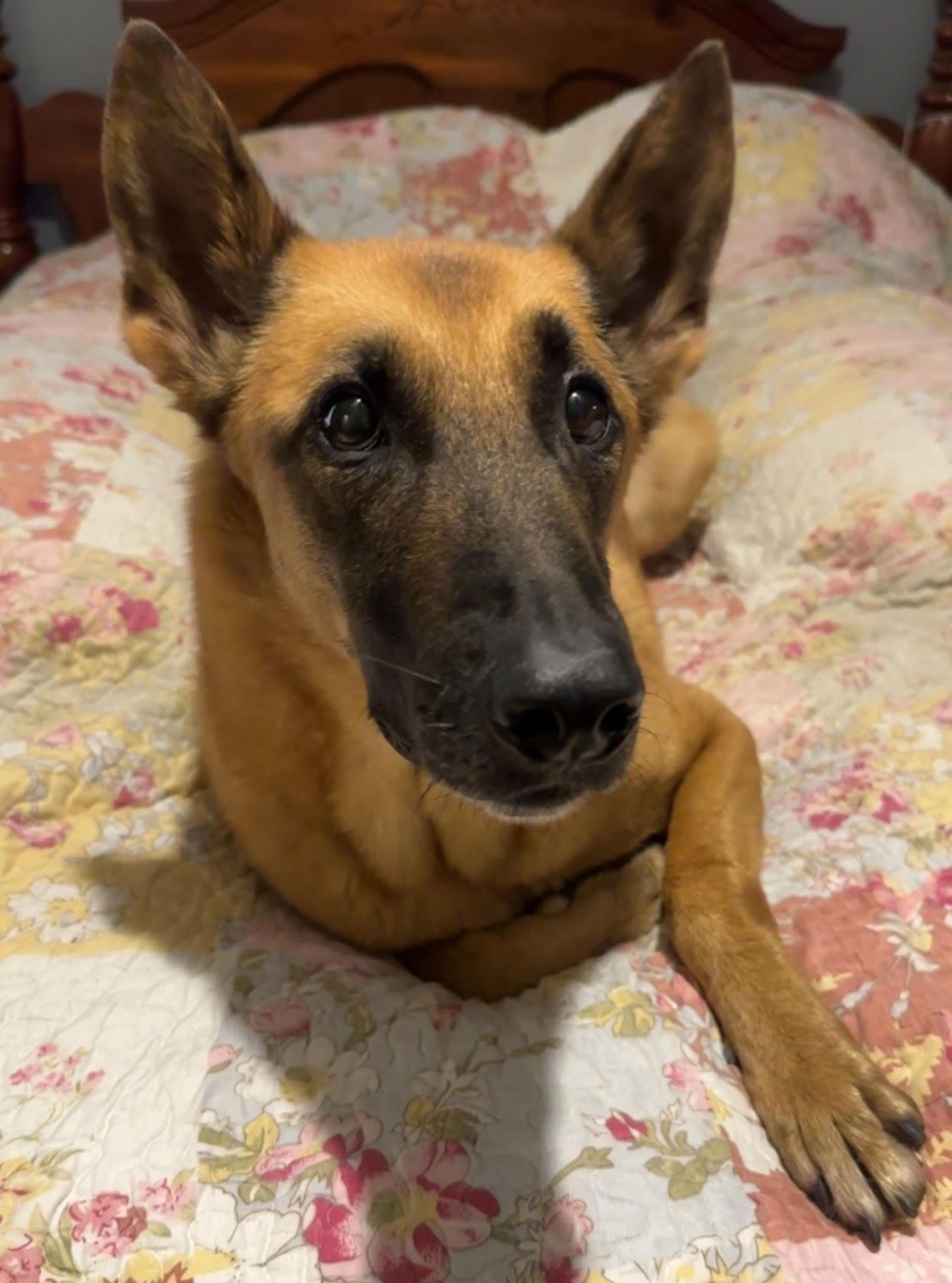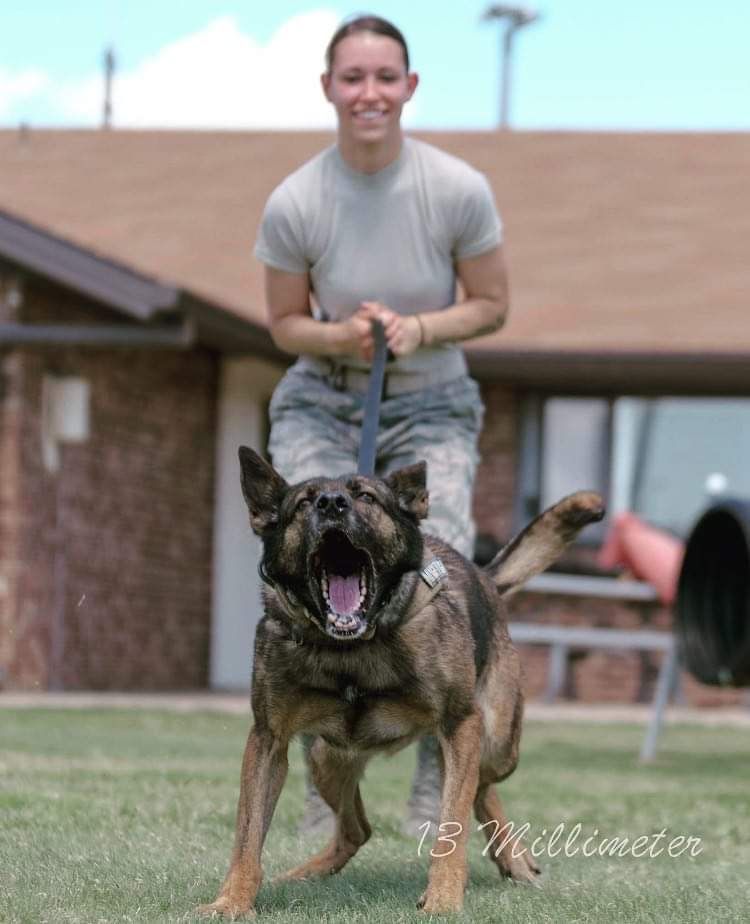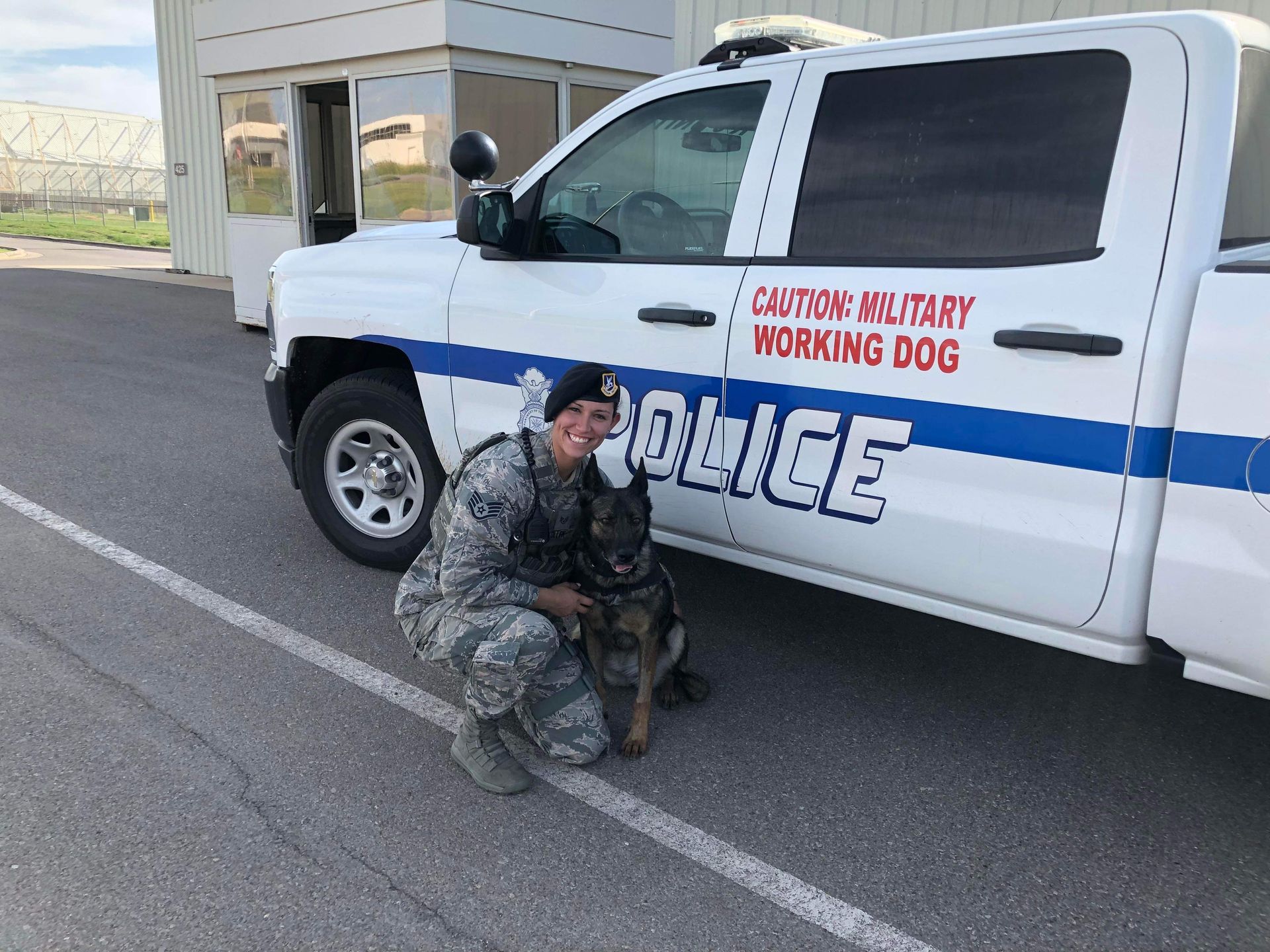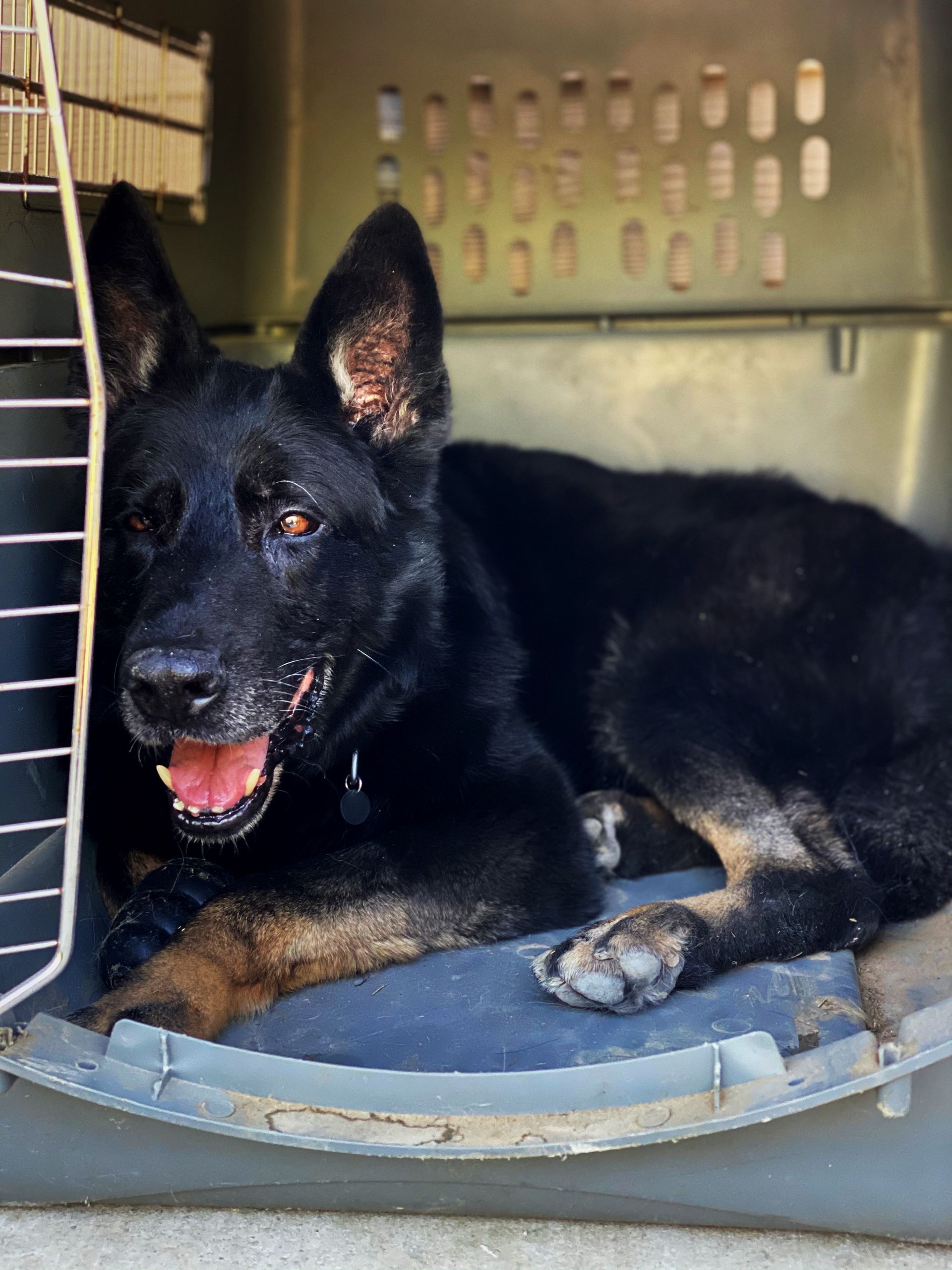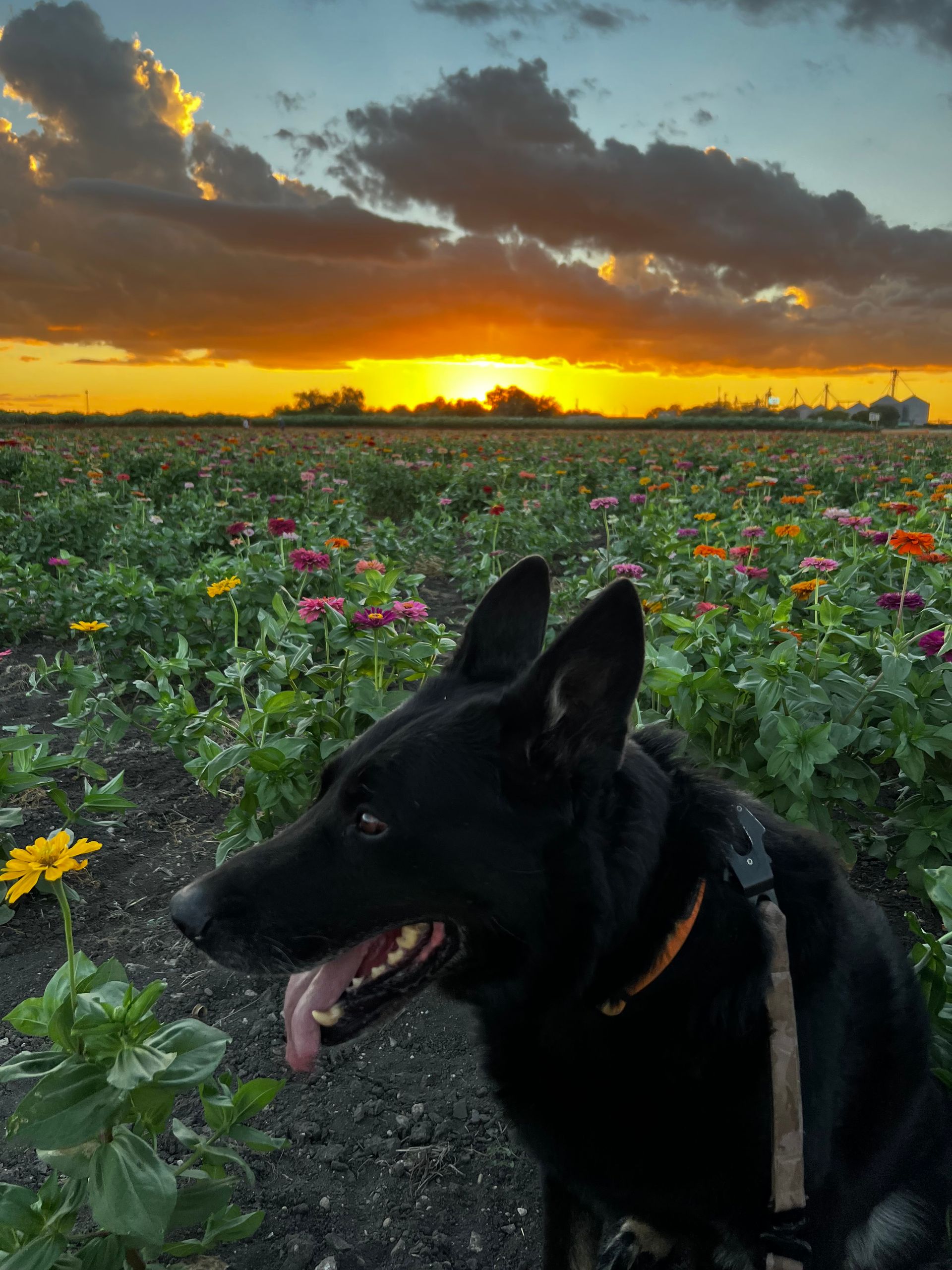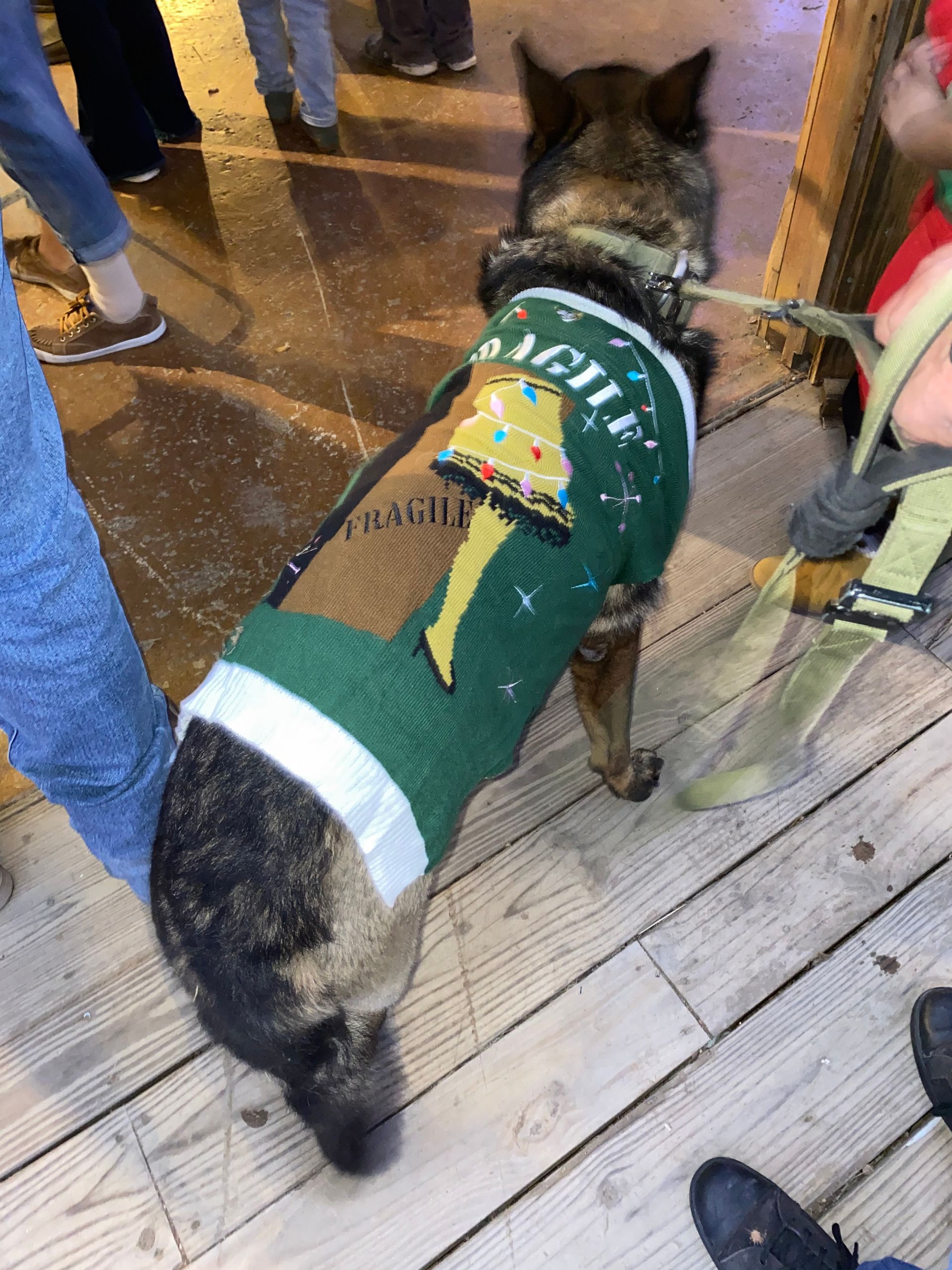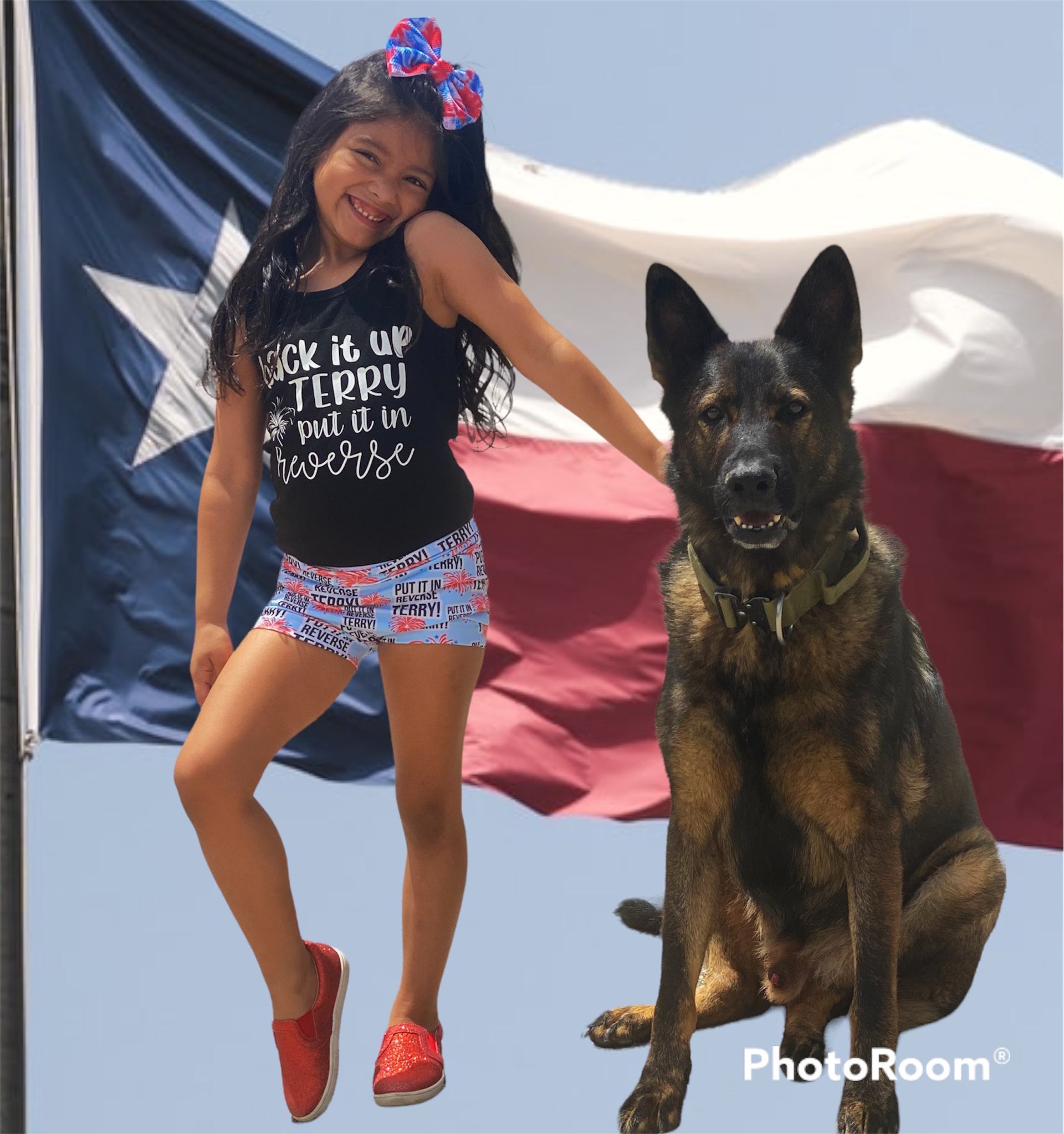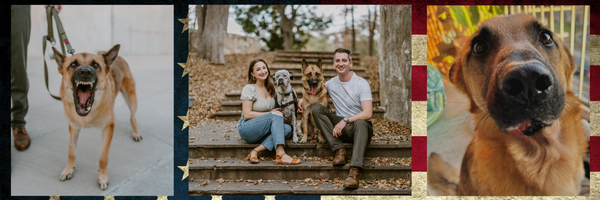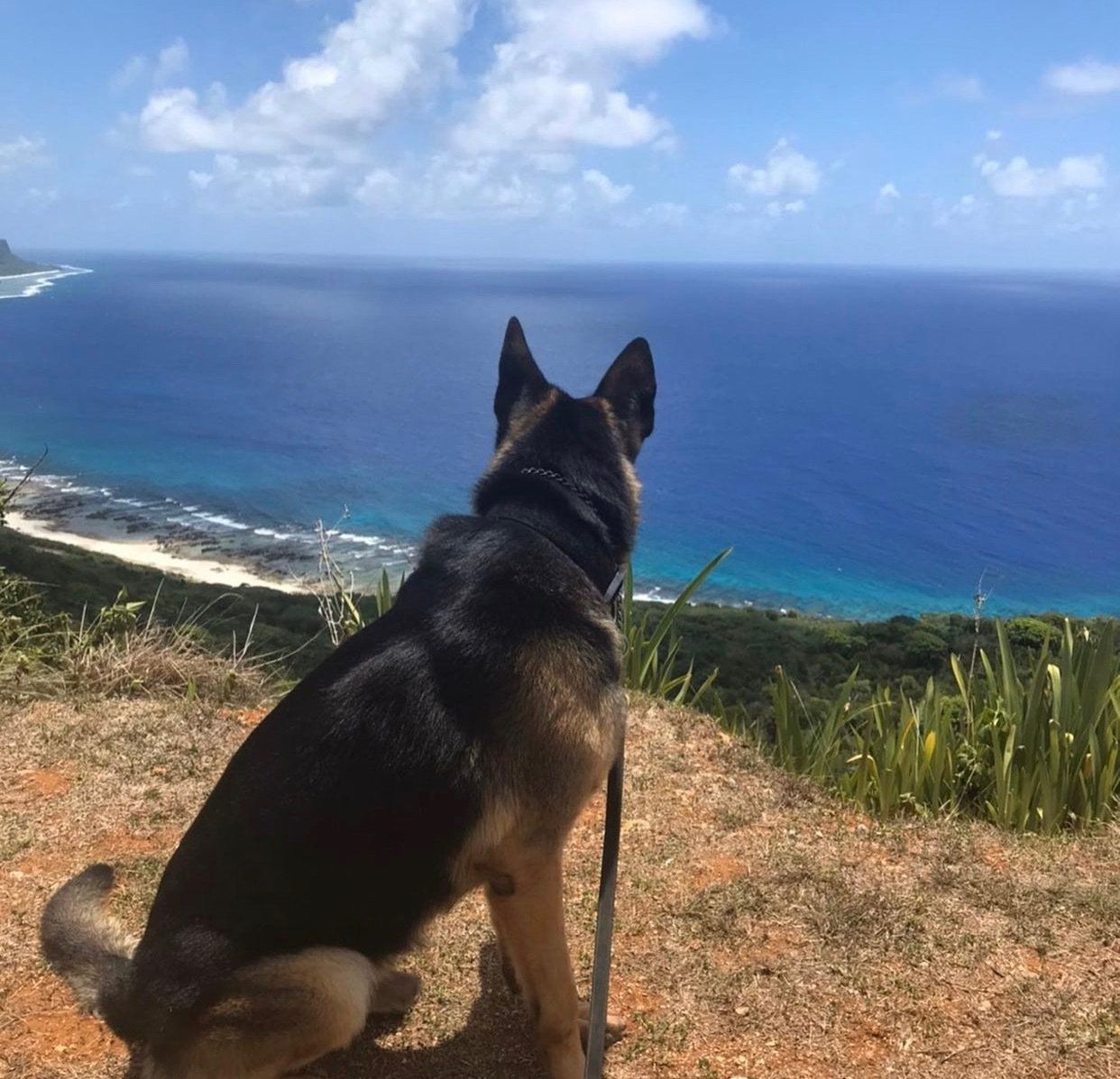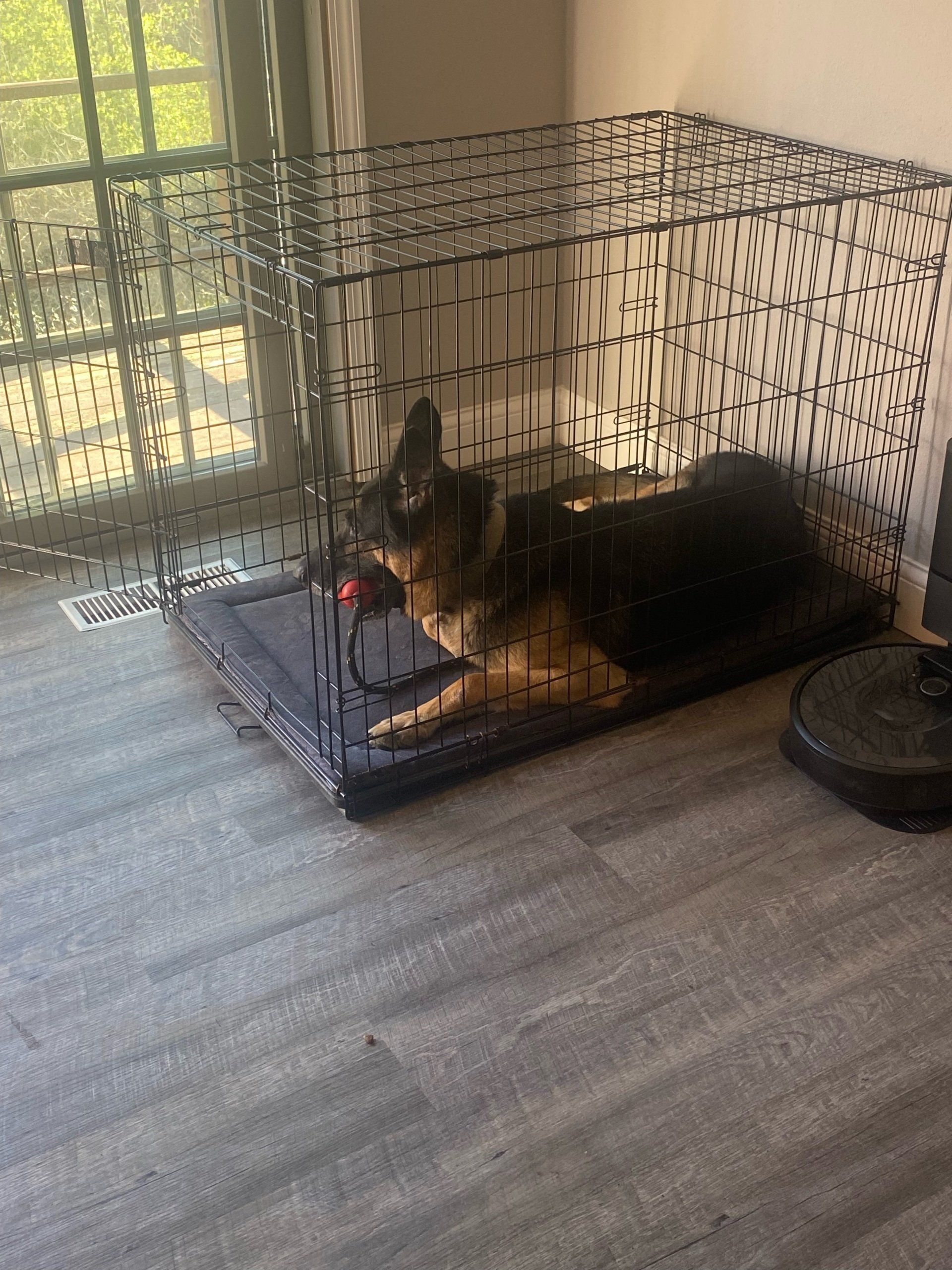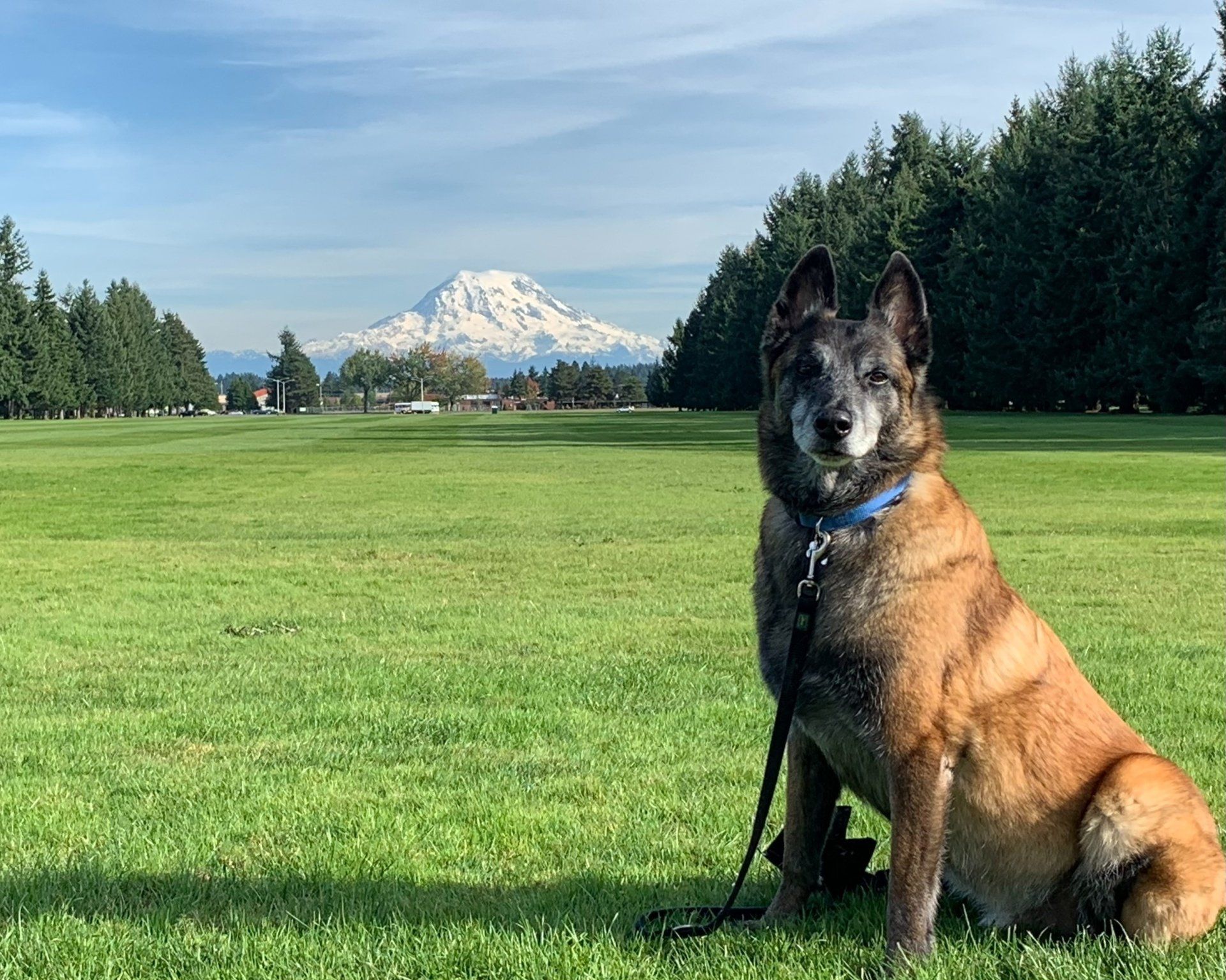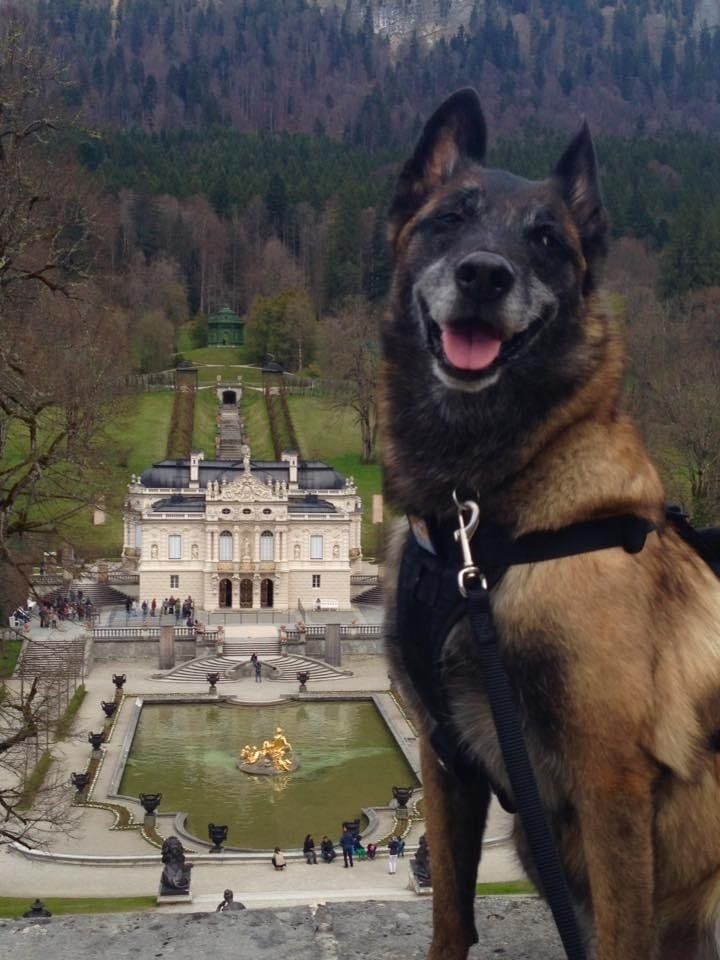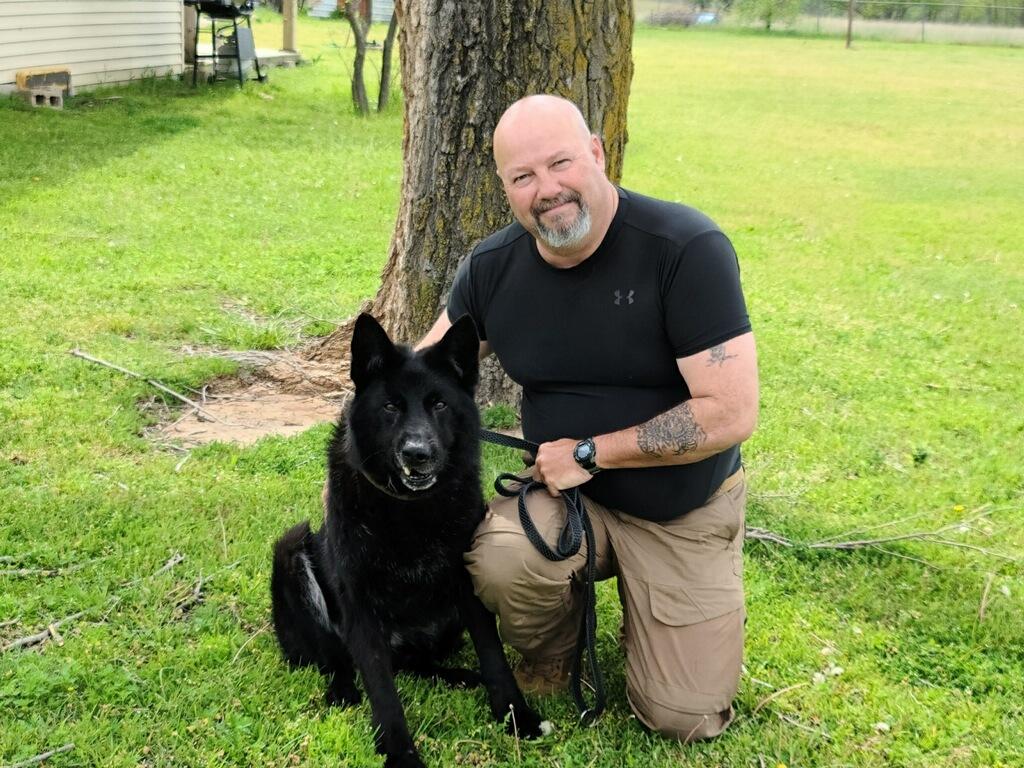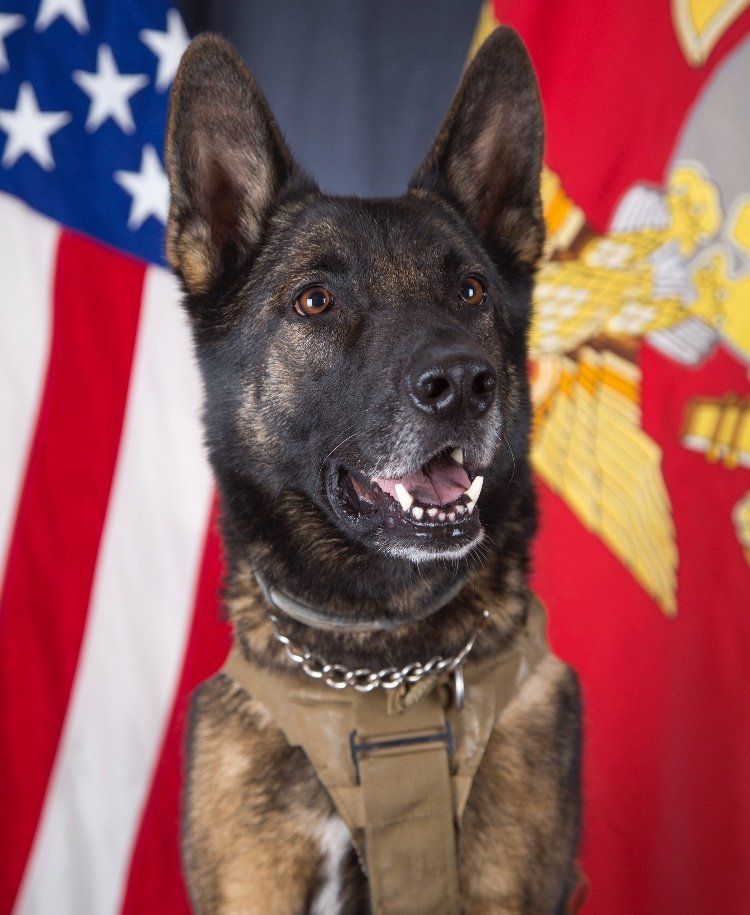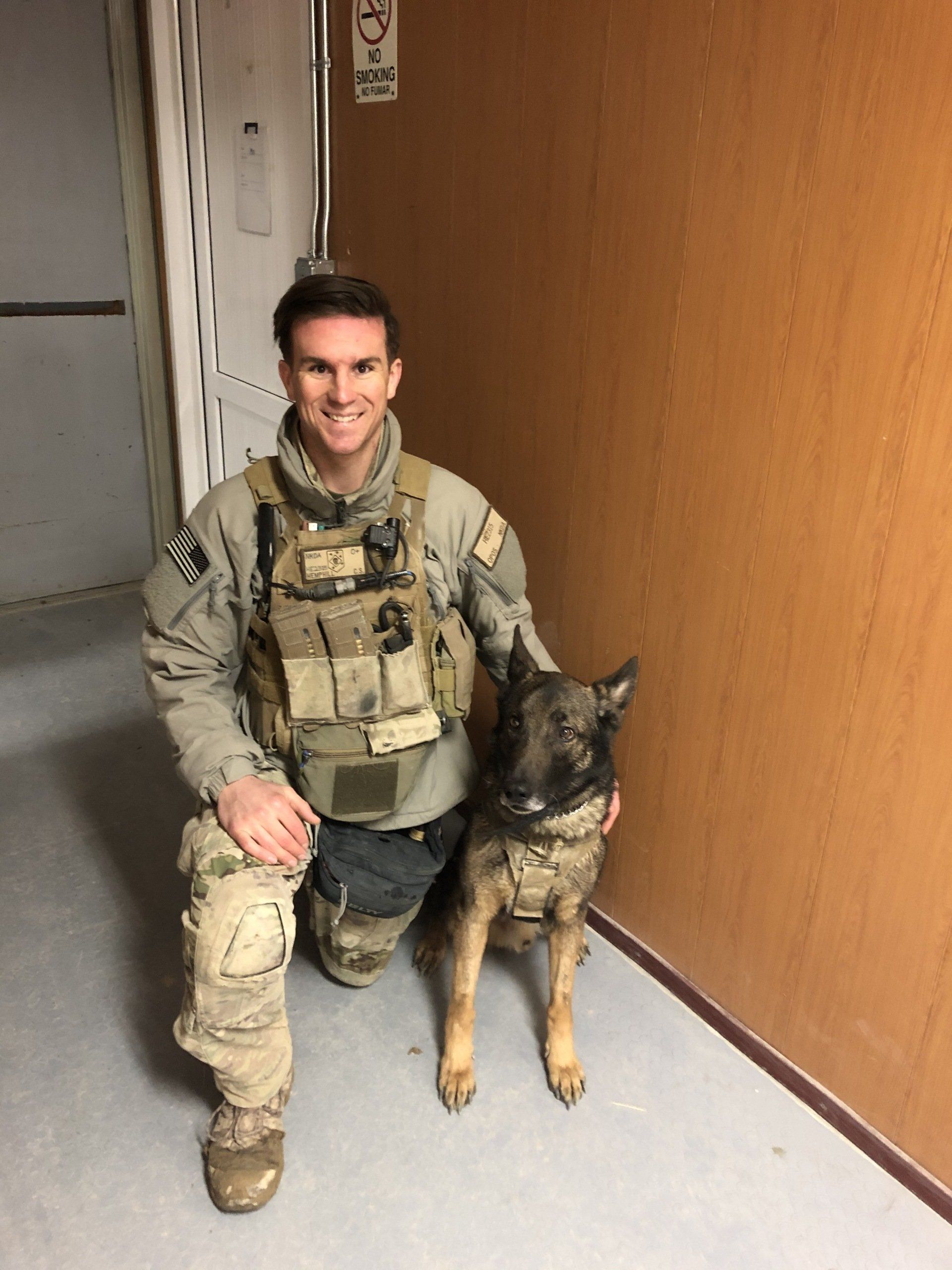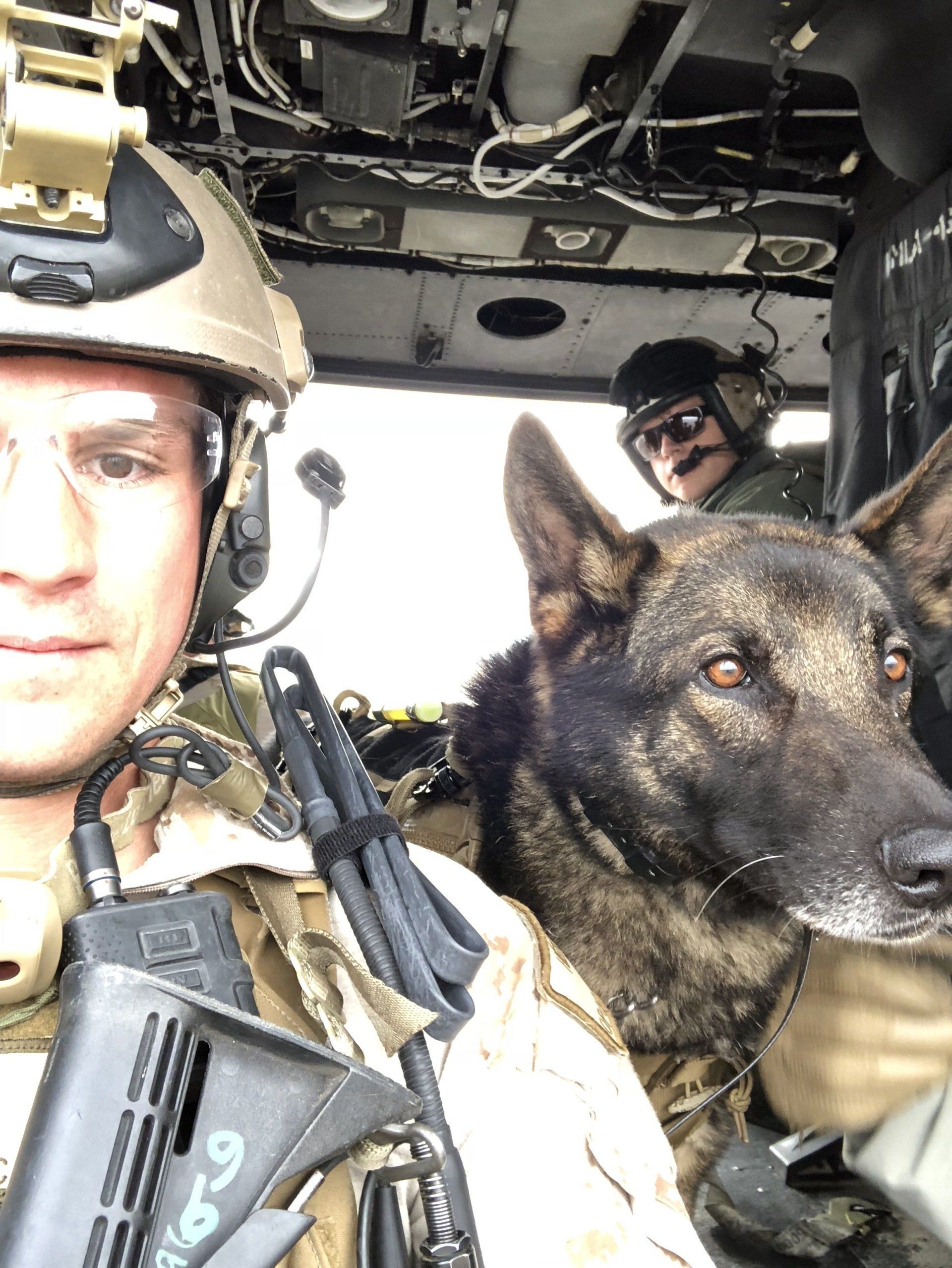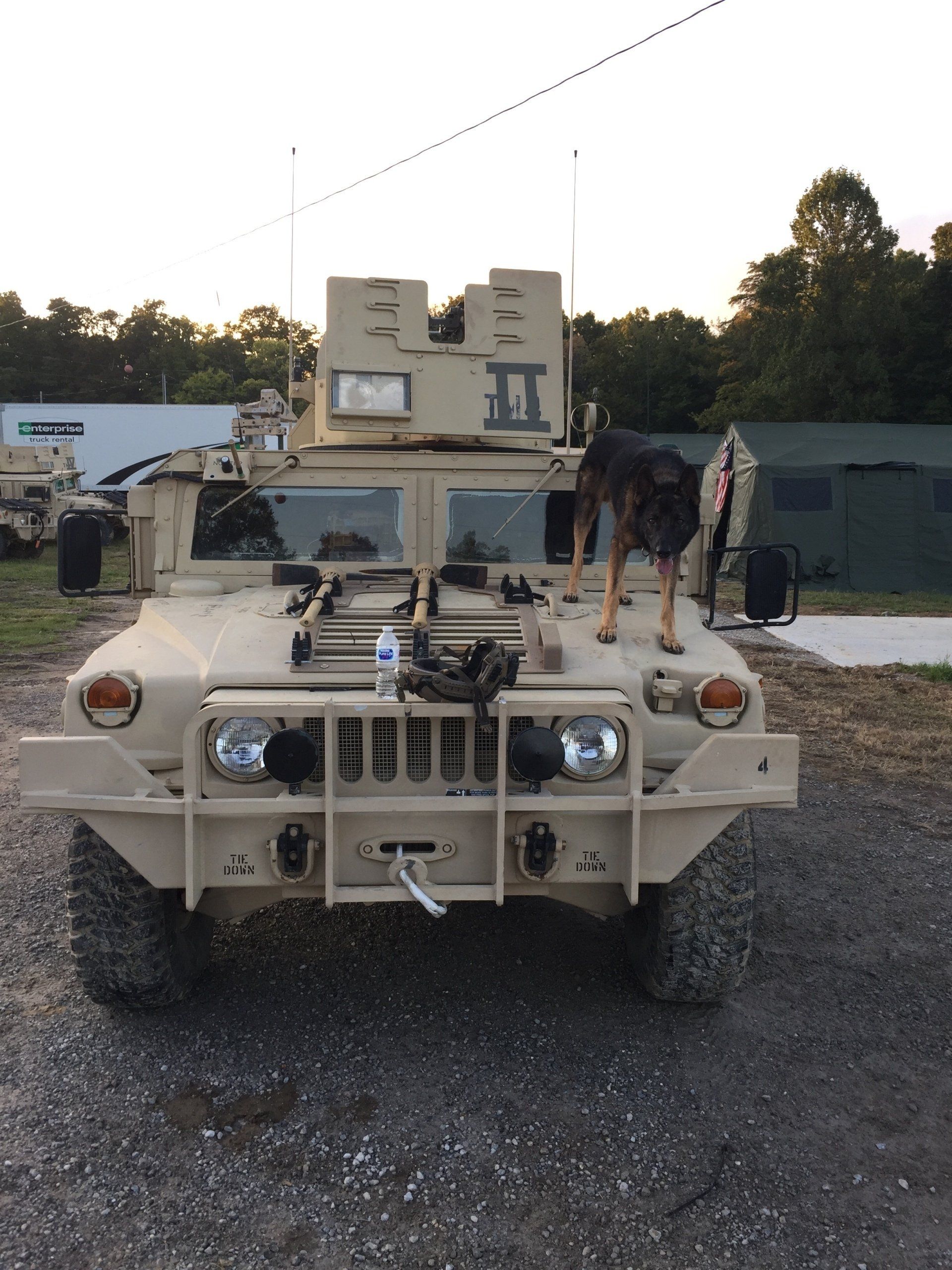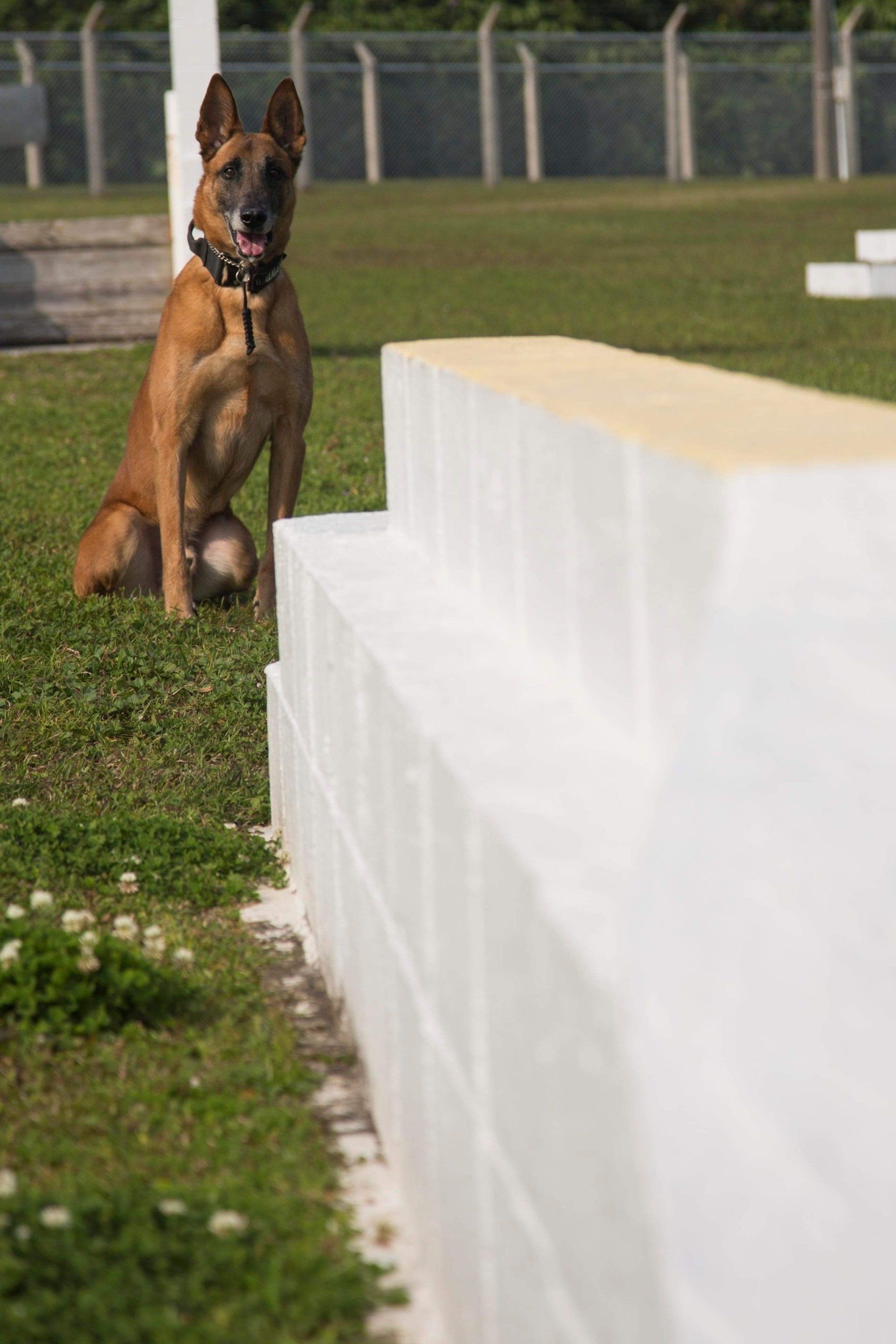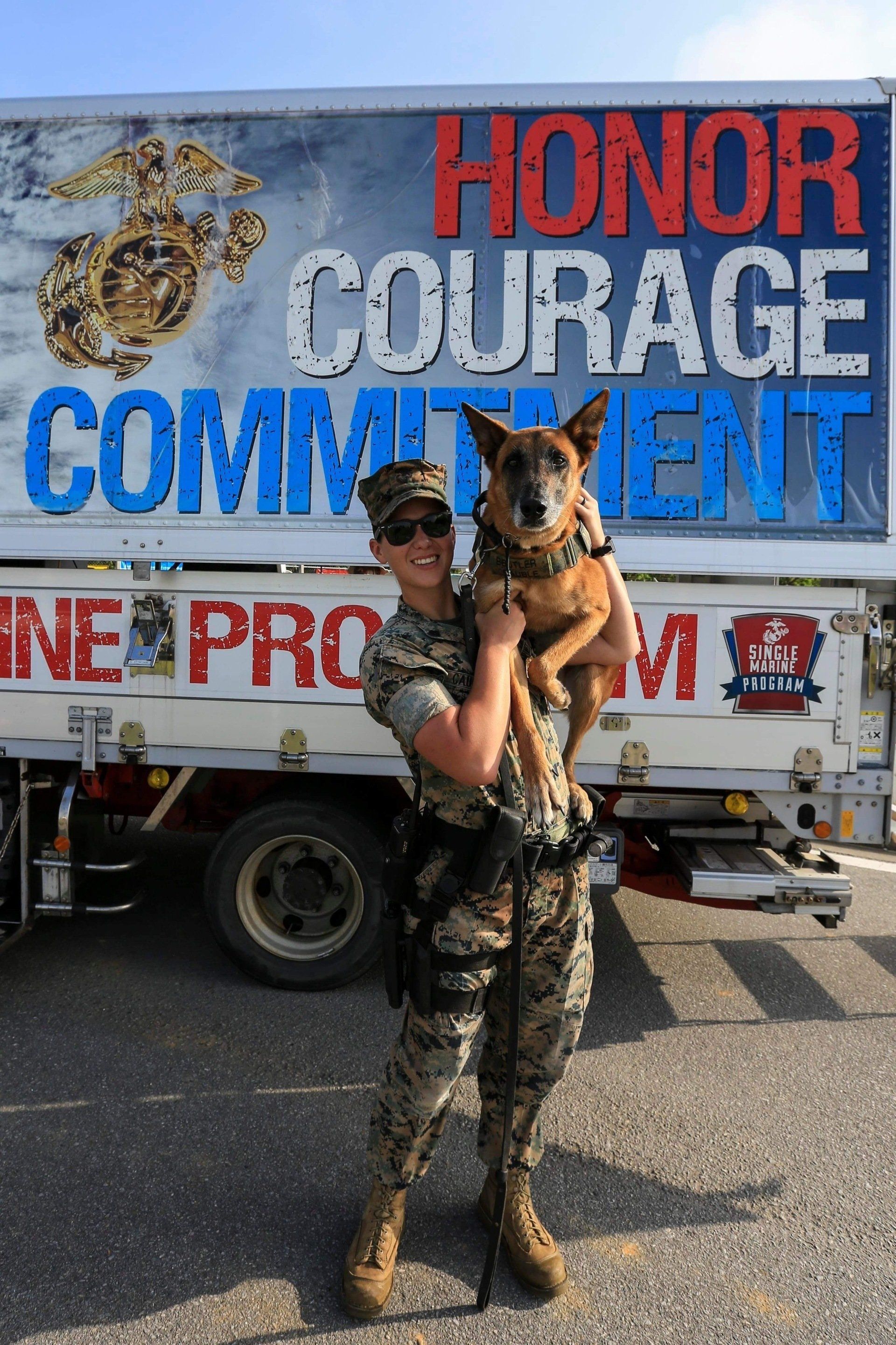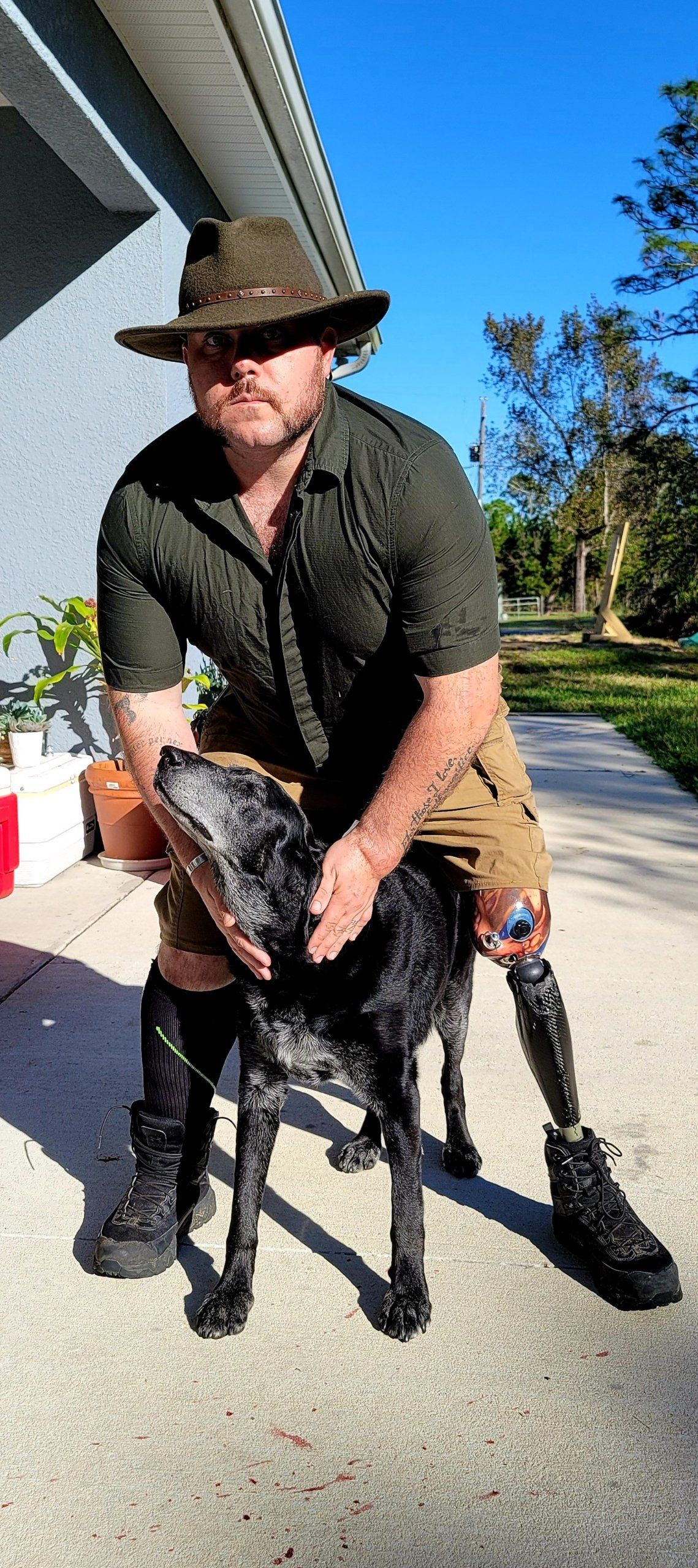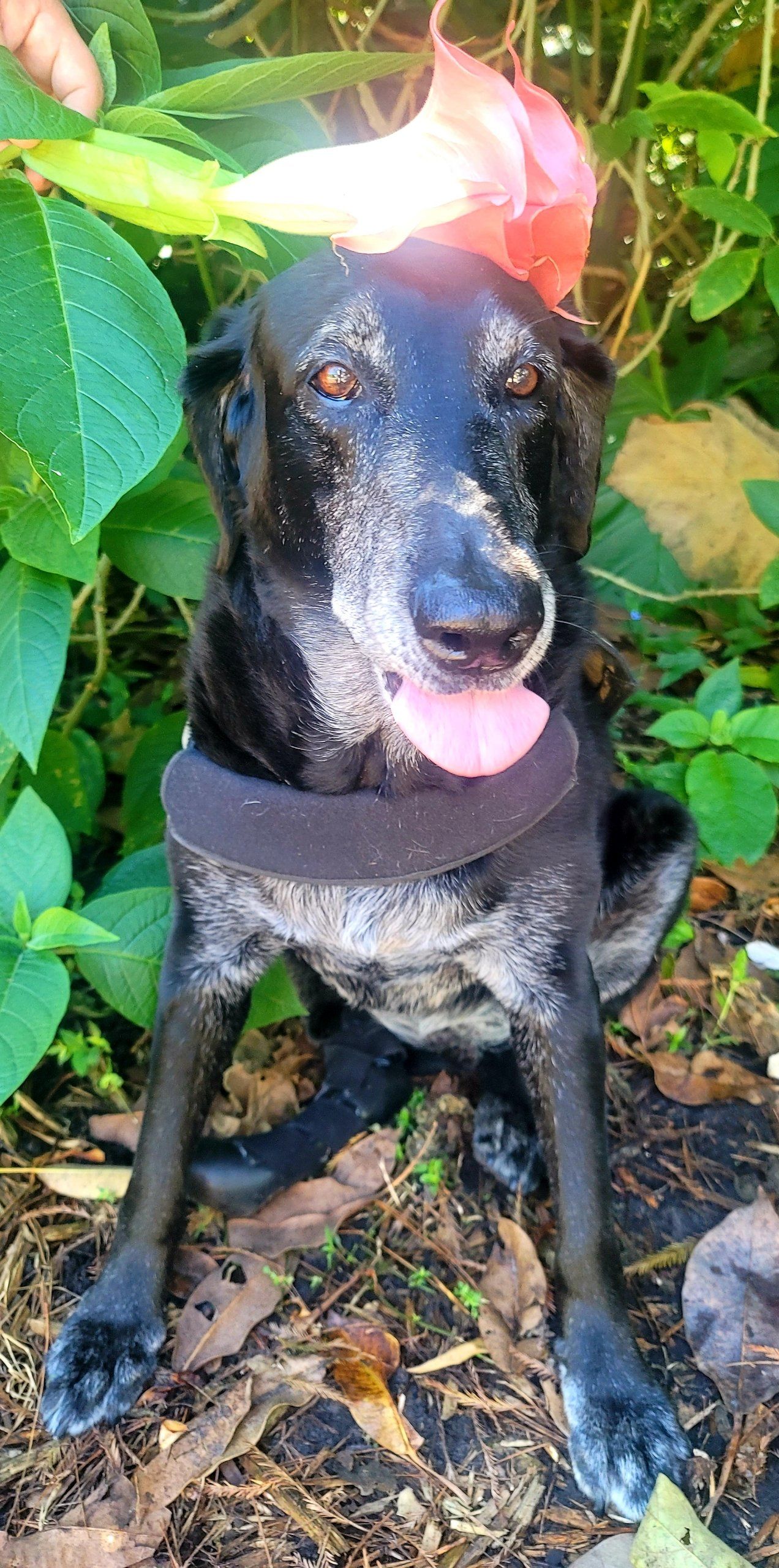WAR DOGS CASE STUDIES
A Tribute to MWD Belle: A Life of Purpose, Love and Service
From the moment Belle met Sgt. Sam Wettstein, her purpose was clear — she was born to serve. As a US Marine Corps single-purpose IED detection dog, who served for four years with 1st Combat Engineer Battalion, Belle had an unmatched drive and an undeniable bond with Sam from the very beginning.
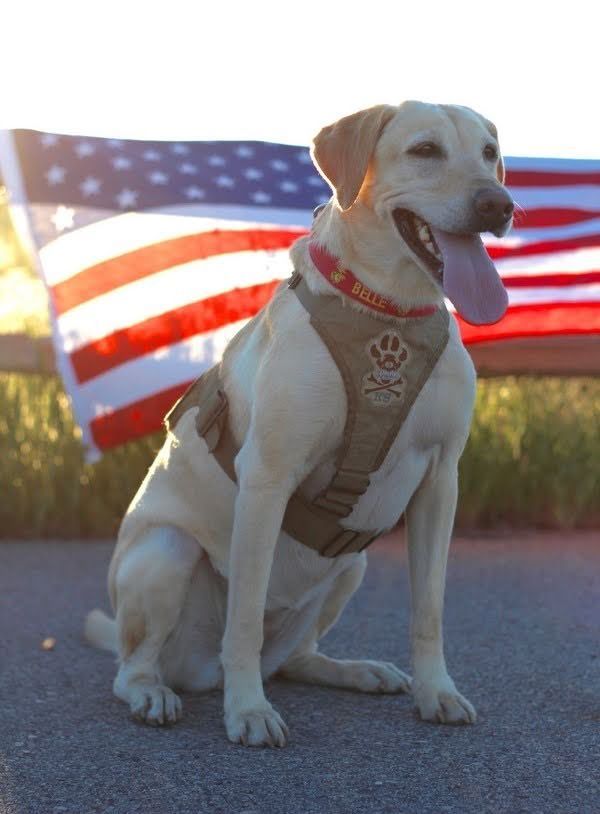
Sam and Belle were matched based on a preferences survey and their connection was instant, as if they shared the same thoughts and determination. They trained at K2K9 dog school, quickly proving to be an exceptional team, culminating in them receiving the Top Dog Award.
The two were deployed to Afghanistan in 2013, where Belle’s drive to work hard continued. During their deployment, Belle navigated rough terrain with confidence and precision, working to clear the way of several IEDs. “I had full confidence in Belle”, recalls Sam. “It was scary when she’d enter compounds alone, but she had great instincts and always knew when it was safe.”
Her instincts weren’t just sharp in work settings. She also picked up on the emotions and feelings of those around her… One night in the cold of Afghanistan, the temperatures dropped to single digits. Sam woke up to Belle, who had snuggled into his sleeping bag to keep him warm, her wet nose peeking out from the top. Her protection went beyond combat, it was an unbreakable display of loyalty, love and devotion.
During their last mission, an IED hit the vehicle directly in front of their truck. Luckily, the size of their truck saved the duo from sustaining serious damage, but the immense pressure from the explosion - unbeknownst to Sam - would affect Belle for the rest of her life.
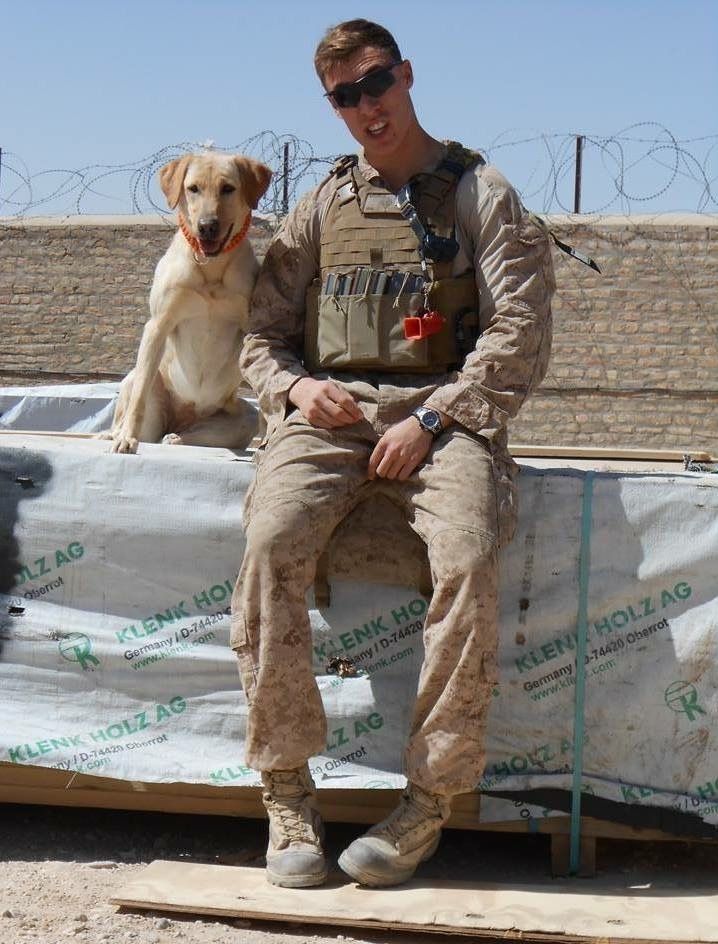
Call
While deployed, Sam put in his adoption paperwork for Belle, hoping to be reunited after her service. About two months later, he received an unexpected call.
“I was called and asked to give Belle a command over the phone. As I did, her demeanor changed,” said Sam. He was told that Belle was suffering from PTSD and would be medically retired. Sam knew he needed Belle back with him and did all he could to ensure they were reunited as soon as possible. Mission K9, an organization that reunites dogs with their handlers, stepped in without hesitation to ensure Belle and Sam were together again.
Homecoming
In July 2014, their anticipated reunion event took place at the San Diego airport, where a large crowd of reporters and well-wishers gathered to welcome Belle home. Once she was home, Sam focused on keeping Belle actively engaged in bumper drills, hiding things throughout the house and taking her duck hunting to aid her transition to civilian life. Belle found comfort in accompanying Sam as he worked with dogs in training with Labs for Liberty: An organization that trains Labradors to become service dogs for veterans with PTSD. Belle was a natural role model and enjoyed demonstrating the discipline and dedication required for their future roles. Sam could see how much Belle thrived in this mission, she had found renewed purpose and fulfillment.
Several years later, fate intervened once more when Belle met Susan. Susan had just moved in across the street after experiencing a life-altering traumatic event. The connection between them was spectacular. Belle recognized Susan’s pain and, just as she had with Sam, instinctively offered support and comfort. In 2019, their bond was sealed when Belle officially became Susan’s service dog, helping her navigate the challenges of PTSD. In June 2020, Sam and Susan married, making the three of them a forever family.
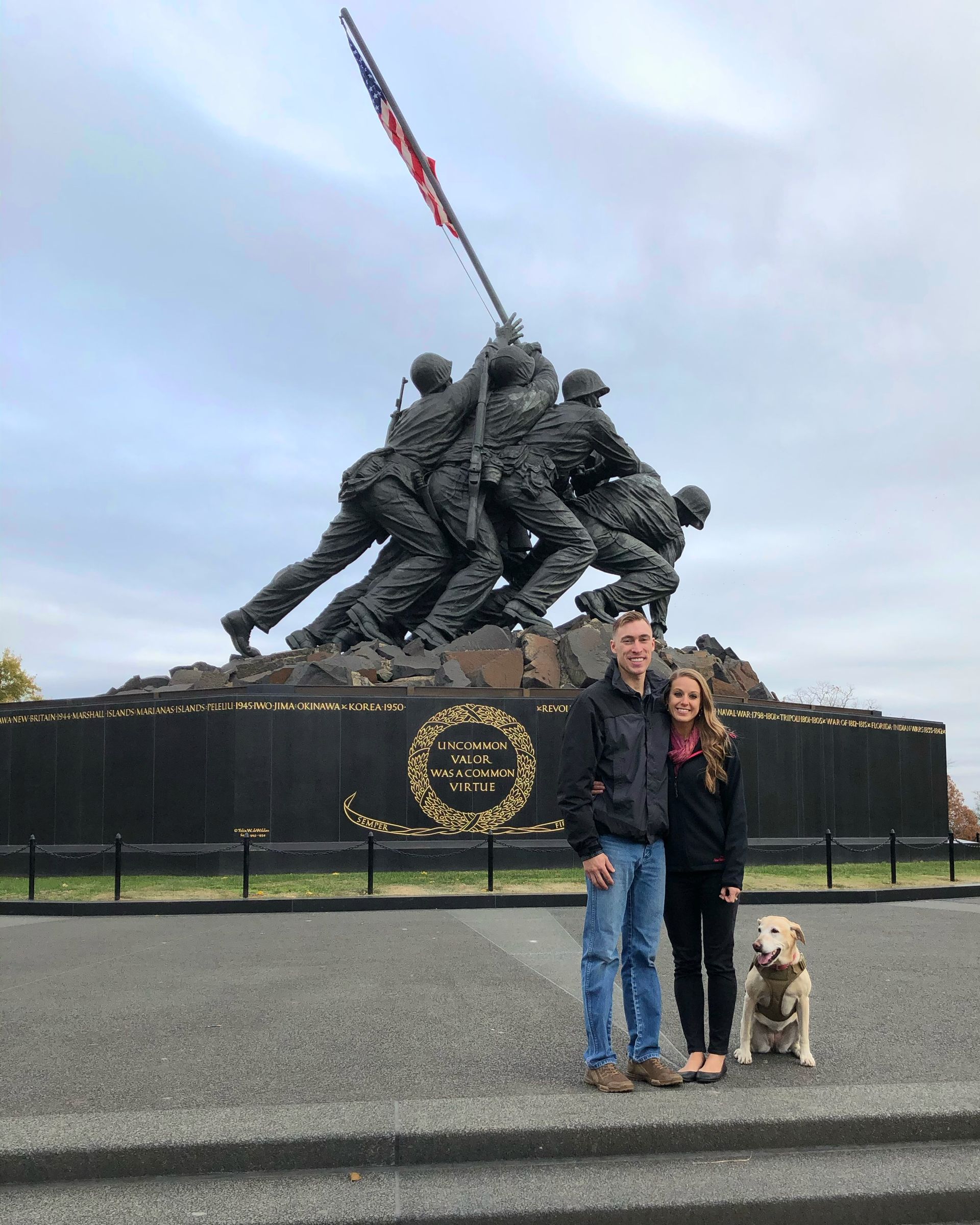
Even in retirement, Belle continued a life of patriotic service. She traveled to Washington, D.C., in July 2019 to meet Congressman Chris Stewart and advocate for a bill dedicated to bringing War Dogs home. Belle also had a remarkable ability to find those with military ties. Whether a veteran, active-duty, or military family member, Belle gravitated toward them, showing up with quiet reassurance and a steady presence.
Belle’s family life was a dream come true filled with mountain adventures, long nature walks, and endless splashes in her pool. Nothing made her happier than swimming every day. In February 2020, Belle joined the US War Dogs’ RX prescription program for joint medication. This care helped Belle continue to enjoy the endurance exercises she loved the most.
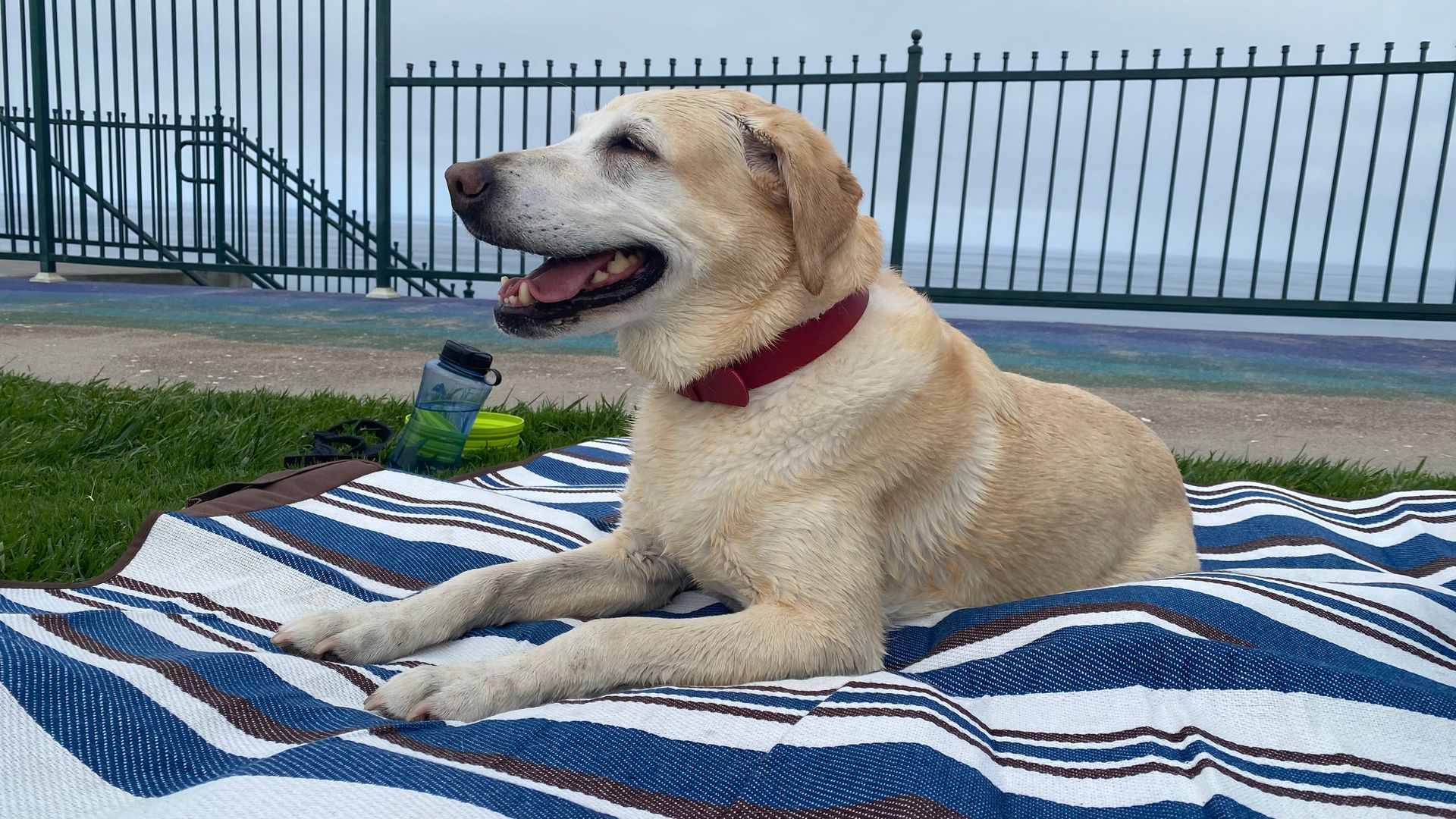
This February, Belle had an abnormal growth show up on her stomach that turned out to be a high-grade mast cell tumor that had to be surgically removed. Based on the location, this prompted an abdominal ultrasound where more cancer was found on her liver and spleen. Due to the severity, the vet determined that pain management and loving care at home would be the best course of action for the 14-year-old dog.
Belle’s final moments were peaceful, filled with dignity and love, thanks to a compassionate organization called Laps of Love that offers an in-home euthanazia service. Belle was able to pass away cradled in Sam’s lap. The vet honored every part of the process, never rushing, and treated her body with tenderness as she gently wrapped her in her comfort blanket and transported her for cremation.
In Memoriam Pet Services showed the same level of care. They created beautiful keepsakes for them, ink paw prints and a clay impression, so they could always have a piece of Belle with them.
“We appreciated the support from US War Dogs, especially from Aaron Stice,” said Susan. “He personally called before and after Belle’s passing, taking his time not just to check in, but to be there with us to talk through what we were facing. In those difficult moments, his presence was pivotal. He also helped coordinate all the final medical refunds promptly and without hassle. We are grateful to be part of a community that does not let MWD families like ours go through this alone. And most importantly, Belle was honored in the way she deserved.”
Our team is sending our love and prayers to the family, and we honor the legacy of a dog who has given so much.
US War Dogs – Here for MWDs like EEnoch
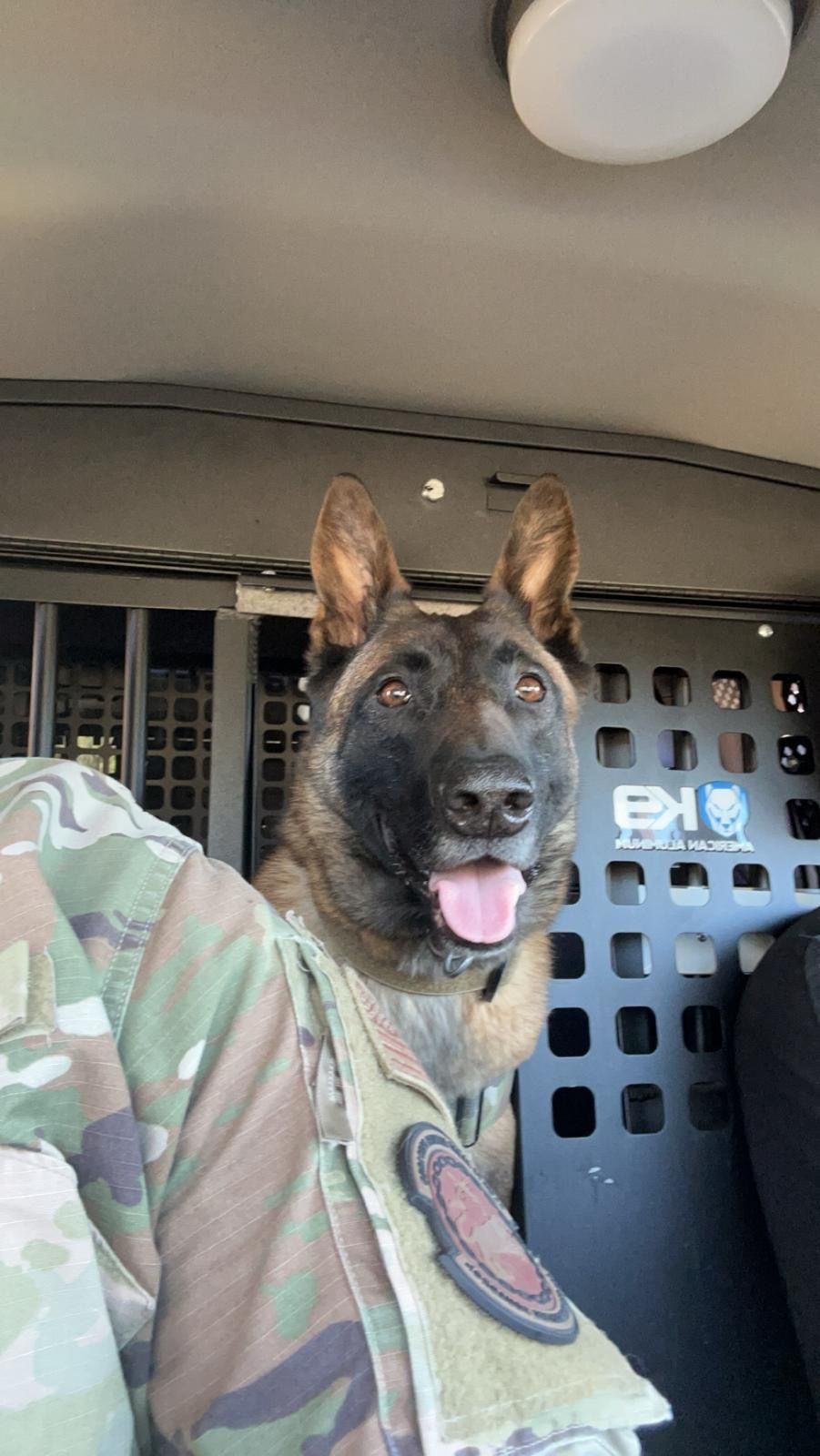
Air Force PEDD EEnoch always loved to work, but when a routine check uncovered a grade three heart murmur, his handler Patrick quickly stepped up to offer him a forever home. “I first met EEnoch when we were both deployed to Kuwait in 2022. He was with another handler but we bonded and when I returned to the States later that year, our paths crossed again.
“While we were both stationed out of Seymour-Johnson AFB, NC, we were paired together and it was great. But as we entered pre-deployment training for our next overseas tour, the vets found EEnoch’s heart murmur and everything changed.”
With EEnoch’s condition confirmed, vets asked Patrick about his general health and wellness. “They couldn’t believe he hadn’t shown any signs of struggle or discomfort with a murmur that severe. He absolutely loved to work and was a total beast on any task he was put on, so he really had masked it so well.”
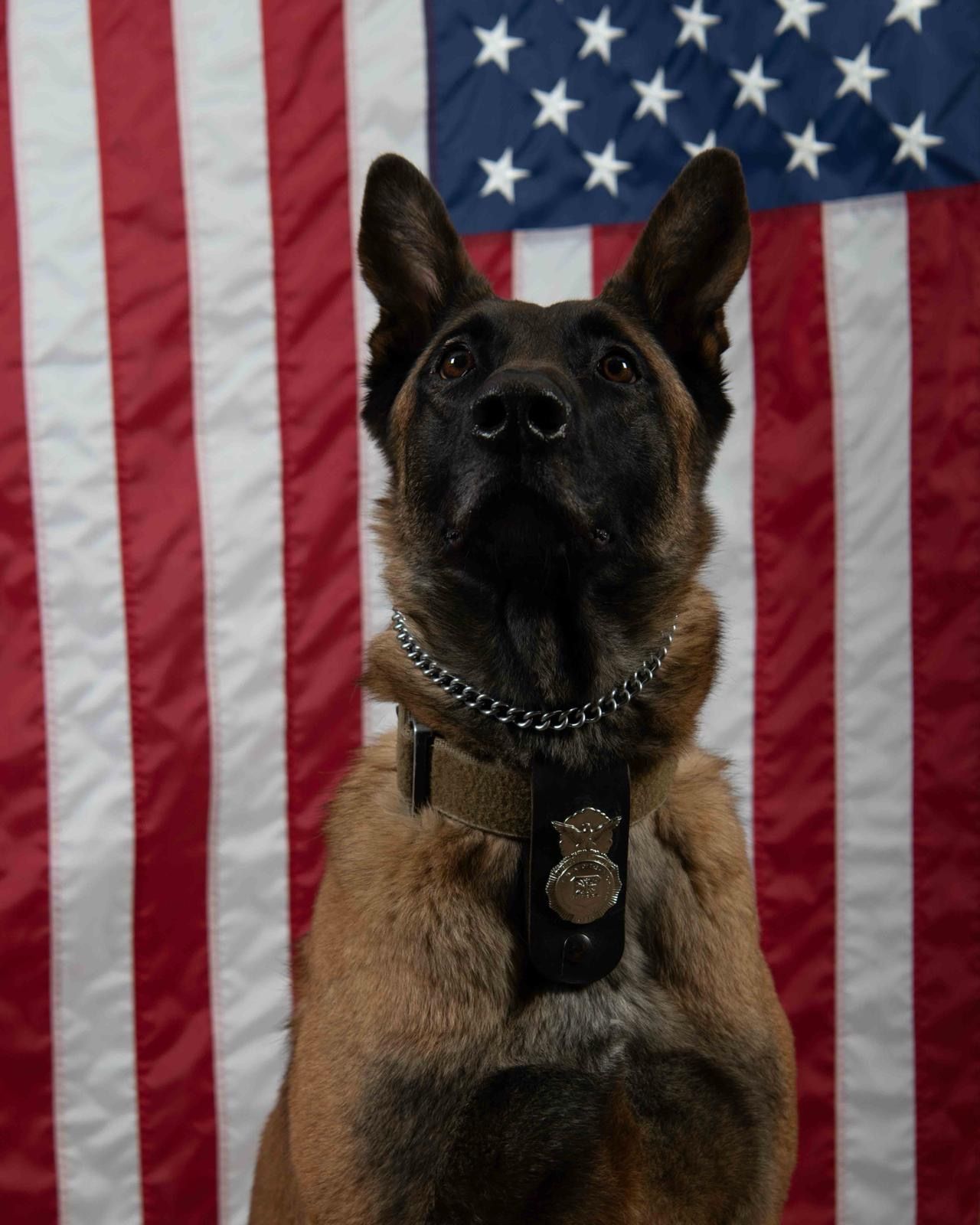
EEnoch served as a patrol and explosive detector dog with the US Air Force
A Slower Pace
At just six years old, EEnoch’s career in the Air Force had come to an end, but thanks to Patrick, he had the perfect home to call his own. “He took to the retired life straight away. He literally walked into our house and he and my husky became best friends. They own the place and sleep in the same bed – even though they have a bed each.
“EEnoch still loves to work so I regularly do obedience drills with him. He hasn’t lost any of his spunk, despite being a man of leisure now.”
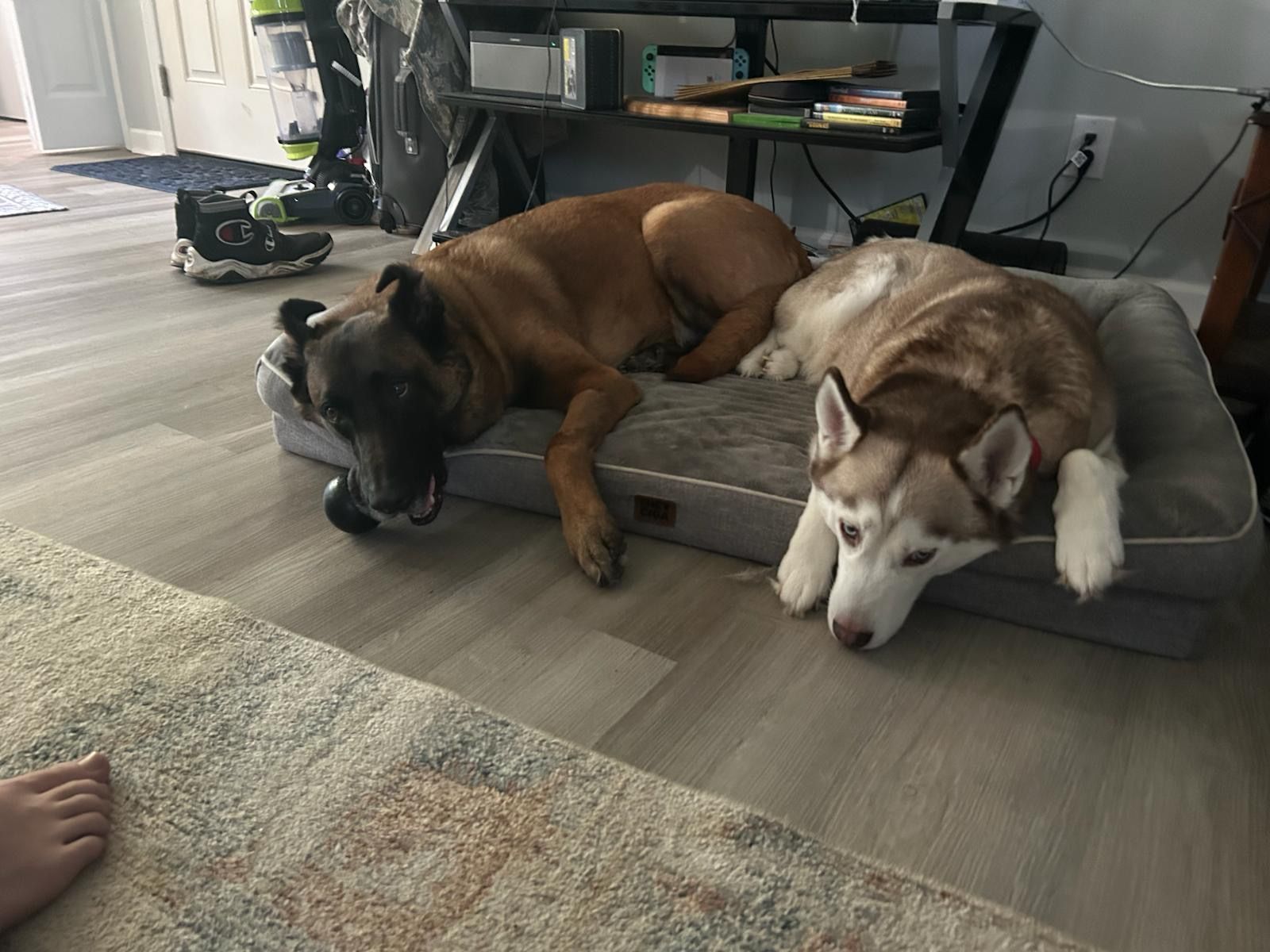
EEnoch and his husky sister, Akita
Yelp
EEnoch’s retirement was going swimmingly and his love for Patrick manifested in following him around the house constantly. One morning though, he didn’t move off the bed to follow Patrick out for breakfast, which was unusual. “I came back into the bedroom to see if he was ok and as he moved off the bed, he gave a horrid yelp of pain, then stood with his paw lifted off the ground.”
Patrick made an appointment with their vet, who took x-rays of EEnoch’s leg. “They called me at work and said they had found something in his bone – likely cancer. I am still on active duty with K-9 so to be in the kennels, surrounded by dogs, hearing this news… it hit me hard.
“I went to collect EEnoch and chat through his options. They confirmed it was a sarcoma and that the best option would be to amputate the leg and follow up with a course of chemotherapy. I honestly couldn’t believe it, but we were prepared to do whatever it took to save our boy.”
EEnoch was scheduled for surgery and his whole front right leg and shoulder was removed. Patrick said: “It was a shock to see him at first, but he got straight up and carried on as if nothing had happened – it was amazing to see.”
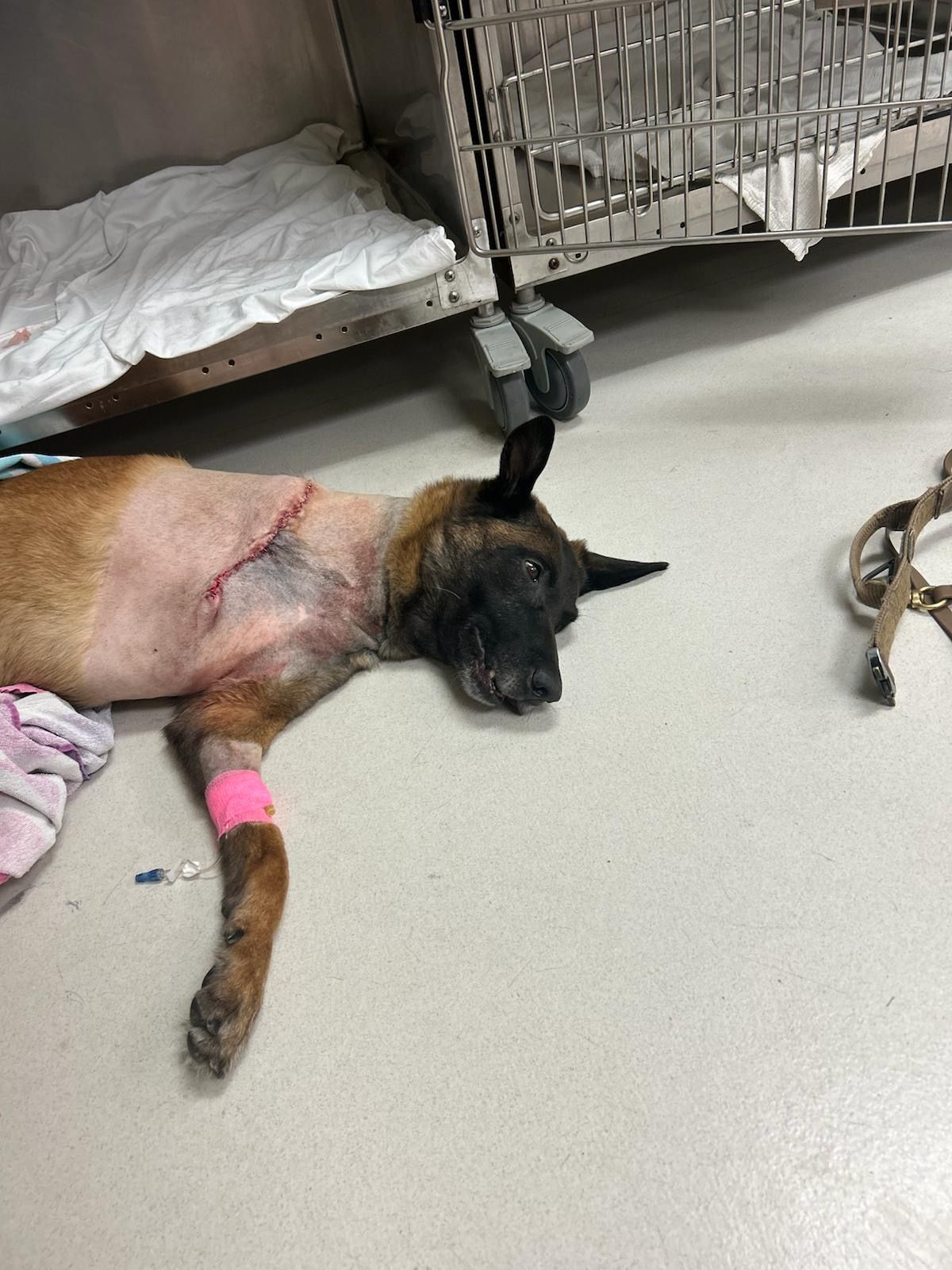
EEnoch’s cancer required radical treatment
Healing
EEnoch has adjusted really well to his new life with three legs and despite having more chemo ahead of him, he is back to his old self: “Although the chemo part of his treatment worried me, the vet staff assured me that it would really help him and wouldn’t be too invasive for him. They were right. It’s a ten-minute injection and he hasn’t had any ill effects from it so far. He actually loves going down to get the shots as the vet team treat him like a total prince.”
War Dogs Support
Although Patrick had heard of War Dogs, he had decided not to sign EEnoch up at first. “I didn’t want to take help that we didn’t need and I was happy to cover the cost of his regular meds, but when the vet talked through the surgery and related costs, one of the nurses mentioned War Dogs and said that they might be able to help us, so I called them.
“Nothing was too much trouble and War Dogs said that they would cover all costs relating to EEnoch’s surgery and chemo. So far, his bills have reached $4,500, but with five more chemo shots at $800 each, the total number will be more like $10,000.
“We couldn’t be more grateful to War Dogs for their support – to take that financial stress away and let us focus on EEnoch’s recovery has been a real gift.”

Wishing EEnoch a speedy recovery
MWD Orca the Defender
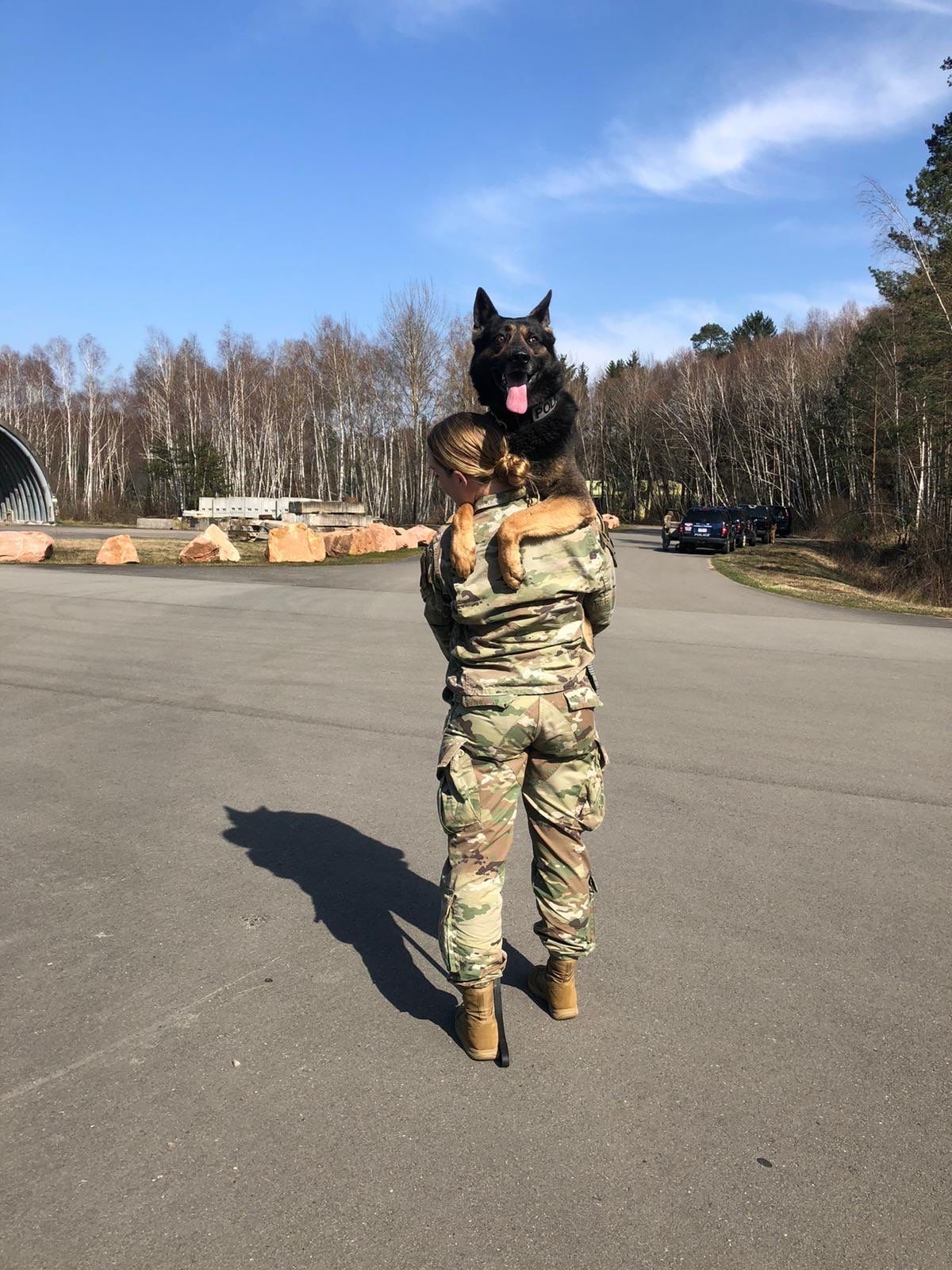
US Air Force patrol and explosive detection dog (PEDD) Orca, suffered his fair share of health troubles during his career. At just four-years-old, Orca needed spinal surgery which required a slow and steady recovery. It was around this time in 2019 that he was paired with a new handler in Ramstein, Germany and in a departure from the classic start of a dog/handler relationship, Orca’s recovery dictated a slower pace from the traditional training package.
The dog team started their days with daily walks and getting to know each other but in spite of his health troubles, Orca’s stubborn, toy-loving personality shone through: “Orca did not want to let go of his toys, in true German Shepherd fashion”, his handler – who wishes to remain anonymous – explains. “Over the next few months, I had to learn some creative ways to teach Orca to ‘let go’.”
Game On
Once Orca was cleared for work and the dog team had passed certification, it was game on. As security forces members, the dog team’s number one mission was to defend their base in Germany, and they did just that. As part of their role, they were also called up to support multiple Secret Service missions, travelling to Prague, Paris, Belgium and Kyiv: All during the eerie quiet of the COVID pandemic.
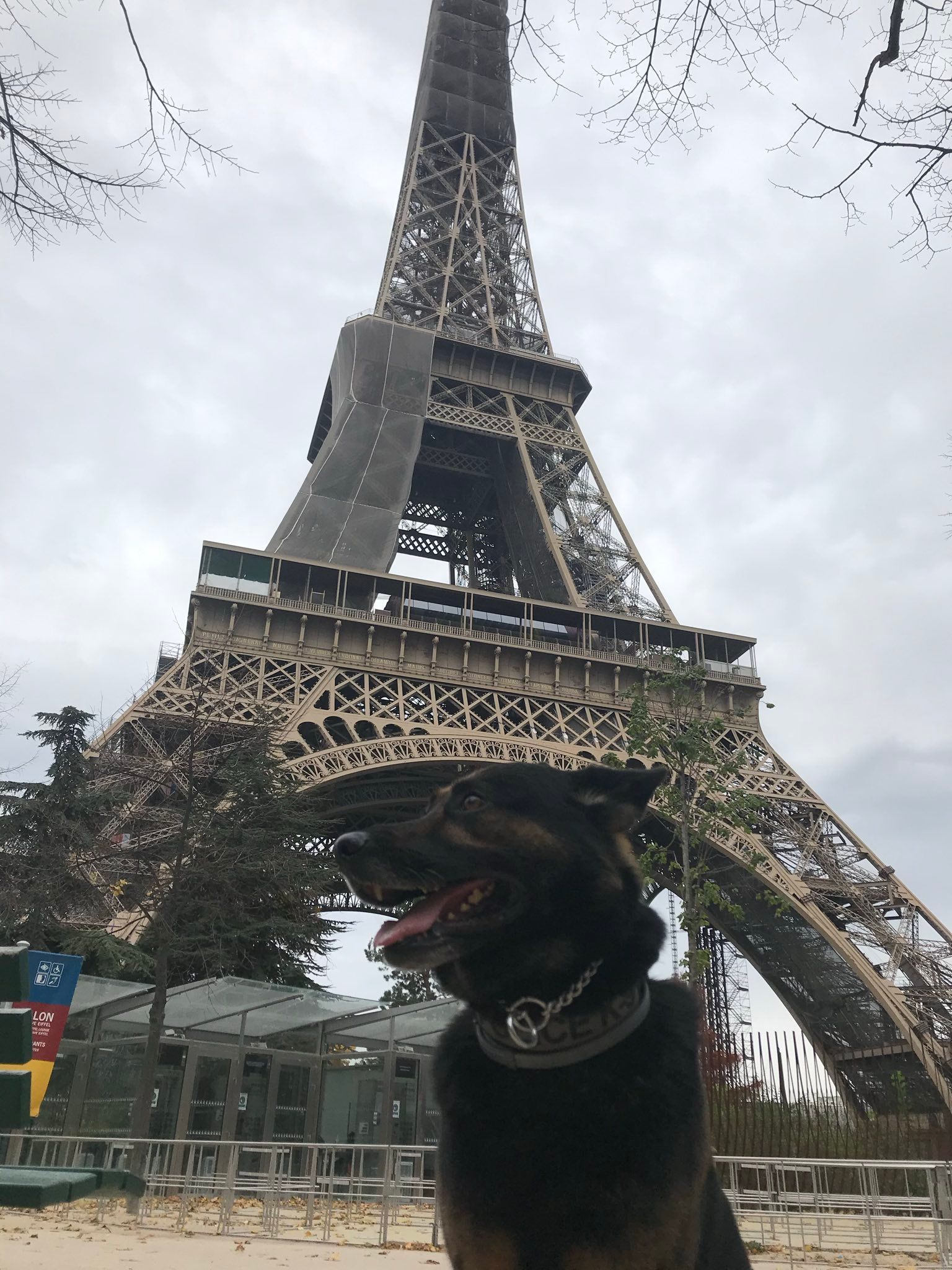
Travelling the world: Orca served in locations across Europe, during his career with the US Air Force
From sharing Belgian waffles to making protective sweeps of Air Force One, they kept many people safe and made just as many memories. “It was an incredible time. We were serving our country and keeping people safe together. In one notable mission, we had to answer a middle-of-the-night call to help find a fugitive airman who had jumped from a second story window. There was never a dull moment overseas.
“My favorite part of these missions was always ending the day with Orca, snuggled up in my bed.”
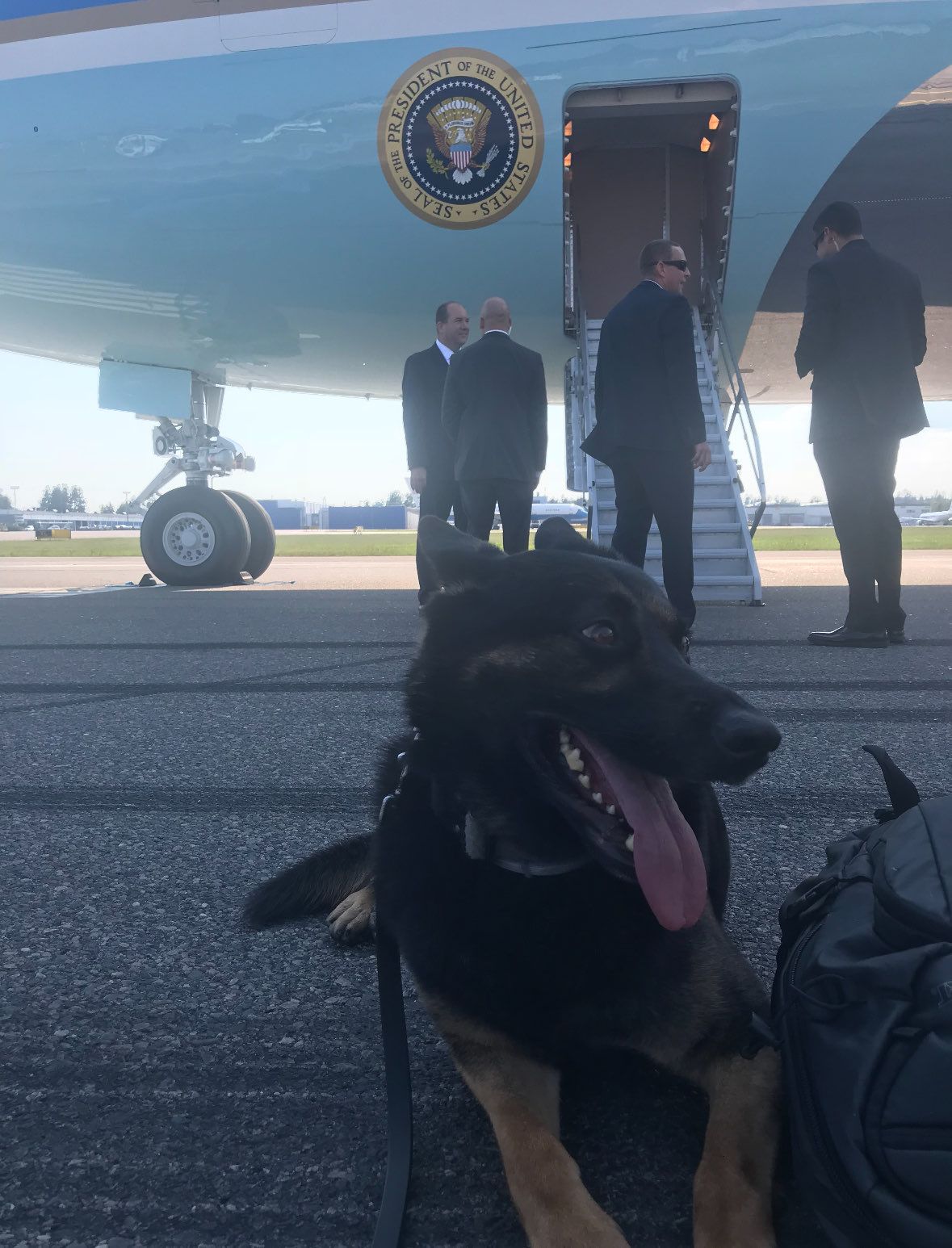
Serve and protect: Orca after a sweep of Air Force One
Changes
After two action-packed years together, it was time for Orca’s handler to transition away from Germany, but as their time together came to an end, she noticed signs of pain in Orca. “At this point, I knew him better than I knew myself, and advocated diligently for him to get medical help.”
At six years old, Orca had a second surgery on his back and hips and after a period of recuperation, he became a single purpose K-9. A few months later in 2023, Orca was medically retired and after spending his entire life defending our country, he now had the opportunity to experience a true home life.
“When I heard Orca was retiring, I knew I had to give him the retirement he deserved”, explained his former handler, who was now back on home soil after leaving Orca in Germany. It wasn’t going to be plain sailing, though. “Initially, Orca was recommended as an ‘only dog’ household, and with my dog Cally already at home with me, I knew I had to try them out together. After almost a year of patience and slow introductions, Orca and Cally are now happily sharing my home together. It was a huge achievement for him!”
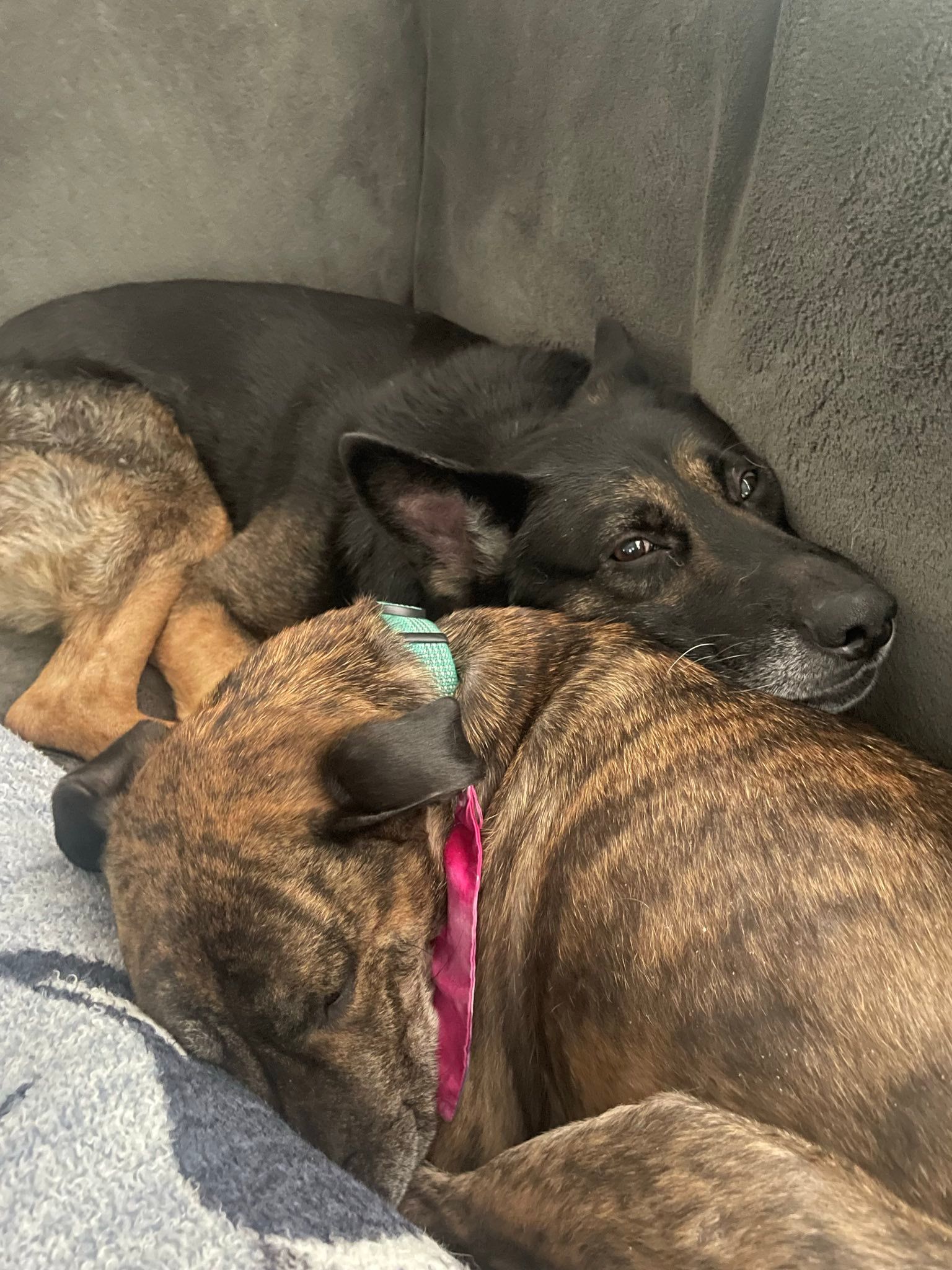
Orca and his doggy roommate, Cally
Life-Saving Support
While Orca was adjusting to life as a pet – with a newfound love of stuffed animals and an ever-increasing tolerance for his doggy sister, Cally, life seemed sweet. But in November, 2024, his former handler and adoptive mom noticed a mass on Orca’s hind leg.
“Our vet diagnosed him with malignant melanoma and said that Orca’s outlook was pretty bleak. In a classic right place/ right time scenario, though, I found that we live 15 minutes from one of the top specialists in the United States for this particular disease, so we made an appointment to see him.”
The specialist recommended a melanoma vaccine that could give Orca more time to enjoy his retirement. The only downside to this amazing antidote was the cost.
A course of shots would be needed every two weeks for two months, with six-monthly boosters thereafter. This groundbreaking treatment is $1,000 per shot: A huge amount of money for anyone, not least a serving military member.
Orca’s worried owner had already reached out to US War Dogs prior to their appointment with the specialist but when she called with the verdict, the news was more than positive: “The guys at US War Dogs assured me and Orca that his care would be covered, indefinitely. It was a such an incredible sense of relief to know that my boy could access the care he needed to give him as long as possible to enjoy his retirement.”
Orca received his first vaccine in February 2025 and has been responding well to the treatment, with no negative side effects so far.
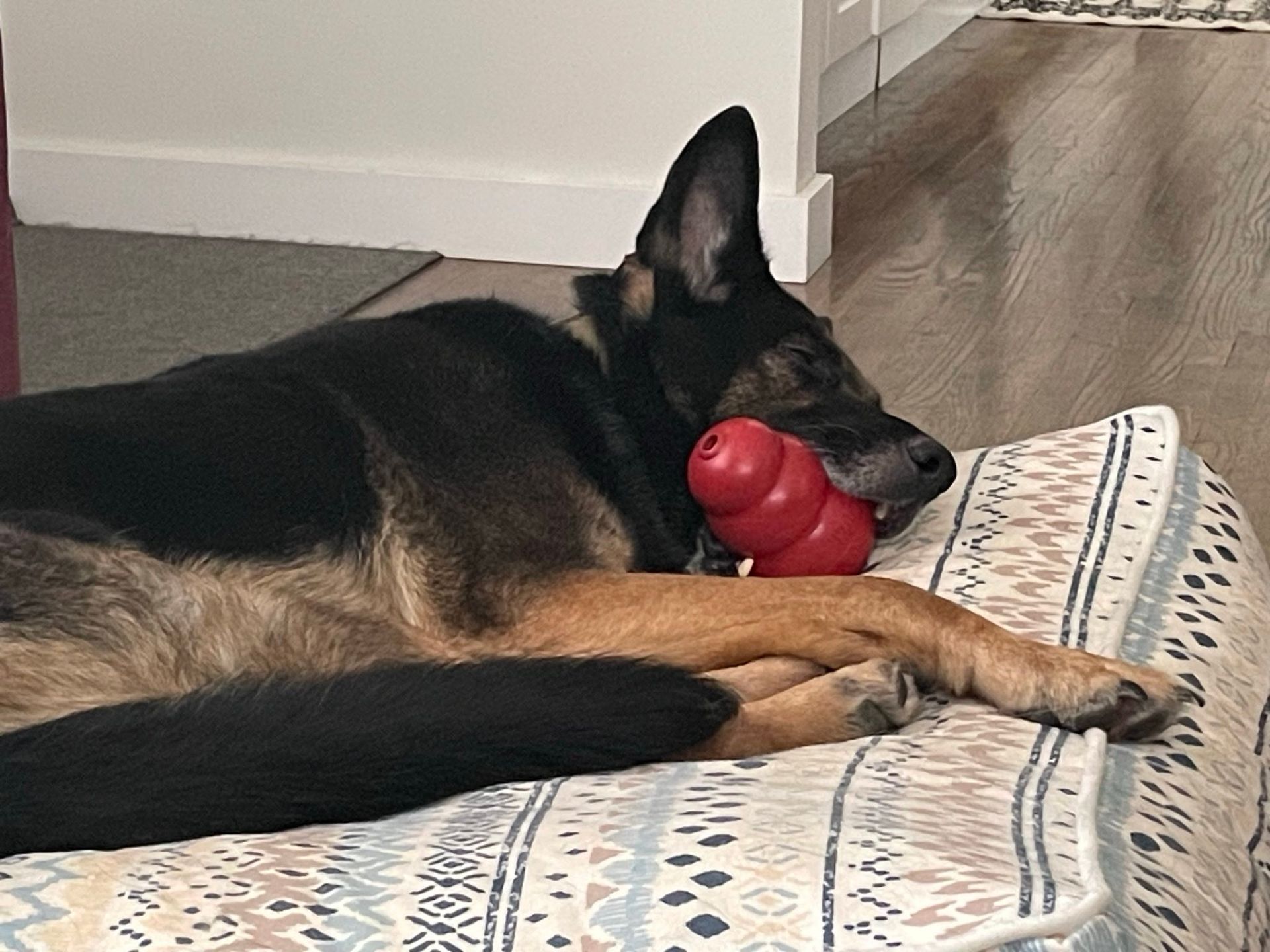
Orca enjoying a slower pace of life at home
“I am so filled with gratitude for this organization and what they do for our retired K-9 heroes. They are enabling me to keep my promise to be Orca’s protector and defender, just as he served as a defender to our nation, his whole career. After all, our military working dogs are defenders too!”
US War Dogs president, Chris Willingham, commented: “We are honored to be there for Orca and his family. His story is a great reminder of exactly why we exist – to alleviate the financial burden of caring for retired MWDs and ensuring they enjoy a happy, healthy retirement.
“Our whole team is rooting for Orca as he continues with his treatment and we hope his family can rest easy in the knowledge that we have got their backs, for as long as they need us.”
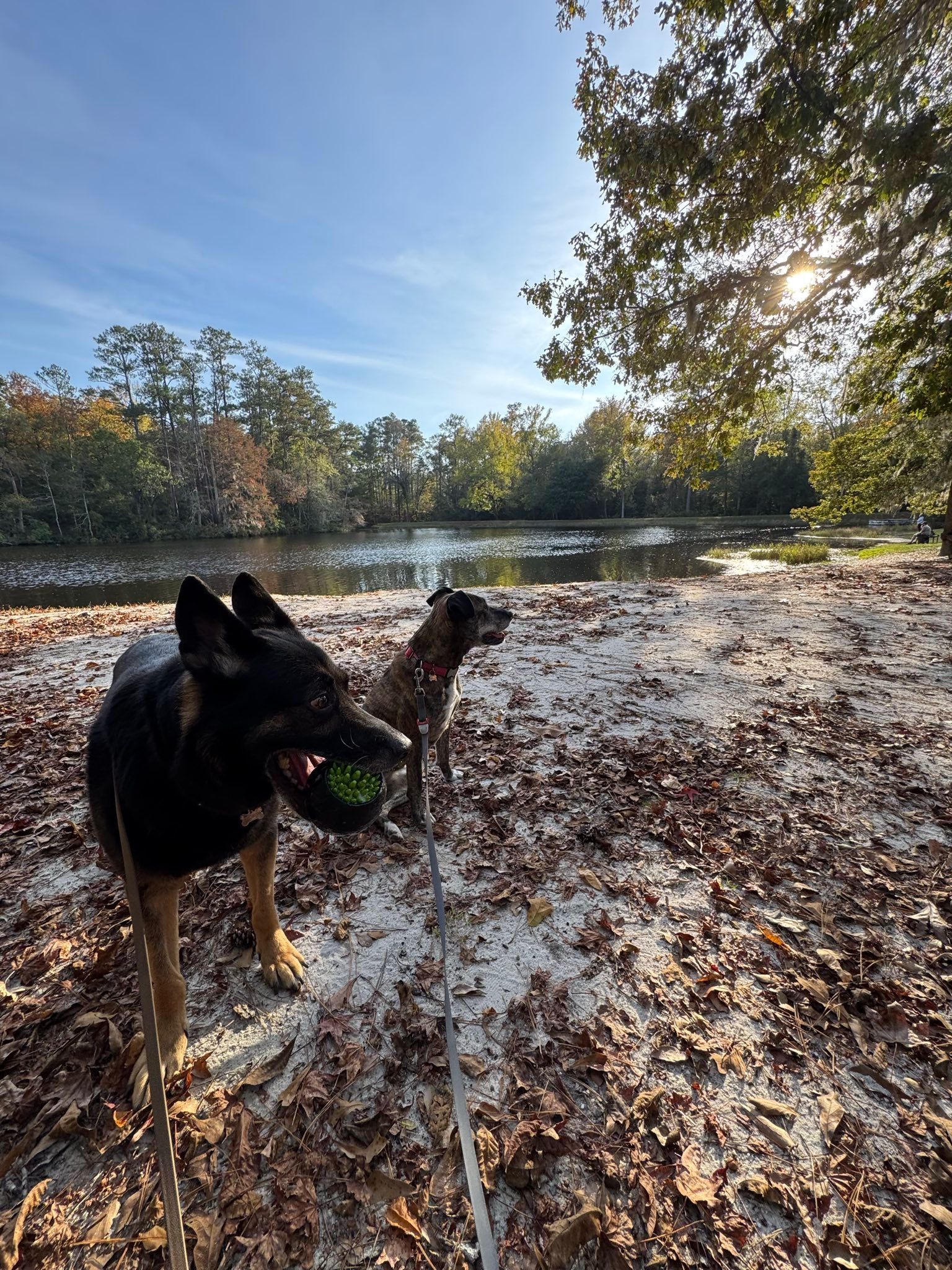
US War Dogs is honored to support Orca and his family
Rex is Alright, Thanks to US War Dogs
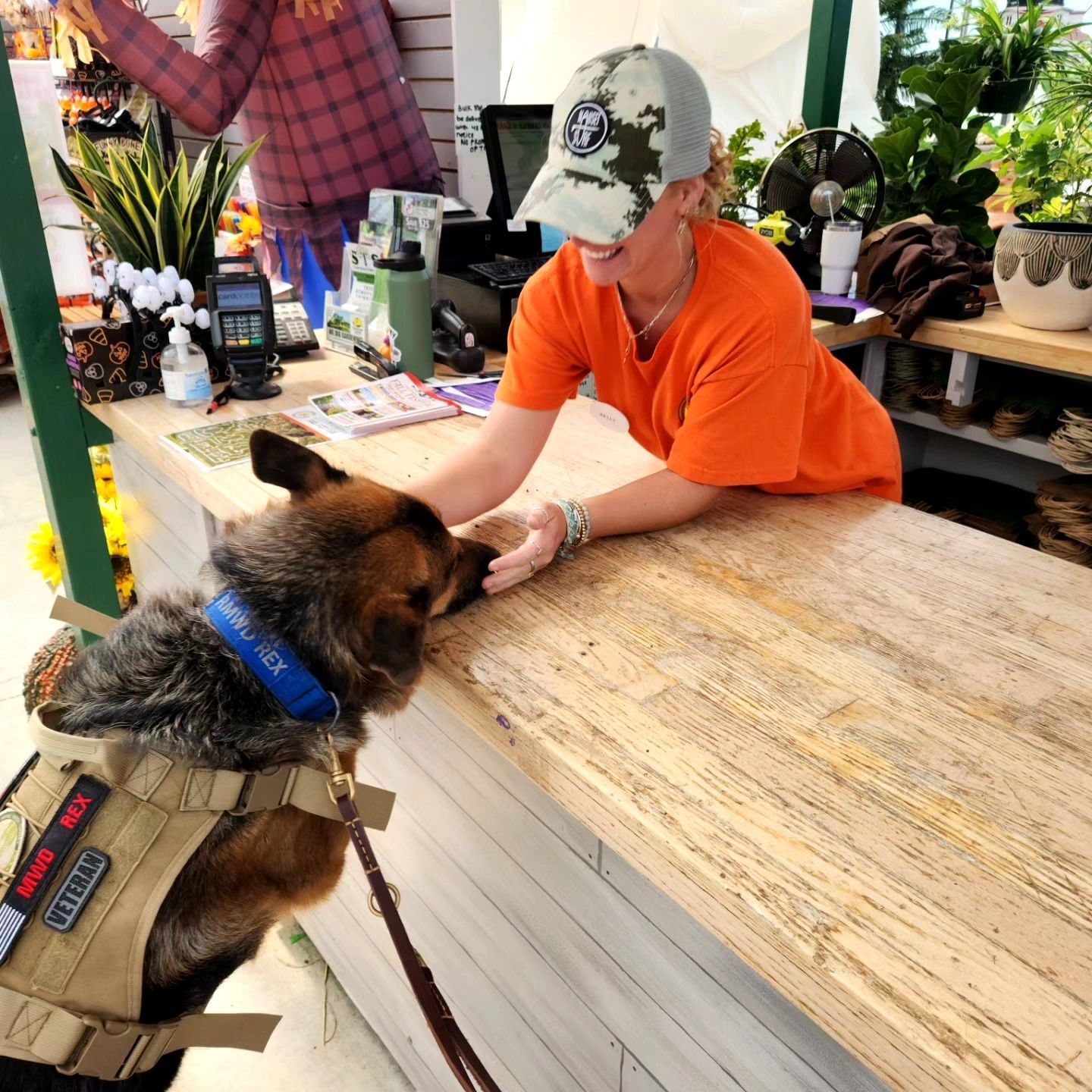
Rex loves making new friends and flying the flag for MWDs during his retirement
Rex has spent his whole life in the military. Following his purchase from Belgium, Rex had a glittering career as a trainer dog at Lackland Air Force Base, before retiring in 2022, to live with Crystal and her family in Maryland.
Crystal explained: “My husband and I both come from military families and our son is in the Army. We had our eyes opened to the role of MWDs – and the fact that they receive no financial support from the military when they retire – we were determined to adopt one.
“After one failed adoption, we signed up to Lackland’s adoptions Facebook page, which is where we first saw Rex. He had these beautiful yellow eyes. I reached out and explained our situation and the team said we could take him home if we could collect him, which we absolutely did!”
As a seasoned professional, Rex had only known kennel life at Lackland, so when he moved into his retirement home, he had some new experiences to overcome. “It took him quite a while to get used to being in a house and having a soft bed to sleep on. He will come and lay in the bed with us now too, which shows how at home he feels.
“Rex had also never been around children, so my daughter, who was seven at the time, was a complete enigma. Of course, they are the best of friends now!”
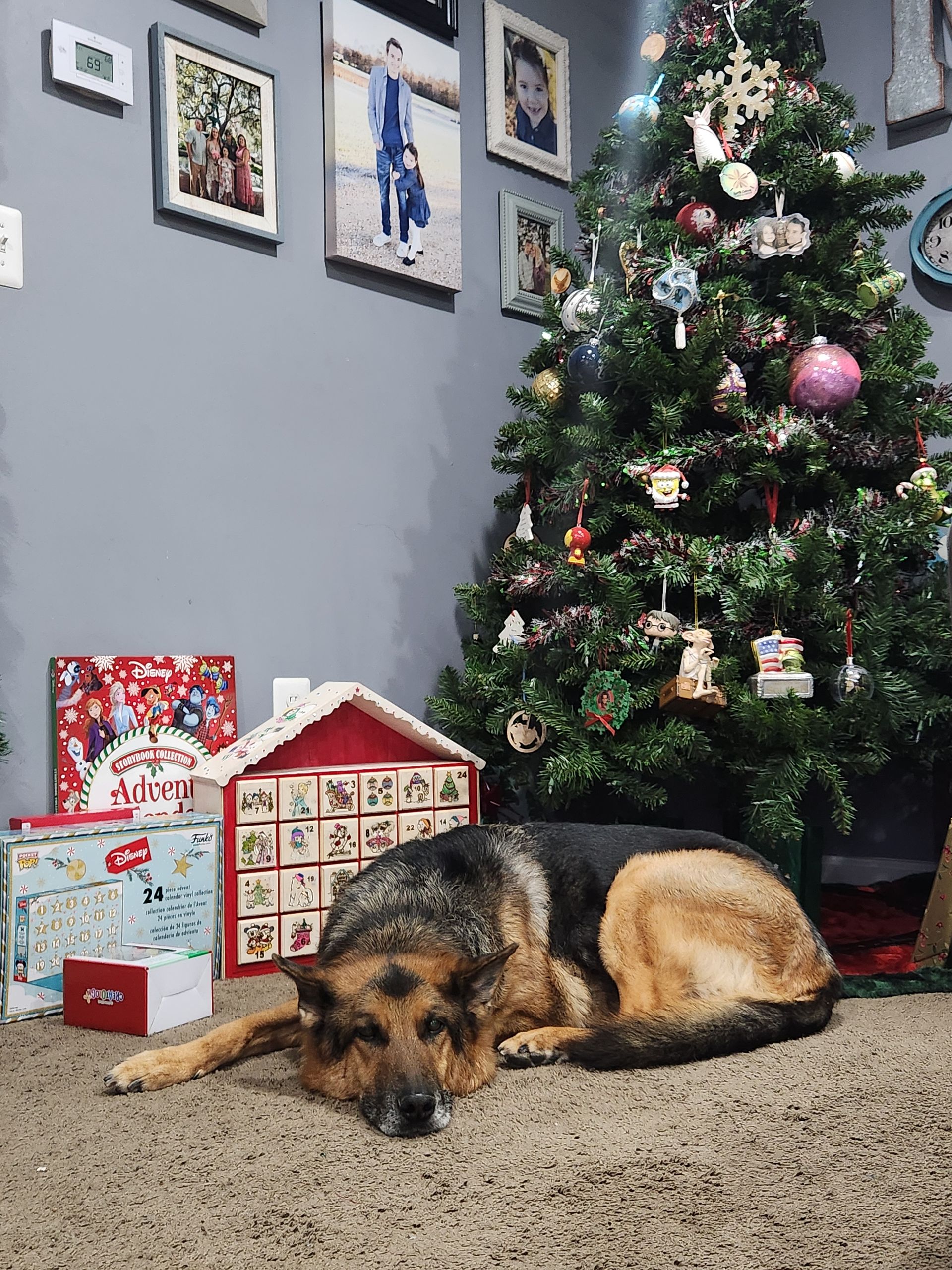
Rex is right at home with his adopted family
Health Issues
When Crystal collected Rex, the kennel manager gave her and her husband the full rundown of Rex’s health. “Gerry, the kennel manager, explained that Rex was on regular medication for his hips and a couple of other things and that US War Dogs was on hand to support the dogs who have given their best years in military service. He said to enrol Rex in the Rx Program to help cover the cost of his medical needs.
“We applied to War Dogs a couple of months after Rex came home. We tell everyone about Rex and that MWDs don’t get the same military benefits that their human counterparts do. For some people, they are paying out of their pocket for complex health conditions that the dogs may have picked up as a result of their busy careers of service.
“Every month when we get Rex’s meds, we are so grateful.”
Always There
With Rex covered under US War Dogs’ Rx Program, Crystal and her family were able to enjoy spoiling him in his well-deserved retirement without worrying about the spiralling cost of medications. But when Rex started feeling under the weather, Crystal would learn the lengths that US War Dogs would go to, to take care our nation’s retired K-9 heroes.
“Rex is incredibly food motivated”, Crystal explained, “He never has an issue with eating but one weekend, my husband noticed that Rex was off his food. As the weekend progressed, Rex started throwing up and became very lethargic. We tempted him with some of his favourite treats: Bacon and chicken, but nothing worked.”
Crystal decided to send an email to US War Dogs to say that Rex might well need a visit to the vet if he wasn’t better by Monday morning. “I got an email back from Chris – the president of US War Dogs – within the hour. He said to do whatever Rex needed and that War Dogs would cover the cost. It was such a huge relief.”
After an early morning call following a bad weekend, Crystal got Rex an appointment. The vet had never seen Rex before but he could tell that something was off. The vet took some x-rays which showed that Rex had gas bubbles in his stomach. “Because he is older, they wanted to give him IV fluids and meds. The staff told that usually, they see a complete 180 after a couple of hours on the IV, but it wasn’t taking effect.”
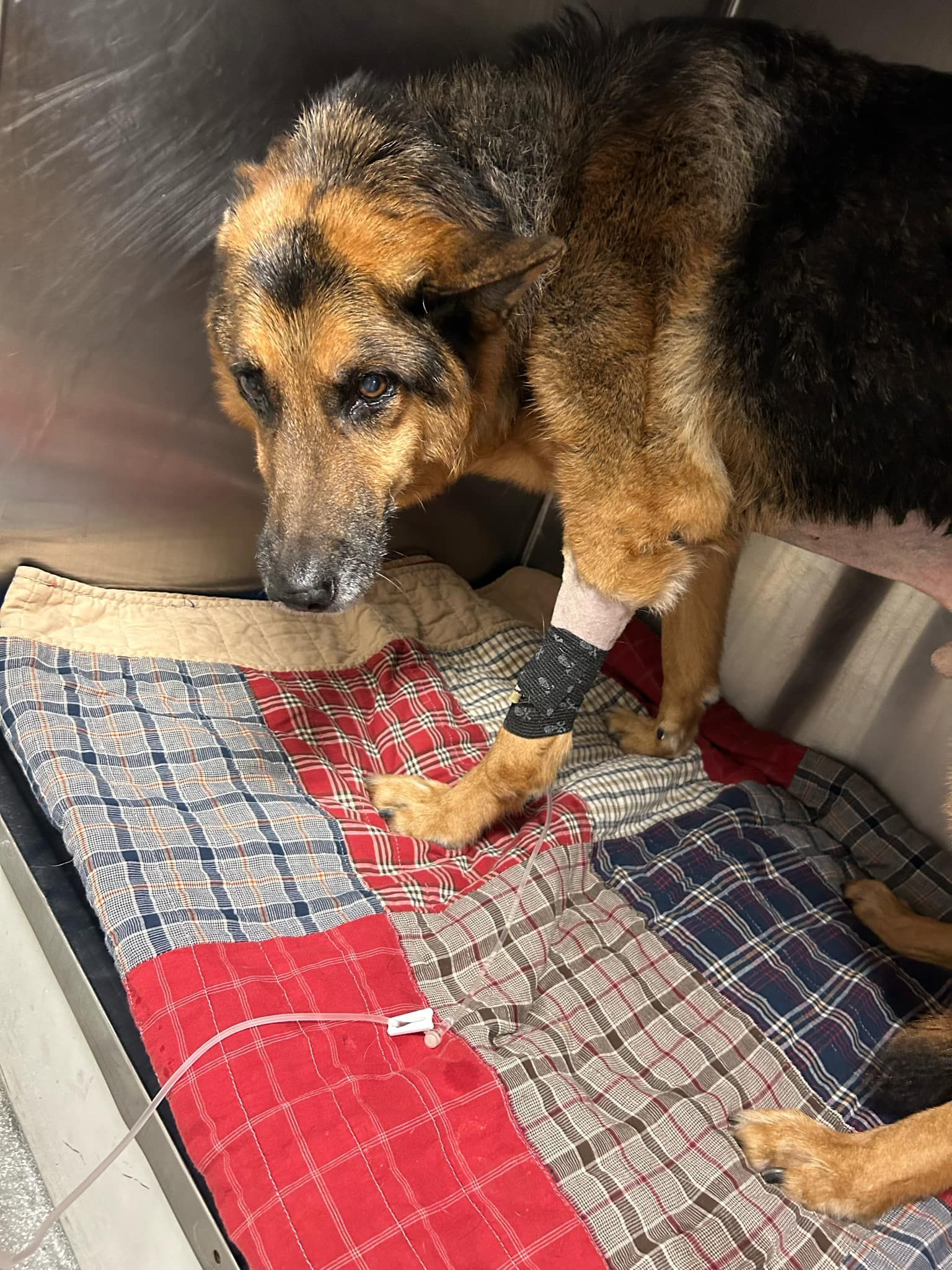
The vets put Rex on a drip to try to help him feel better
Rex’s condition worsened overnight and the vets called Crystal to say they thought he had a blockage. “They wanted to do an exploratory surgery which, they said, would be a couple of thousand dollars, plus meds and an extended hospital stay.”
The vet who performed the surgery found a small blockage – a rock or acorn – inside Rex’s small intestine. Crystal said: “The vets said that they were loathed to cut him to prevent complications and infection so they worked it into his large intestine and said he would pass it naturally from there. Whatever they did, he picked up his appetite again and once they had checked he was going to the bathroom, Rex was able to come home.
“The whole time, I kept him in constant touch with Chris. Nothing was too much trouble and he genuinely cared about what was happening with Rex. It was a huge relief to have US War Dogs on our side. We would have paid whatever was needed for Rex, of course, but US War Dogs covered the whole cost of Rex’s treatment which was over $3,000.”
Rex’s Recovery
Now Rex is home and recovering well, it has given time for Crystal to reflect on the impact of the worry and stress his illness caused the family. “It really was a state of emotional turmoil while Rex was sick. My little girl was so worried about him. We were so lucky that one of our friends from church worked in the vets and she sent us constant pictures and updates, which really helped my daughter.
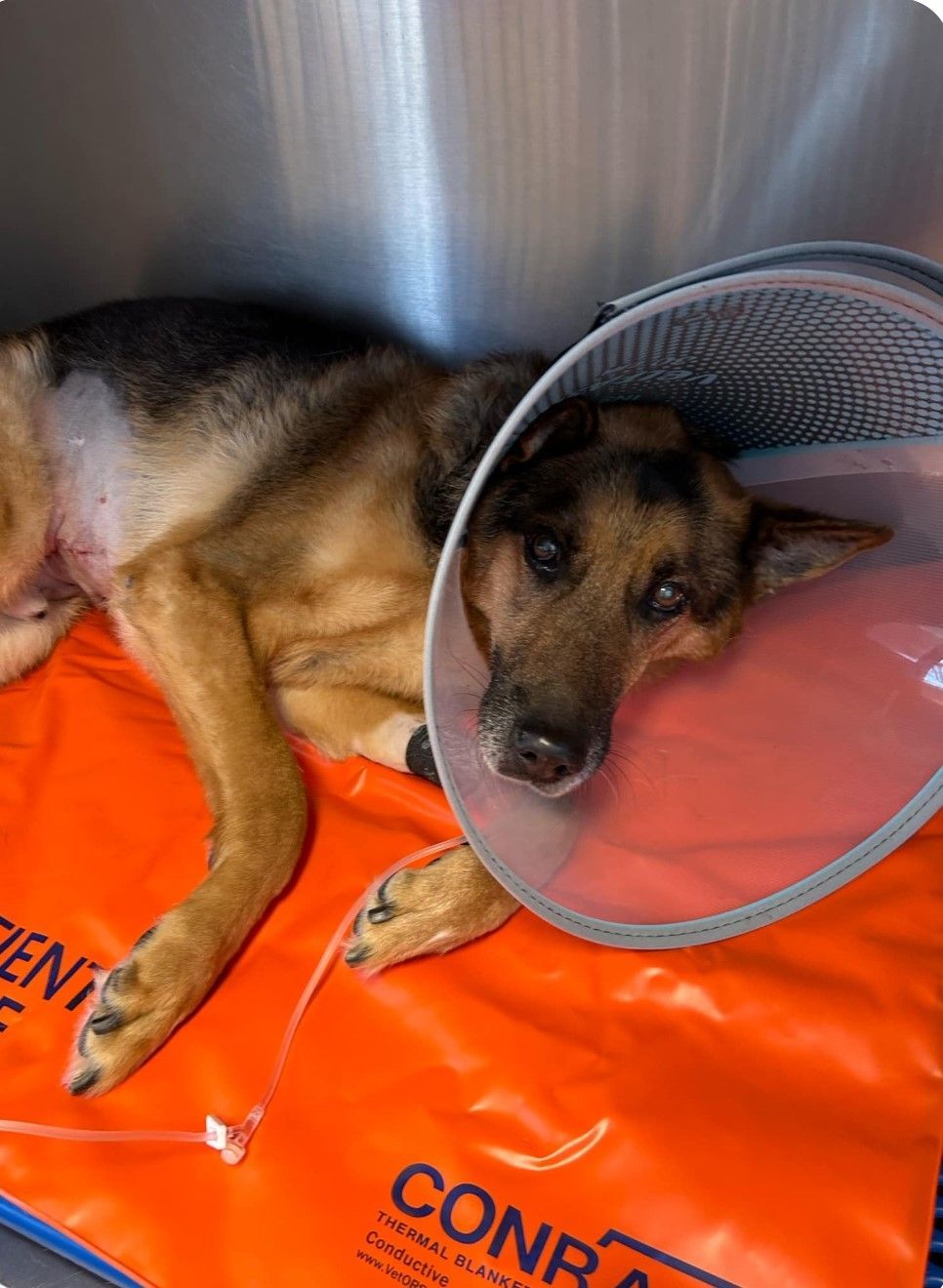
Crystal and her family were worried sick about Rex as he recovered from his surgery
“At least your kids can tell you what’s wrong, but you don’t have that with a dog. The uncertainty is very stressful but he has pulled through and we are so happy to have him home.”
Crystal recalls that although Rex bounced back quickly post surgery, he struggled with some aspects of his recuperation: “He was not a fan of the cone so we got him a surgery shirt, which he tolerated a little more.
“It is so lovely to see Rex feeling mote like his normal self. He fights with the cat over who gets to lay under the Christmas tree – he thinks the Christmas tree skirt is his second bed.”
Honoring Out K-9 Veterans
After learning about MWDs and their contribution to our nation’s military, Crystal and her family do whatever they can to raise awareness of their service and sacrifice. “Rex has become quite the celebrity around here. We take him to the Bullrushes café where they serve free breakfasts to veterans on Tuesdays. Rex loves having his bacon from there and enjoys plenty of love from his fellow two-legged veterans.
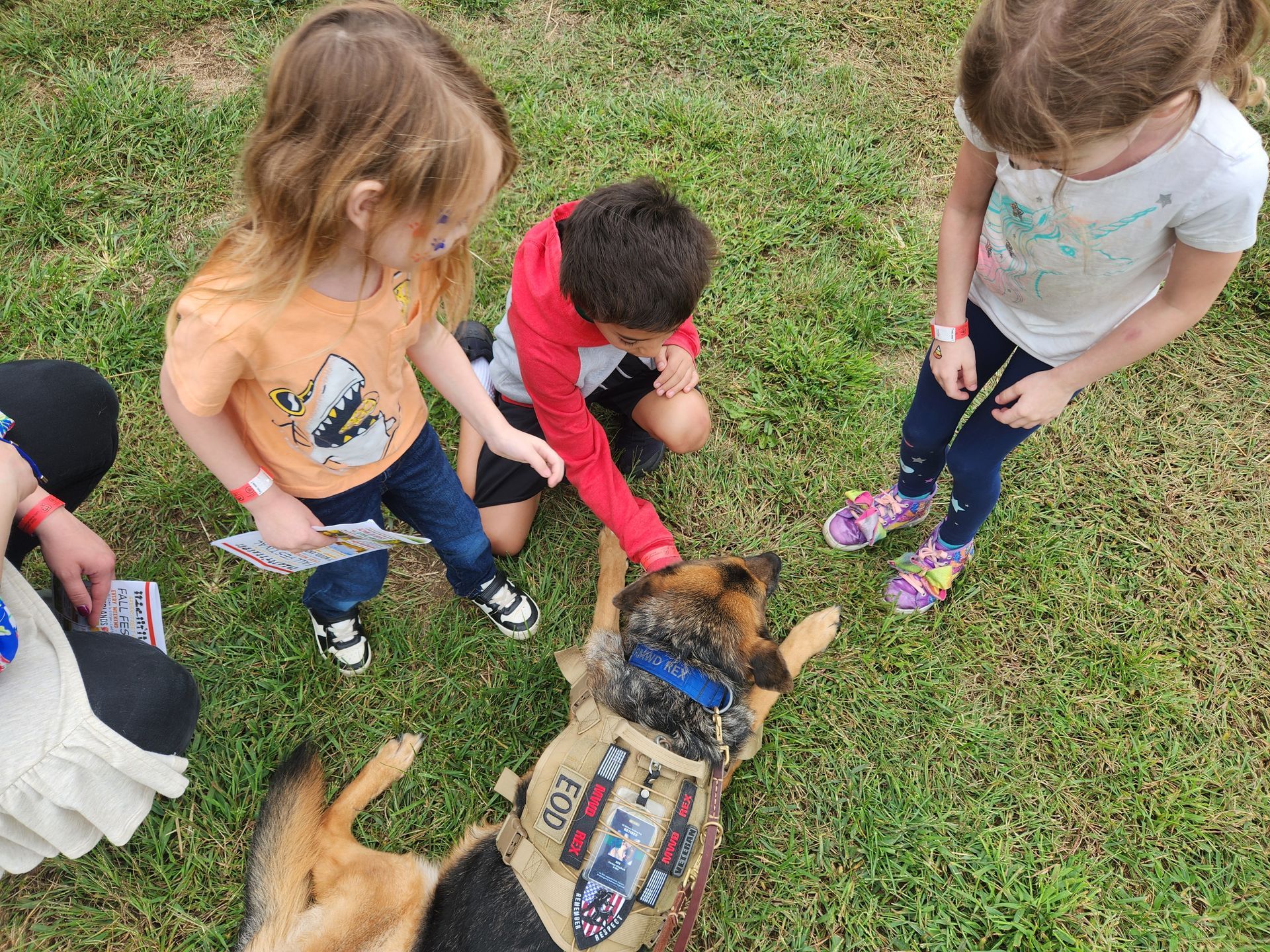
Rex meeting some of his fans
“Rex has also been out to greet the honor flights that bring Gold Star Families in to visit Arlington National Cemetery. Rex goes to the Home Town Heroes weekends at Greenstreet Gardens to meet the public; enjoy the corn maze and hang out with the goats while I tell everyone how amazing he is and how US War Dogs takes care of him and other MWDs.
“We set up an Instagram account to chart Rex’s retirement and help to raise awareness of what these dogs do for us. That includes the work of organizations like US War Dogs, whose support is a true blessing.”
Follow Rex on Instagram to follow his adventures in retirement.
Marine Corps K-9 Gunner Granted Second Chance, Thanks to US War Dogs
Retired multi-purpose canine (MPC) Gunner was a legend with everyone he worked with. Having racked up four deployments, he became a firm favourite with the teams he served with, thanks to his sweet, sociable nature. So, when the time came for Gunner to retire, there was a long list of people who wanted to take him home.
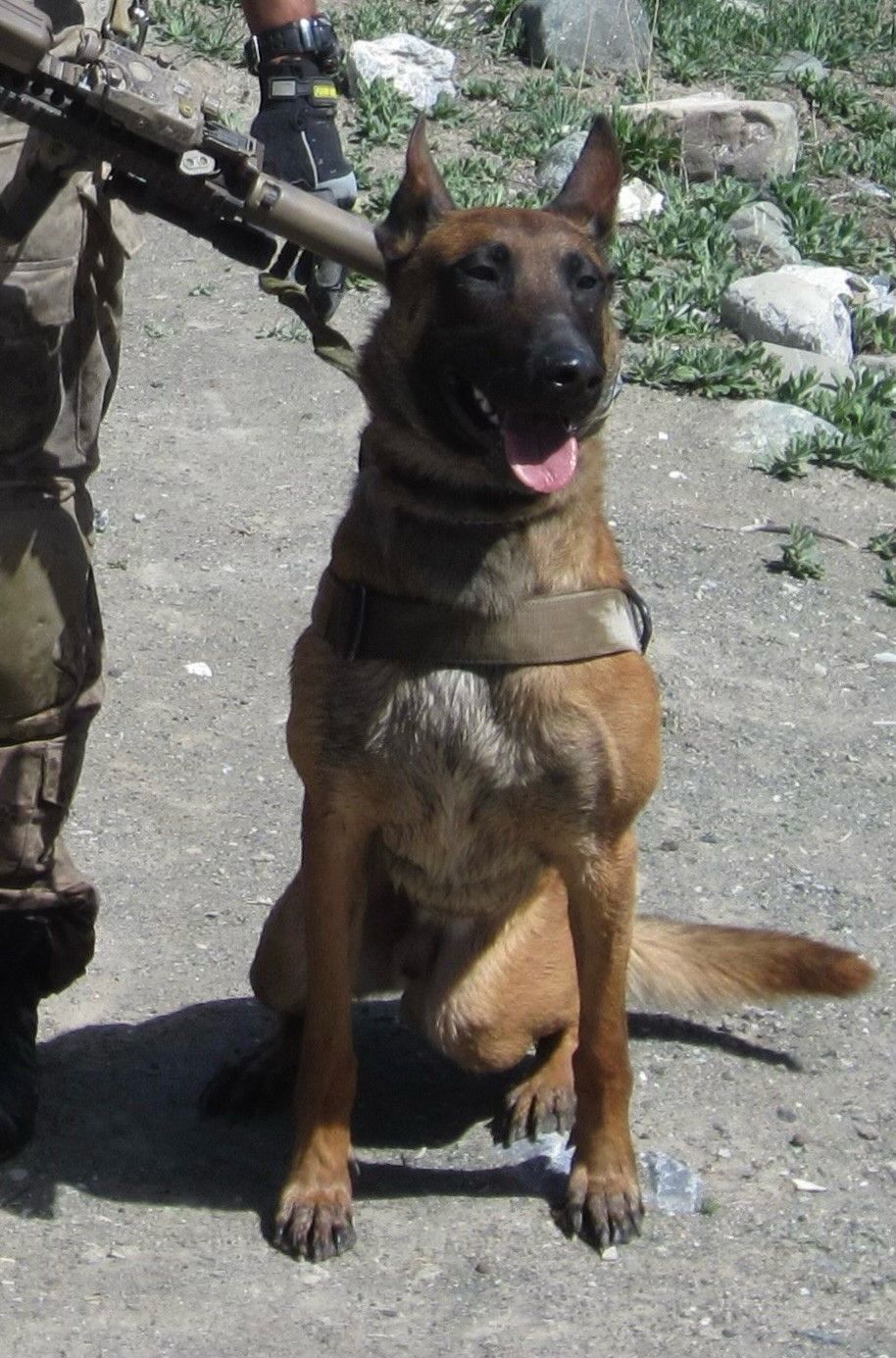
“He wasn’t my dog but my good friend was his handler”, explains Charlie. “I did a K-9 medic course which is where I met Gunner. Some dogs aren’t fun to be around – the MPCs do a lot of bite training but he was really sociable and super sweet. One of our deployments was coming to an end in 2019 and my buddy hit me up to ask if I would like to retire him.”
Gunner’s handler had already adopted an MWD, which enabled Charlie to throw his hat in the ring to take him home. “What helped me get him in the end was the fact that I was married with no kids or other pets, and I had a back yard. Everyone that knew him really liked him so he had a few people queuing up, but I think it was my wife that really swung it for us!”
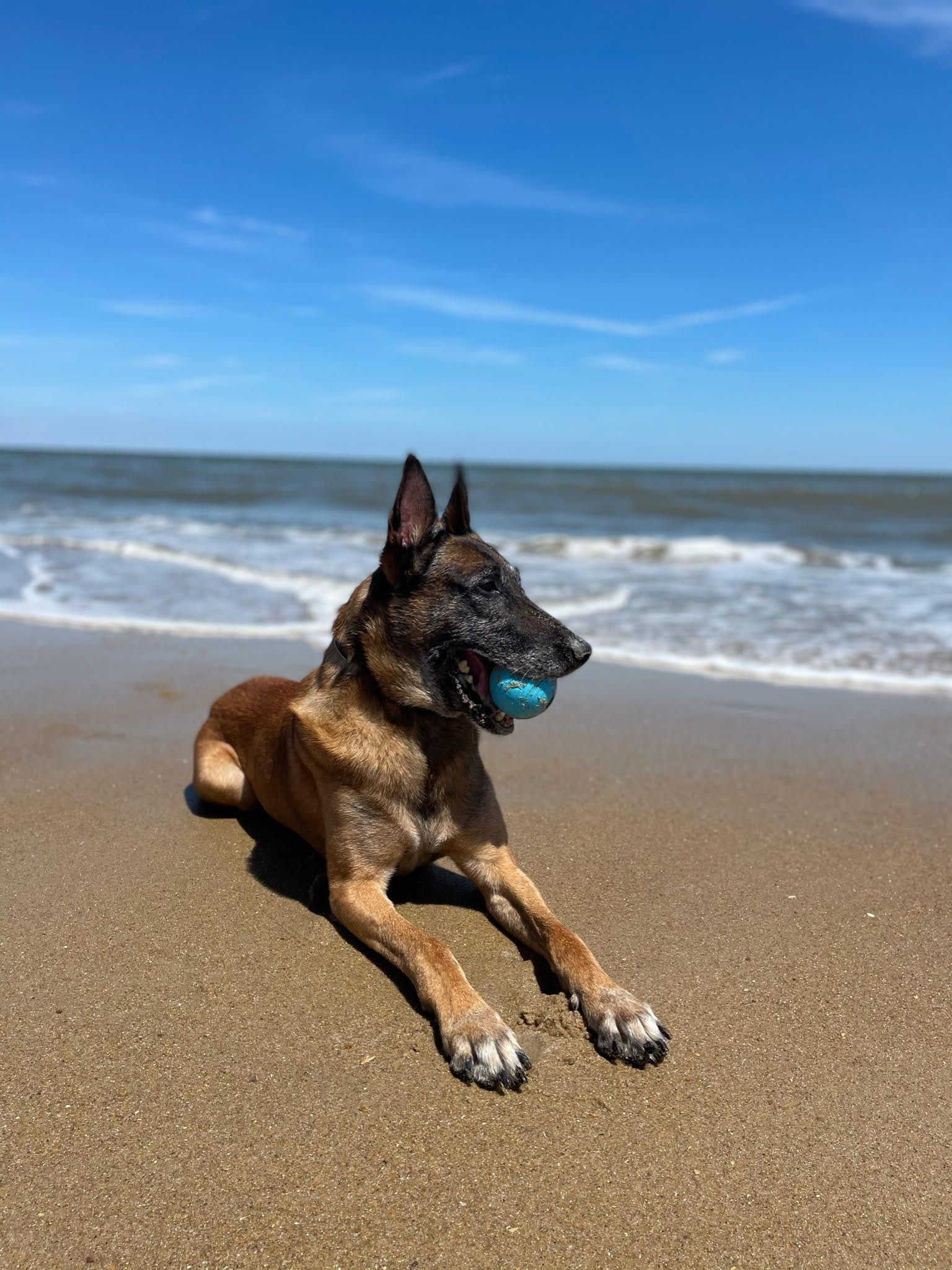
Changes
After years of faithful service, Gunner has taken some time to transition into life as a civilian. “He was super anxious, so it took some time”, explained Charlie. “He wouldn’t go outside by himself and he follows me everywhere. The transition was a lot on my wife – she really helped him soften to be a house dog.
“Gunner is starting to realise that it’s ok to lay down and take a nap. The first two years were the most significant, then we moved to Florida in 2022 and he really found his old man routine.”
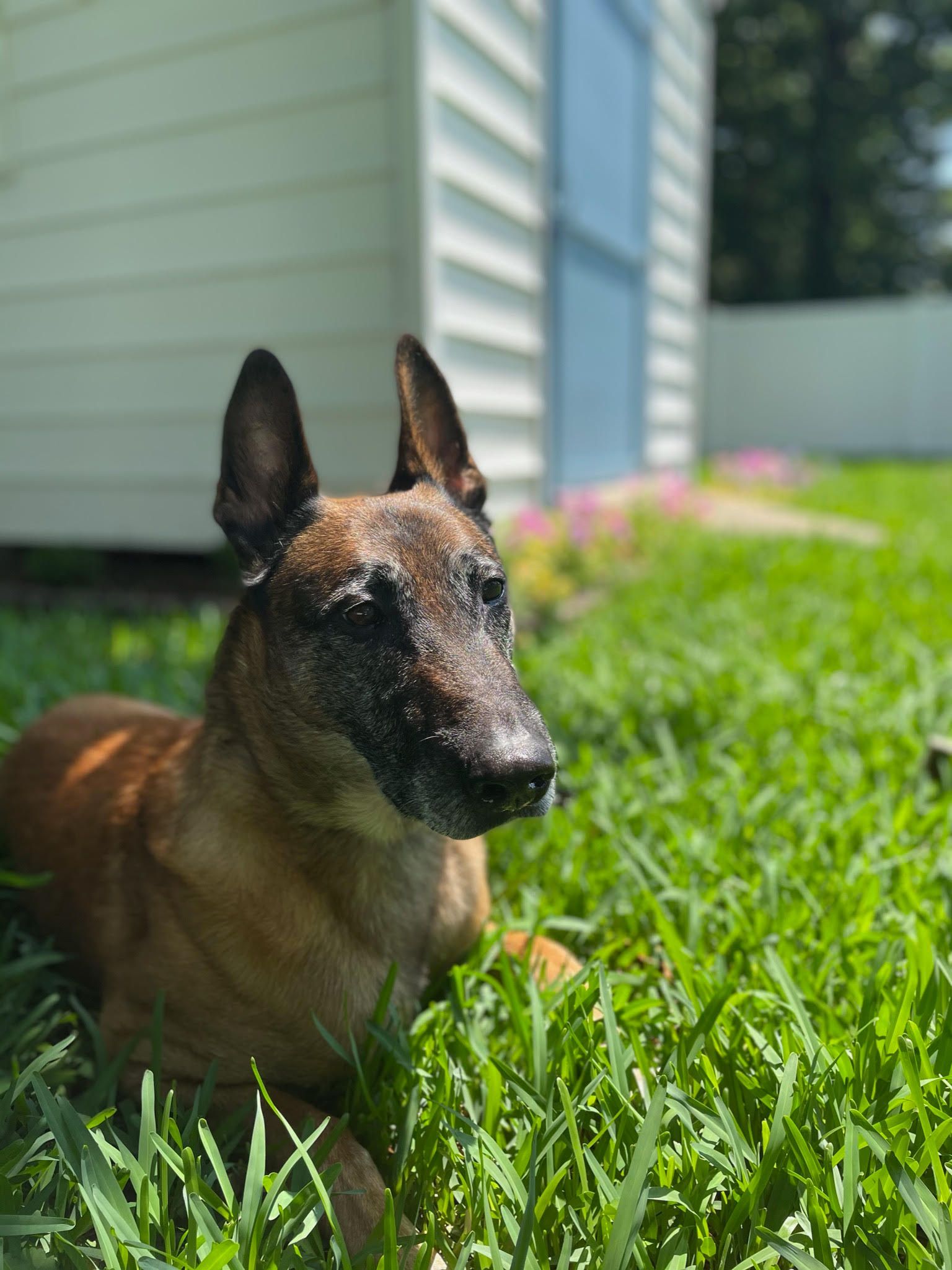
Gunner enjoying retired life
Gunner’s family first came into contact with US War Dogs in September 2024. “I had heard about you guys but Gunner had never needed anything. We took the time to make sure he was on the right food and supplements when he retired, which really saw him thrive.”
But as his advancing years caught up with him, Gunner began to slow down and struggle. “He went from being fine to not being able to navigate the hardwood floors in the house, so we decided to put some booties on him, which really helped.”
Deadly Sn-accident
When Charlie and his family went out of town for one night, Gunner – who had been left in the care of a friend – manifested some anxious behaviours. “When we got back, my wife noticed that he wasn’t right, and that his booties were nowhere to be found. We took him to the vet and they found two of the booties stuck in his intestines.”
Gunner underwent emergency surgery, which is when Charlie reached out to US War Dogs for help. “The surgery saved his life and we’d have done anything to get him better, but when the treatment totalled $5,000, I contacted War Dogs to see if they could help. They were incredible and told me that the bill would be covered in full.”
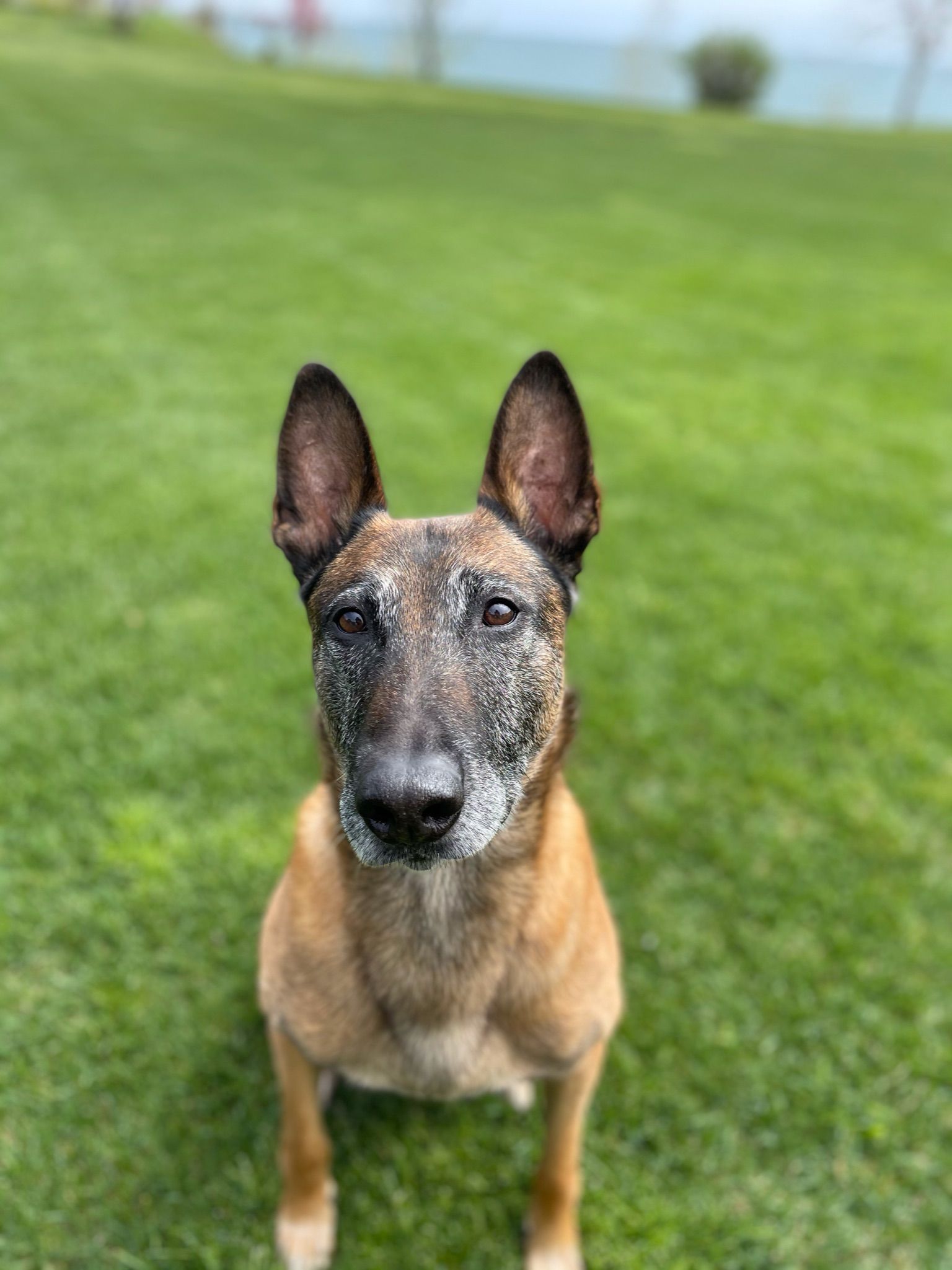
US War Dogs covered the cost of Gunner’s life-saving surgery
Charlie admits that the experience of accepting support from US War Dogs was a surreal one. “Being in the service myself, I’ve always been shy to ask for help from non-profits. When you’re staring down a $5k charge and working out how to balance it, it was a huge sigh of relief for me and my wife. We have a 15 month-old to think about too, so War Dogs’ support really was a gamechanger.”
US War Dogs covered Gunner’s treatment through our Emergency Care Program, which has helped scores of retired MWDs with care, since its launch in 2022.
Charlie admits that the surgery has knocked Gunner for six. “His age is becoming more of a factor these days and we are doing tests to see if there is anything more we can do to keep him more spry. One thing is sure, he wouldn’t be here now without that surgery and we are so grateful to US War Dogs for their help during that stressful time.”
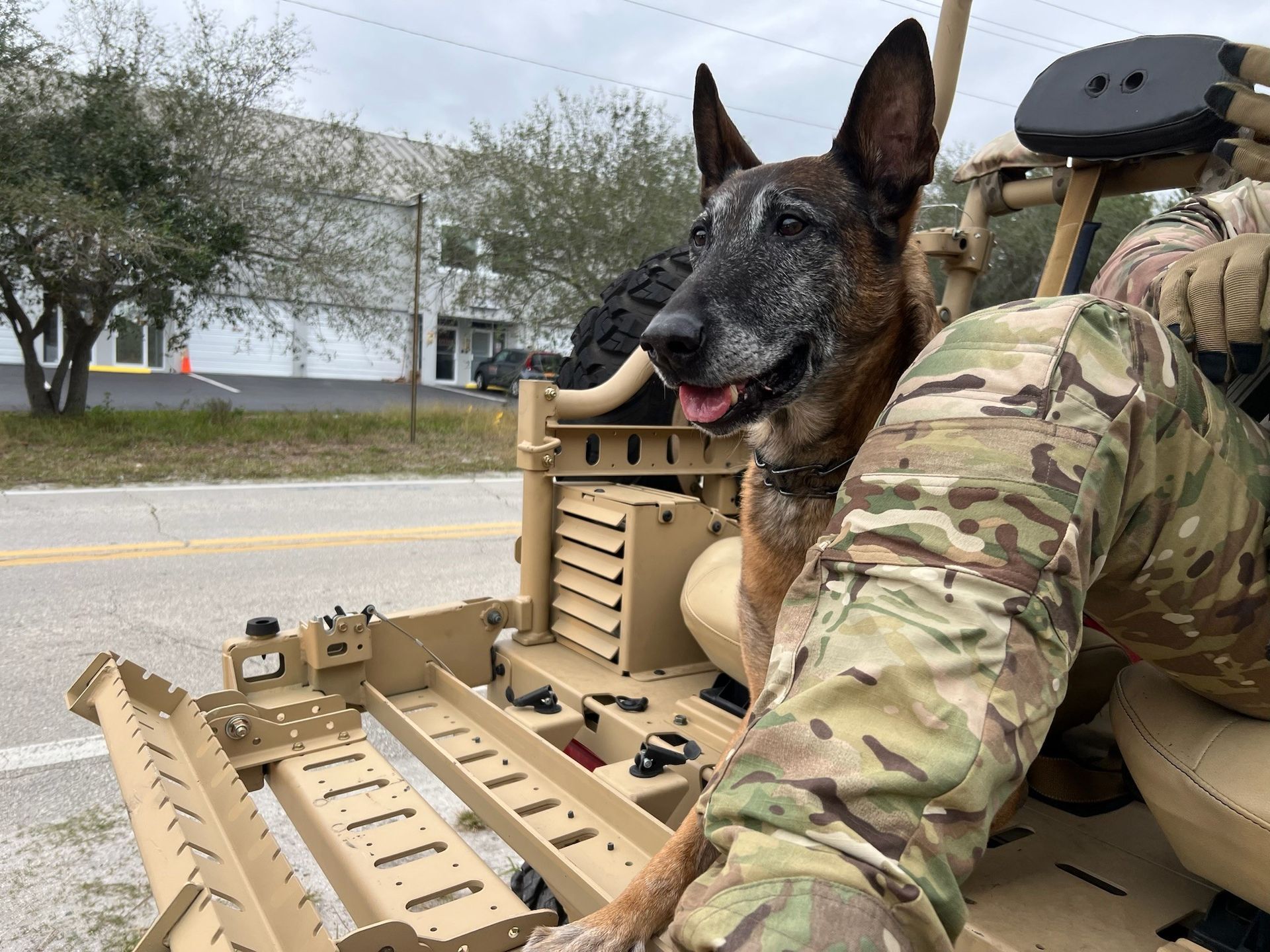
Thank you for your service, Gunner
MWD and Handler: Conquering Anxiety Together
Meet US Air Force dog handler, Sir’mann and his MWD, SSeneca and see how US War Dogs truly supports dog teams throughout their careers and – crucially – during retirement.
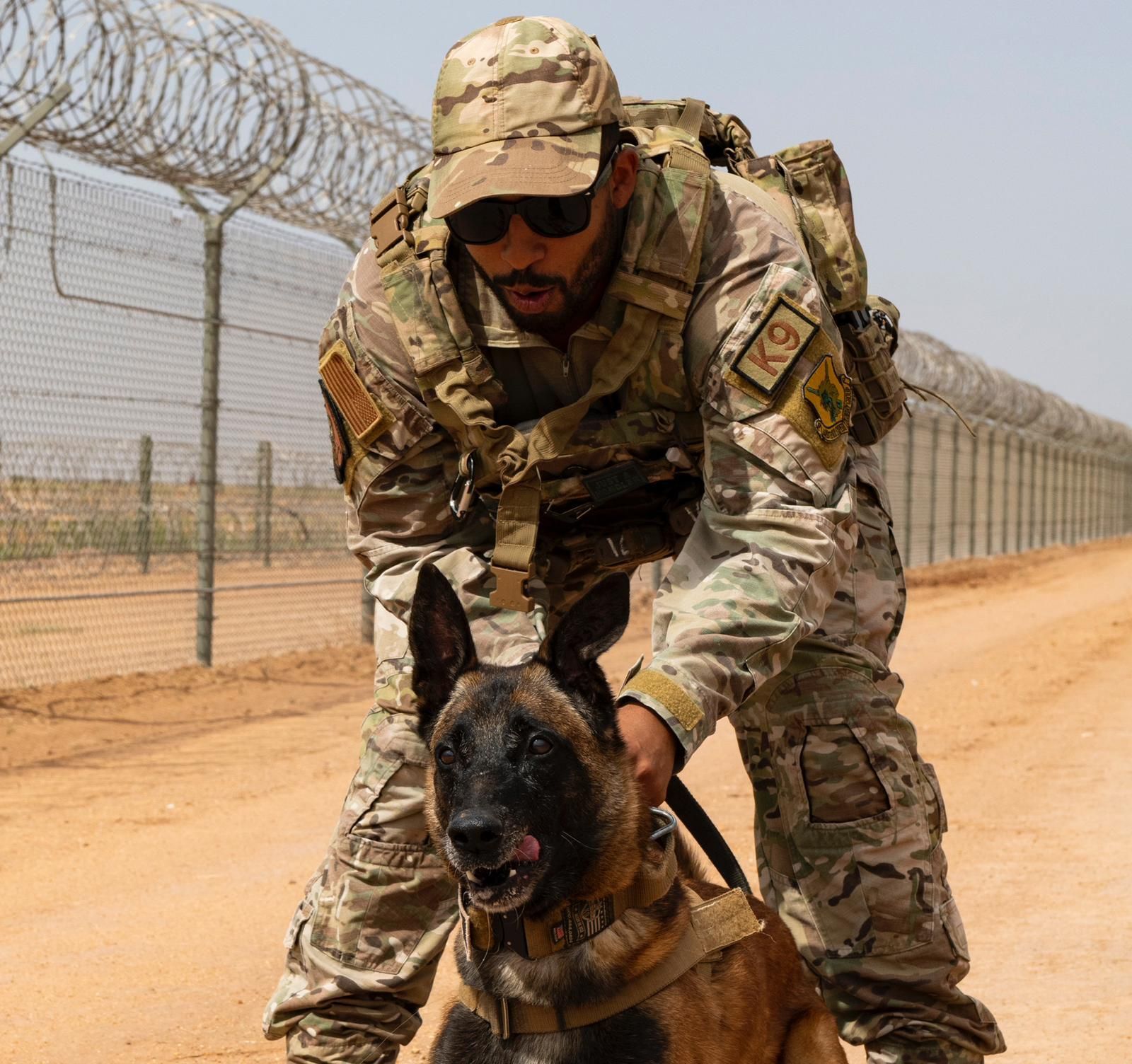
Dog Team Daydreams
Sir’mann Toliver joined the Air Force in 2017 with a dream to become a K-9 handler. While many find K-9 handling interesting, the process to getting accepted into the program takes intensive time and effort. Toliver was accepted into the program and MWD SSeneca was his first match. Like most relationships, it took a few weeks for them to understand each other's communication styles.
SSeneca had worked with multiple handlers in her past and was known for her leash biting and intense anxiety. While some individuals shied away from the challenge, Sir’mann made it his goal to work successfully together. Toliver picked up on her love for food, and from then on, the two clicked. They were a certified team in less than a month, then deployed to Africa in 2022.
Toliver likened the bond that he and SSeneca developed to that of a child with a parent. Sir’mann said: “Our bond was incredibly close and we really became one another’s emotional support. SSeneca was there for me in a way that no one back home will ever truly understand.”

Sseneca and Sir’mann’s bond became unbreakable
SSeneca retired in 2023 at 11 years old and was adopted by Sir’mann. During her time in the Air Force she clocked over 5,695 search hours and over 45,000 vehicle inspections. She was involved in the LVPD canine trials and placed 3rd in 2022 and first in 2023 among 80 other dogs.
Veterans Supporting Veterans
During their deployment period, SSeneca received multiple care packages from US War Dogs so when she retired, Sir’mann reached out to register her on the Rx Program. A few months ago, SSeneca woke up with a heavy cough. Sir’mann explains: “I left for work but when I came back, SSeneca hadn’t left her spot on the floor. With a heavy heart, I could sense she needed help.” Sir’mann rushed her to the emergency room and after multiple exams, the veterinary team found her lungs were collapsing. SSeneca would need to stay at the vet for multiple days and would also need a heavy dose of antibiotics.
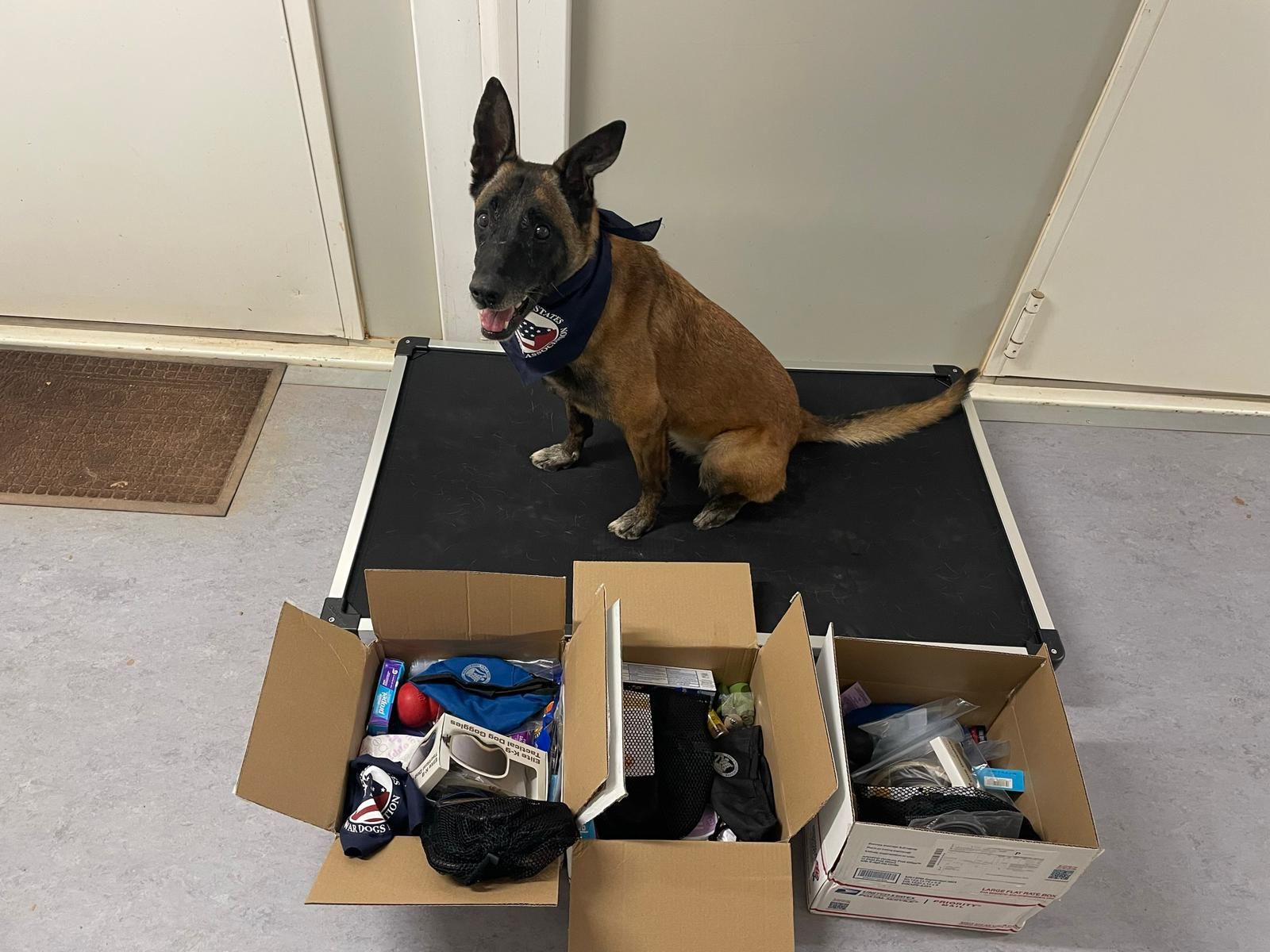
Sseneca was a recipient of US War Dogs’ Care Package Program while she and Sir’mann were on deployment in Africa
Toliver’s anxiety heightened. “I did not want to leave my best friend at the vet. I wanted to make sure she would be okay but I also couldn’t help but panic about the cost. I knew this would be a tremendous cost and felt sick to my stomach that I possibly wouldn’t be able to afford the care.”
US War Dogs came to mind from the care packages, and Sir’mann decided to reach out: “Within minutes, the US War Dogs president replied, ‘We’re here to help. Send the vet information and we’ll cover the entire cost.
“I replied to that message as a flood of tears streamed down my face. I wasn’t ready to say goodbye to my other half and I couldn’t imagine having to make a decision like that based on money.”
US War Dogs president, Chris Willingham, said: “SSeneca is a great example of how US War Dogs provides a life cycle of practical support for MWDs – both while one active duty and during their retirement. We were proud to send gear and care packages to SSeneca while she and Sir’mann were stationed overseas and when she came to retire, we not only enrolled her on the Rx Program, we also issued her with her Service Medal, in grateful thanks for her devotion to our country.
“We were more than happy to take care of SSeneca through our Emergency Care Program, which is designed to alleviate the financial burden from families when they need it most.”
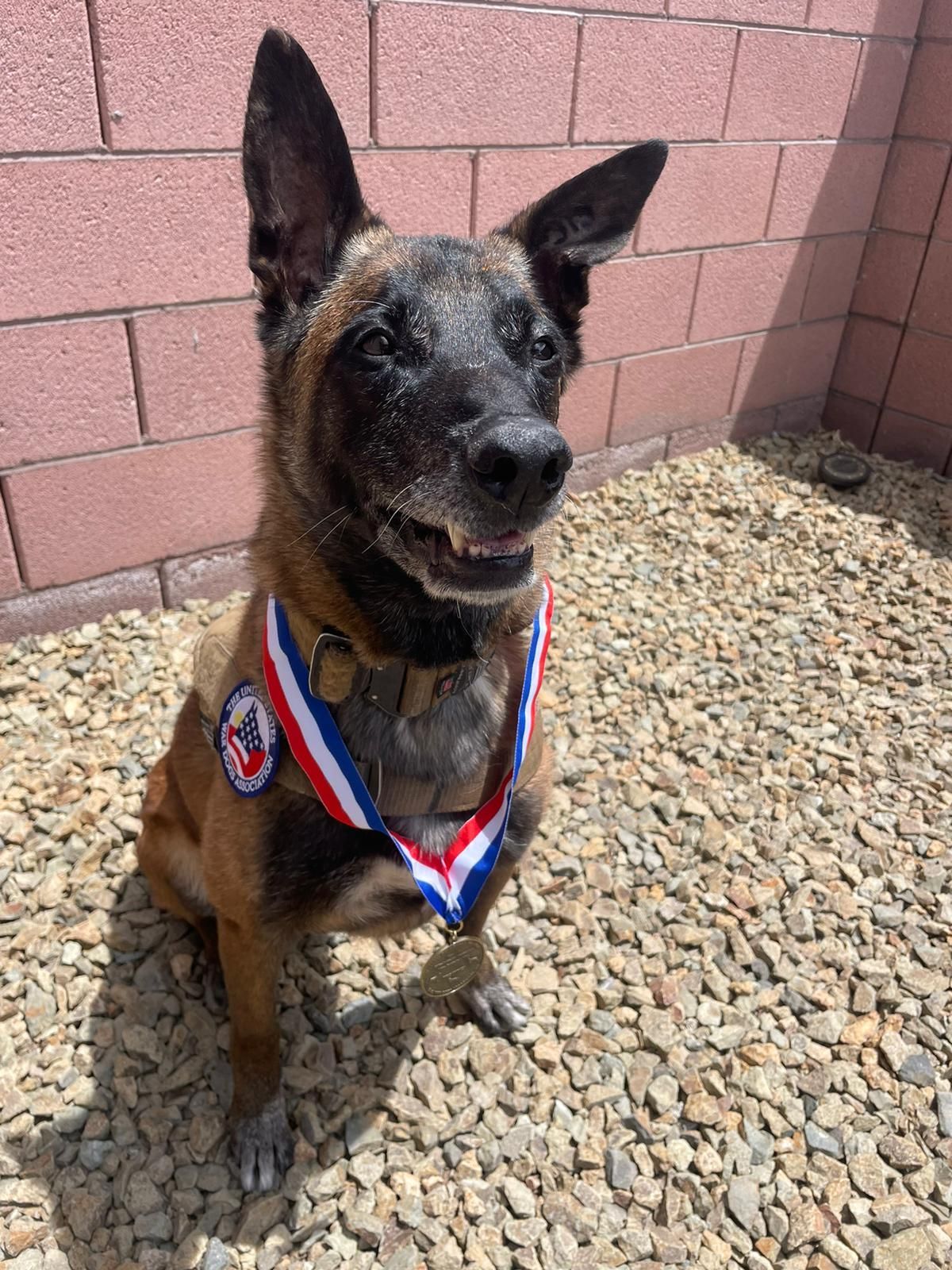
Sseneca sporting her US War Dogs MWD Service Award
SSeneca has since recovered and continues to find energy to do the things she loves, like relaxing with her family. Toliver wants other retired personnel to know this option exists and saved SSeneca: “I believe that the dogs deserve a financial retirement just like I have, and that’s what US War Dogs does for dogs like SSeneca.”
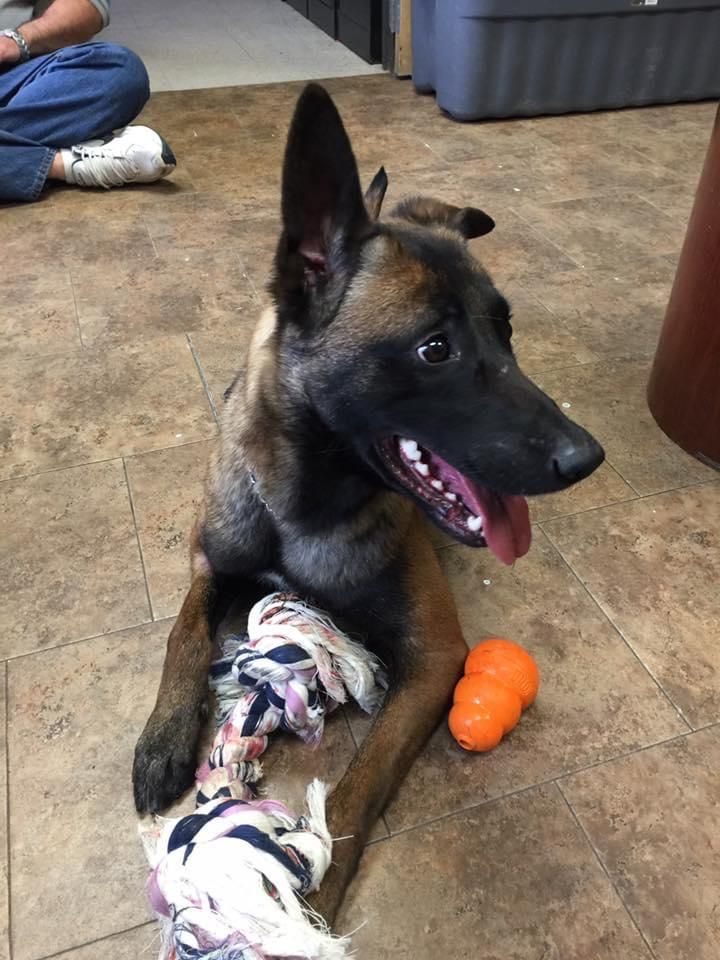
US War Dogs is honored to support pups like SSeneca throughout their lives and careers
Kyra’s Killer Snack
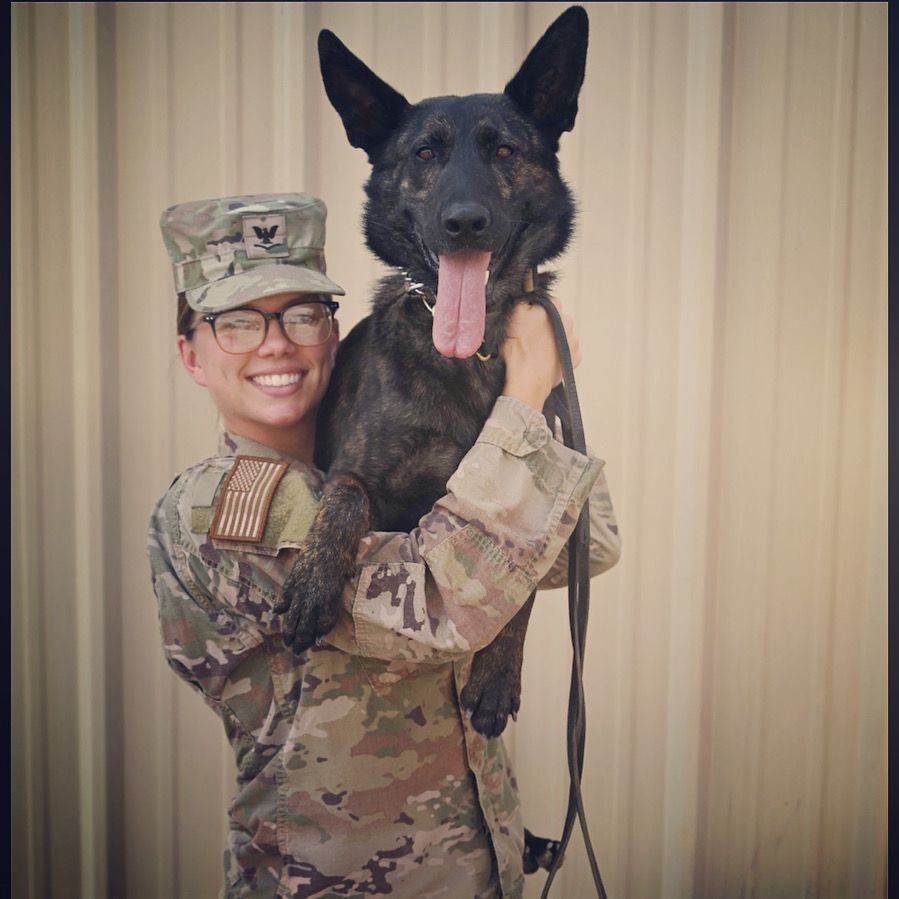
Kyra munched her way into big trouble when she nabbed a corn on the cob from owner Kayla’s dinner table.
Kayla and Kyra served together for two and a half years as a dog team, with Kyra trained as a patrol and explosive detector dog (PEDD). But when she was medically retired with arthritis in 2022, Kyra's handler became her adoptive family.
Kyra required lifelong medications to keep her happy and healthy and so swift enrolment in US War Dogs’ Rx Program was a must.
The Belgian Shepherd mix – who retired with former handler Kayla last year – showed no immediate signs of danger, but Kayla knew the dangers of her dog stuffing down the corny snack and called the vet for advice.
“There was no way that nature would take its course on a corn husk of that size so I rushed her to the vet, who ordered up a scan to see where the husk was located. Surgery to remove the husk was our only option.”

Kyra needed an $8,000 surgery after snaffling a corn on the cob husk that became lodged in her gut
Kayla – who still serves with the US Navy – was quoted $8,000 for the surgery.
“I contacted US War Dogs and within 15 minutes, they had agreed to cover the cost of the treatment for Kyra, to make sure she was ok. I was so stressed – there was no way I could afford to pay that kind of money.”
With support from US War Dogs, Kyra received the treatment she needed to remove the husk – which quickly became a deadly obstruction in her digestive tract – so she could return home to retired life.
“I will always be grateful to US War Dogs for their support. It means the world.”
My Shadow
A tribute to Timothy and Shadow Read
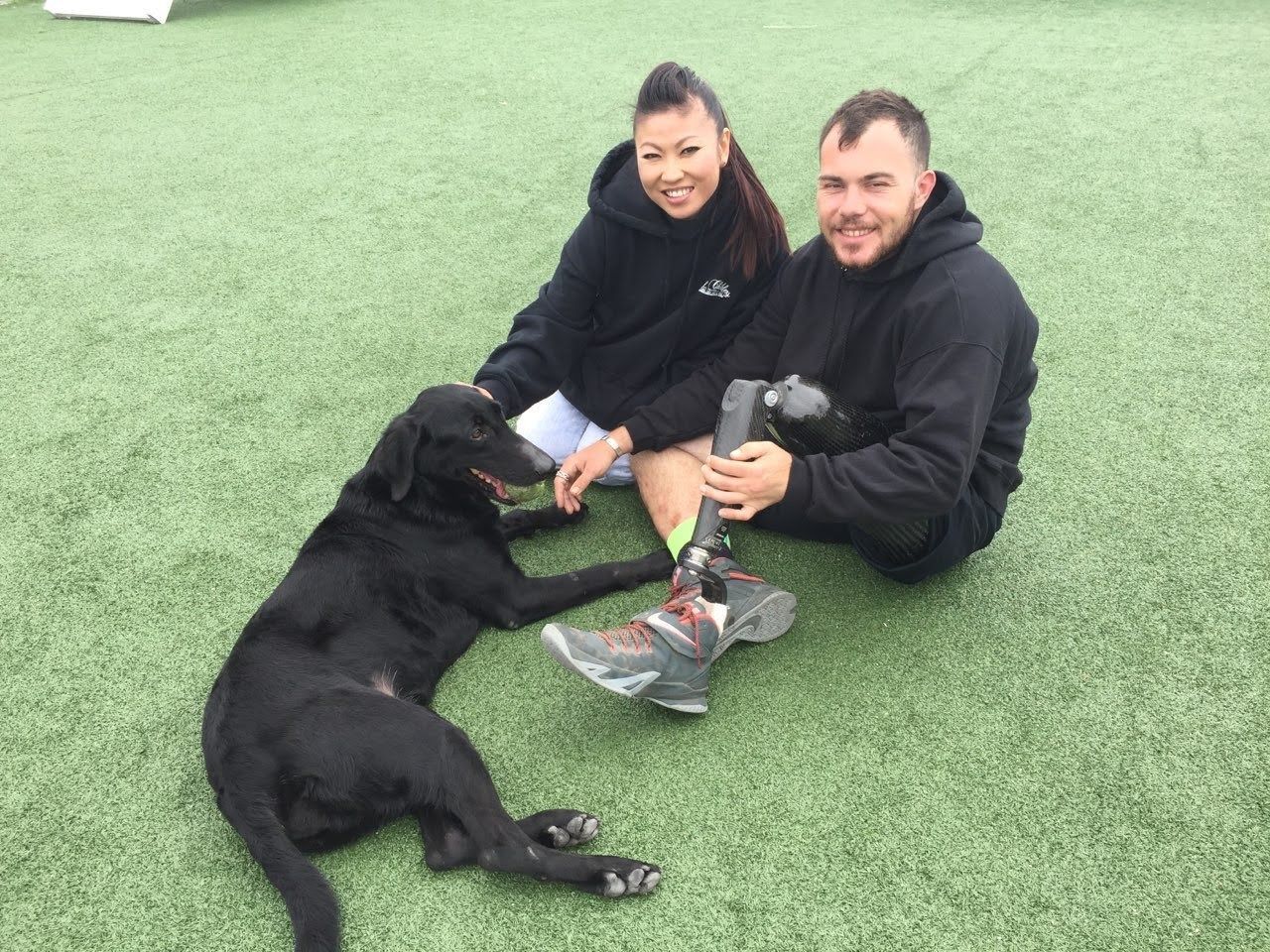
The Read Family: Timothy, Anh and Shadow
Shadow retired to live with Anh and Timothy Read after nine years of service to the US Marine Corps in 2020. Her adoptive family showered her with love and affection and there was no doubt that she had found her forever home.
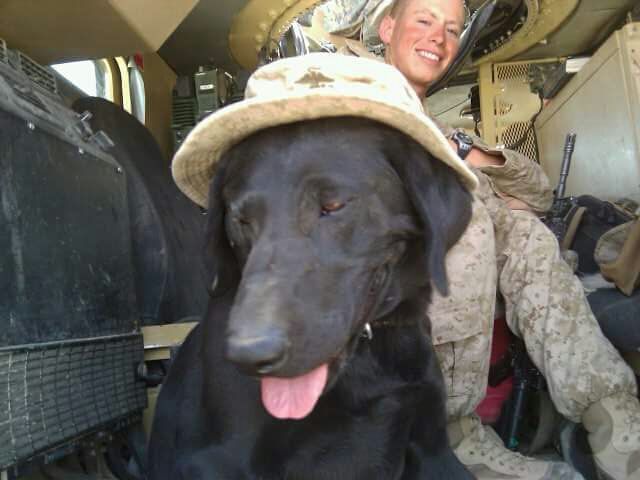
Shadow on one of her five deployments
As a Marine Corps veteran and double Purple Heart recipient, Timothy’s bond with Shadow was unbreakable. Shadow served five tours in Afghanistan as an explosive detection dog and although the pair never served together, their shared service and experience of combat made them soulmates.
Timothy’s Service and Sacrifice
Timothy served with 2nd Battalion, 6th Marines and deployed to Marjah Afghanistan under Lt. Col Ellison and Sgt Maj Frye. Tim was wounded during a patrol on August 31, 2010, but chose to stay with his battalion as the unit had suffered multiple fatalities and was short with manpower.
However, on October 15, 2010, Tim stepped on a IED pressure plate which resulted in multiple life-changing injuries, including the loss of his left leg above the knee, collapsed lungs, wrist injuries, deafness. Tim also suffered a traumatic brain injury (TBI) and blindness in one eye.
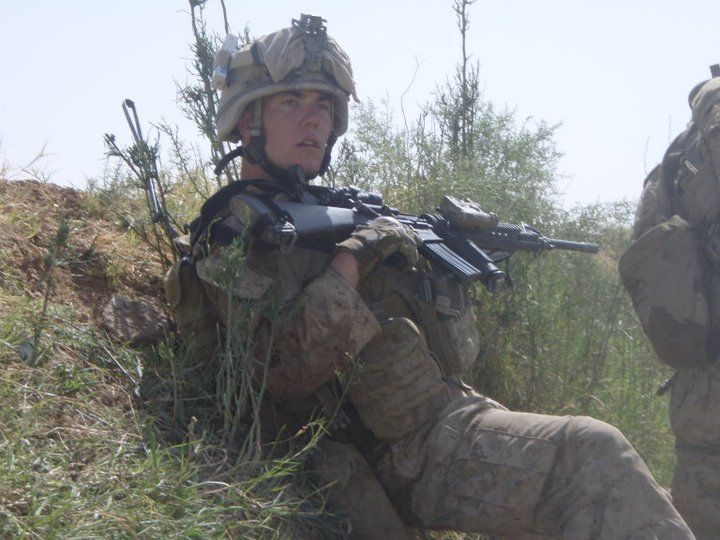
Timothy on deployment in Afghanistan
My Shadow
While recovering at the Balboa Hospital, San Diego, in 2014, Tim was introduced to Shadow R491. Tim’s wife Anh said: “It was love at first sight because when the Navy trainers released Shadow, she ran straight to Tim. We did the paperwork to adopt Shadow and waited for her retirement, when we were finally able to bring her home in 2015.
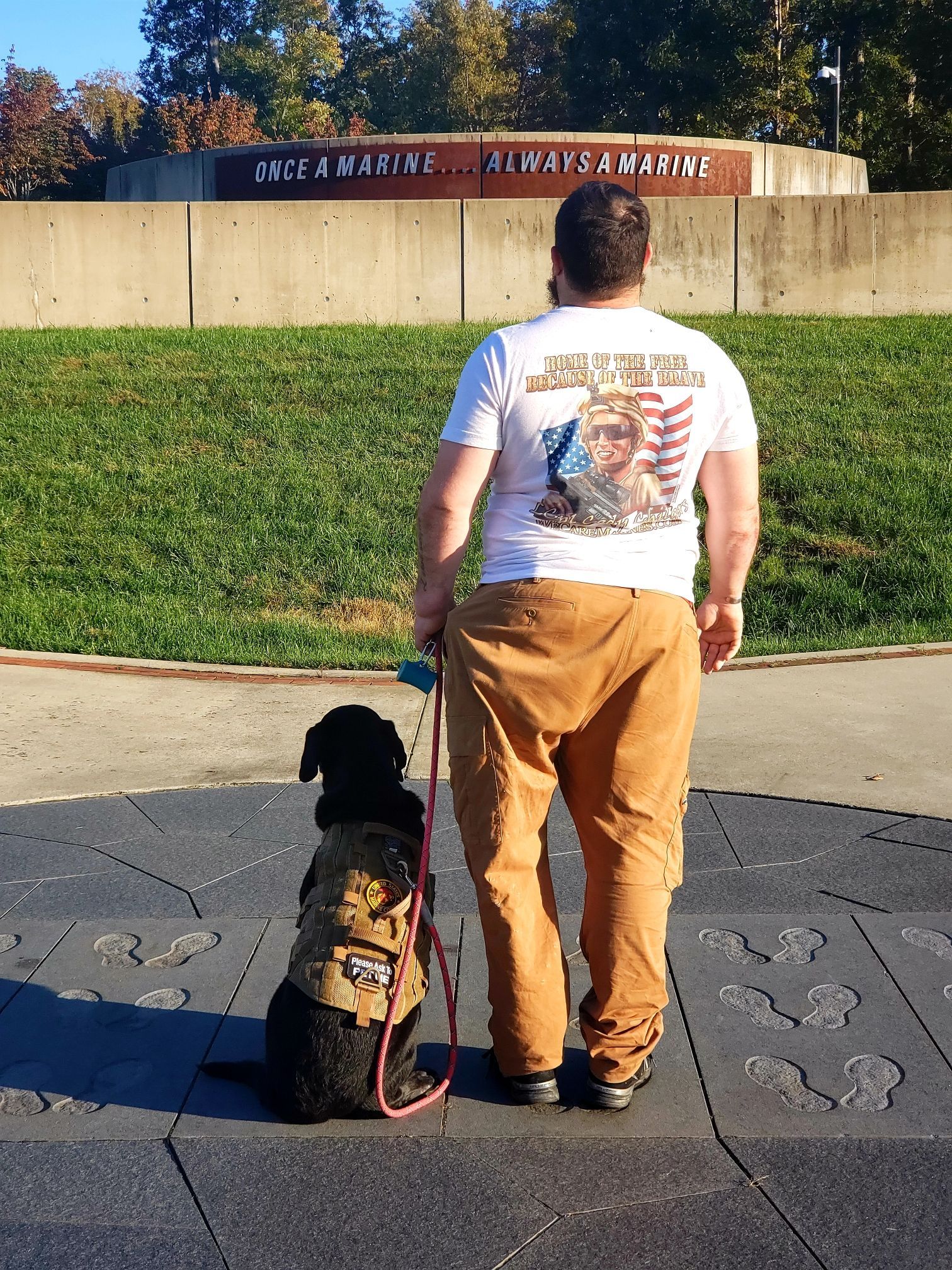
Once a Marine, Always a Marine: Timothy and Shadow
Supporting Shadow
Shadow was a member of US War Dogs’ Rx Program but when she was diagnosed with cancer in 2022, Tim contacted US War Dogs for help with her treatment. Shadow underwent extensive treatment and beat the cancer, much to the joy of Tim and Anh.
Anh said: “Shadow survived the gruelling treatment and bounced back to great health because of US War Dogs’ generosity. Her quality of life improved dramatically thanks to the medications that US War Dogs funded and we were thrilled to have our girl back.
“Shadow travelled with us everywhere. My husband and I made sure she enjoyed life to the fullest and that her retirement from deployment was filled with love (so much love), lots of treats, snuggles and toys.”
Tragically, Tim passed away suddenly last year, leaving Anh and Shadow to navigate life without him. “My husband and I could not have been more grateful for US War Dogs and the generous donors who support them. Shadow faithfully served my husband until his unexpected death.”
Retracing Footsteps
In February of this year, Anh went on a grief healing trip to the base where Shadow was adopted. “I didn’t want Shadow to make the journey with me so left her at home to rest. I brought along Shadow’s deployment documents to share with the staff at the Naval base.
“It has been a very long time since we adopted her so I didn't think anyone there would remember her. Amazingly her first handler, Chief Nobles, was there. He recognized Shadow immediately and shared many stories of her with me.
I could not have been prouder of her.
“It was also great to meet some of the individuals who had played a significant role in Tim’s recovery. I credit them with keeping him alive during those dark times at Balboa hospital.”
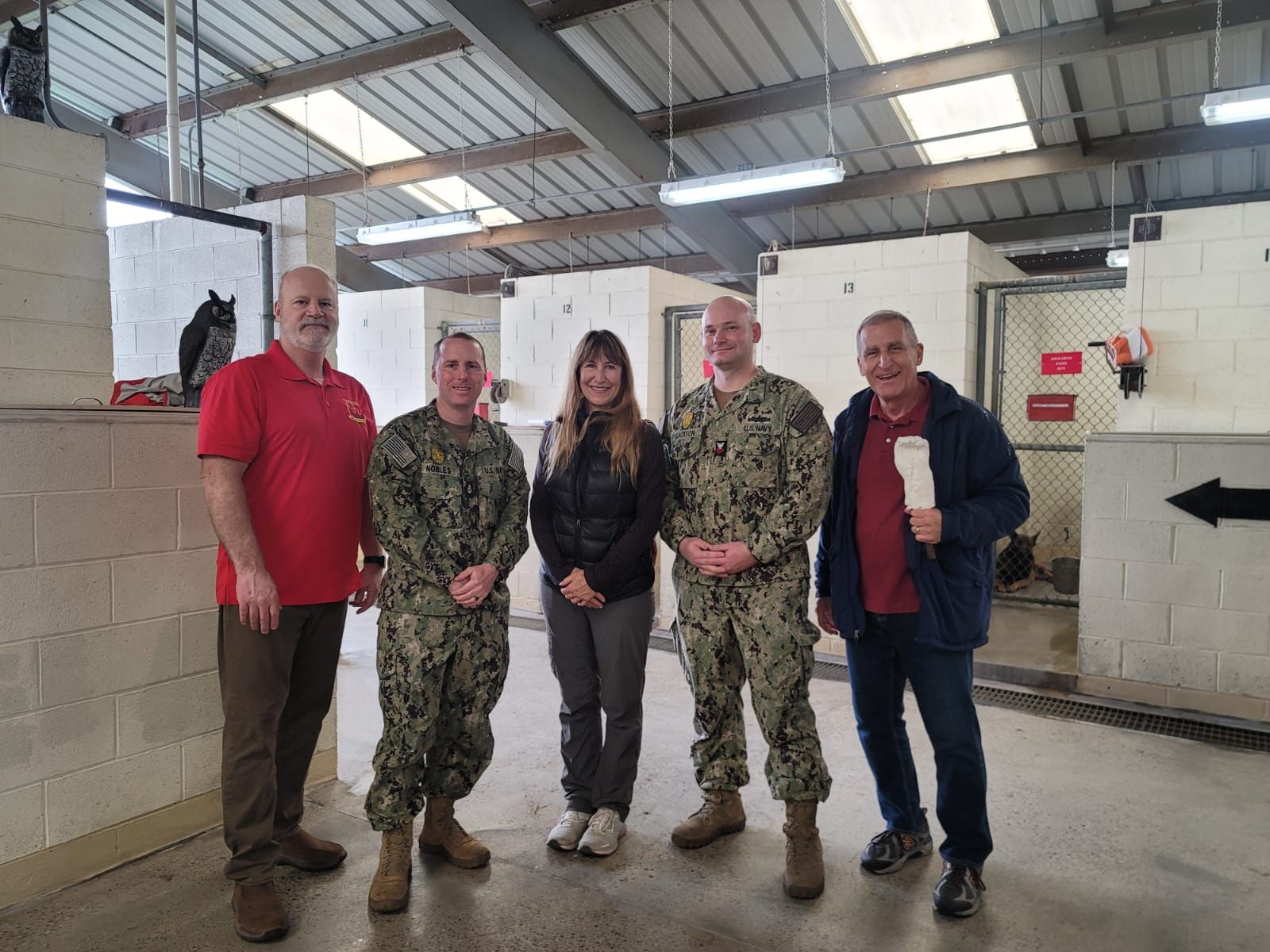
Anh reunited with some key people who helped Tim during his recovery, including retired Marine Cheney – the deputy officer in charge of the Wounded Warrior Battalion – West, retired Marine Corps pilot Dennis DiLucente and Kim Bozell, who suggested Tim should go and meet Shadow while he was recovering.
Never Long Enough
Devastatingly, Shadow passed away on 3 May of this year and in a final act of honor for her service to our country, US War Dogs paid for her final veterinary bill and cremation, through our Rainbow Bridge Assistance Program.
Anh said: “Shadow had an incredible life – both in active duty and in retirement.
Shadow went everywhere with us and met many interesting people, including Prince Harry while we were at the Invictus games. She even got a kiss from him!
“Shadow was the first working dog to receive a special Commendation from the City of Tampa, presented by our local firemen. She was in a few parades, including the Warrior Games parade, Gasparilla parade and the Tampa St. Patty parade.
“None of these treasured memories would have been possible without the US War Dogs Association Rx Program and the financial support for Shadow's radiation treatment. They even paid for her final dignified goodbye to be with her dad. We love you very much and will never forget your generosity and kindness.”
Anh concludes: “Please send our deepest gratitude to your generous donors. What an amazing program US War Dogs is – honoring these incredible, loyal heroes.”
US War Dogs president, Chris Willingham, said: “We send our love and support to Anh in this time of great sorrow. We thank Tim and Shadow for their service and feel honored to have supported them in their journey together.
“Never above you, never below you, always beside you.”
Click here to view a moving tribute paid to Shadow by her local TV news.
It’s a Hard Nox Life
Retired US Army patrol and explosive detector dog (PEDD), Nox, is no stranger to veterinary treatment, having broken his ankle while on active duty in 2022. But when his former handler and adopted dad, Jared, noticed him limping after his walk, he came to learn just how much US War Dogs would do to help our nation’s retired MWDs.
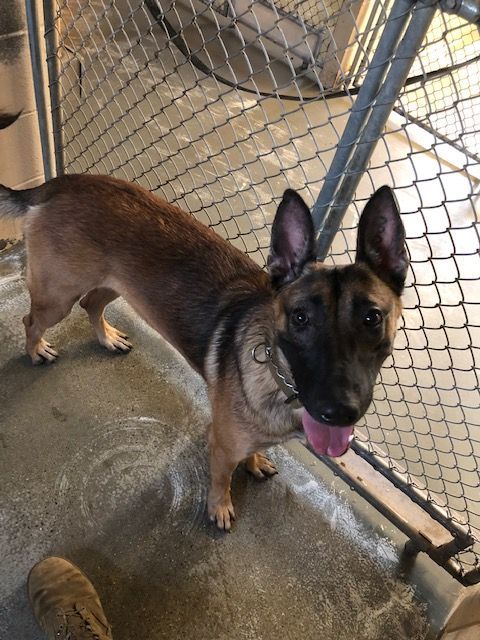
Jared and Nox were paired together in 2018 while stationed at Joint Base Elmendorf-Richardson (JBER), Alaska. After certifying through the Army’s enhanced PEDD training program (PEDD-E), the dog team proceeded to enjoy a rich and varied career, providing protection and detection capabilities to VIPs and dignitaries across the US, as well as completing a deployment to Honduras.
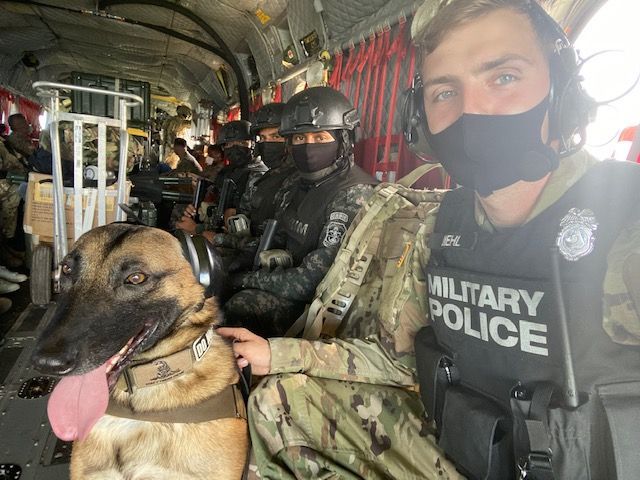
Nox and Jared flying to a drop-off location with Honduran soldiers
Jared explains: “We’ve been fortunate to spend our entire careers together. Typically, MWDs don’t PCS with handlers, but because Nox and I had completed the PEDD-E course, we were authorized to go together. I always praise God for that because my heart would have shattered if I’d had to leave him behind.”
In December 2021, the dog team moved to Fort Hood, TX, to begin training for recertification and assist in multiple joint medical training exercises, where Nox was able to give medical personnel hands-on experience with an MWD. “This provided them with a crucial understanding of how to treat injured MWDs on the battlefield.”
Nox in training with Jared
Wounded
Nox’s time at Fort Hood came to an abrupt end when he suffered an extreme injury to his front right ankle. Jared explained: “It happened during a training exercise and he was immediately taken to the vet. Surgery was mandatory for this kind of damage so they splinted his leg to try to keep it stable until a surgery date could be established. He had to go down to Lackland Air Force base where the Holland Dog Hospital is located for the operation.”
A nasty break and a long recovery
Nox spent four months in post-op recovery, which included removing the metal plate that had been placed in his ankle to stabilize the leg. In February 2023, the process of retiring Nox from the Army had also begun.
Jared said: “The primary vet at the clinic on Fort Hood was incredibly empathetic to Nox’s situation. He wrote up paperwork, stating that Nox should be allowed to come home with me while recovering from his operation – as well as from some other injuries he caused himself while in the kennel runs during his recovery.
“My commander signed off on it and just like that, Nox was home with me. It took a handful of months for the process to finalize but on March 27, 2023 Nox was officially retired from his service in the Army. Only a handful of months after that I went on terminal leave to enjoy some time before my contract in the Active Duty Army was complete. My leave my fiancé Danielle and I took Nox on a road trip across the country, ending in my home state of Washington State. Nox loved his vacation.”
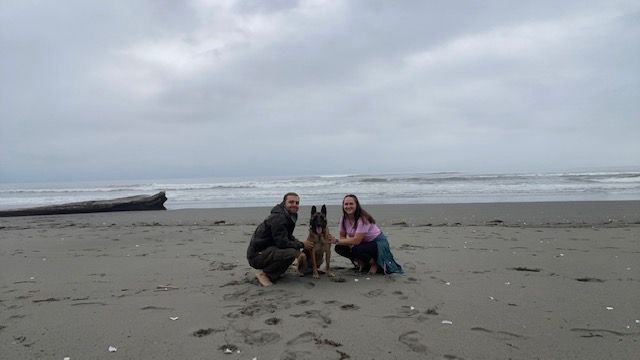
Nox, Jared and Danielle enjoy the west coast in Washington State
Nox was recovering well from his injury and a few months after he was discharged from the Army, Jared reached out to US War Dogs to sign him up to the Rx Program. “The meds he needed were running out so I reached out to see what kind of support we could get. The guys at US War Dogs turned around his application in double quick time and we were off and running with his refills, which was an incredible financial relief.”
Walkie Whoopsie
Everything was going well until December of 2023 when Nox suffered another injury while at the dog park. “Danielle had him checked out but the vet assumed something else was causing Nox to continue to limp on his back left leg. After another month, Nox showed no signs of improvement and in January of this year, we took him back to the vet again. They performed a more thorough examination, as well as some X-rays and discovered that Nox had torn a ligament in his knee.”
Jared and his fiancé were quoted just over $6,000 for the surgery required to fix Nox’s ligament. “To pay for this operation would have caused an incredible financial burden on me and my family. While we were trying not to panic and get this situation sorted out, I decided to reach out to the War Dogs Association again, thinking it would be a long shot. They had me file the necessary paperwork and said they would get back to me with a decision.
“By the goodness of God through this tremendous organization, they replied to me and said they would cover the operation in FULL! On top of that, the president of the organization was the one to reach out to me directly to give me that news. From that point on, we were in consistent communication as Mr. Chris Willingham, gave me his personal number and to told me to reach out when payment needed to be made. The entire process from the moment I reached out till payment after the surgery was truly exemplary.
“Since then, Nox has been healing wonderfully and is on track to make a full recovery.”
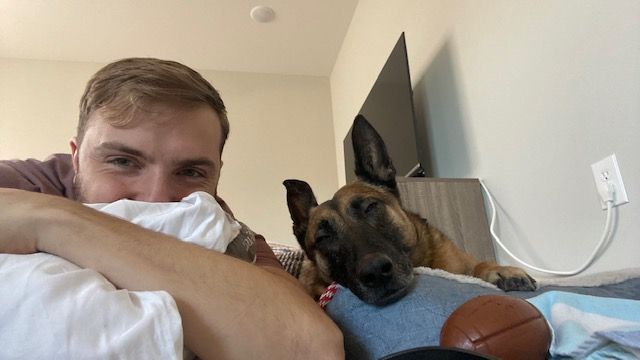
Nox recovering with the help of some strong pain meds
Jared, his fiancé and Nox, demonstrate exactly why US War Dogs exists – to alleviate the financial burden from handlers and take care of our retired heroes when they need it most.
US War Dogs president, Chris Willingham, said: “It has been our pleasure to help Nox and his family in this way and we are thrilled that his progress is holding steady. We can only continue to provide this care by virtue of our incredible supporters, who make our support possible. On behalf of the team at US War Dogs and Nox, we can’t thank you enough.
Jared continued: “It is quite upsetting that retired Military Working Dogs don’t get some sort of VA benefits after their loyal service to our great country. They work so incredibly hard day in and day out to please their handlers and get the mission done, whatever it might be.
“These dogs are so much more than equipment, though some might refer to them as such. They are our partners. Loyal companions that will go to the ends of the earth to please us. Nox has become the best friend that I never knew I needed. The bond that we developed over our military service together is something truly special.
“To have an organization like the US War Dogs Association come to our aid at a time of great need, and to treat Nox with such care, dignity, and respect, is something truly outstanding. They get it. They understand what these dogs mean to us. They understand the needs that these veterans have because of all the intense training and utilization that they go through.
“From the bottom of my heart, thank you. I praise God that there is an organization like yours out there helping people put back the pieces when things just seem to keep falling apart. Your kindness and generosity will never be forgotten.”
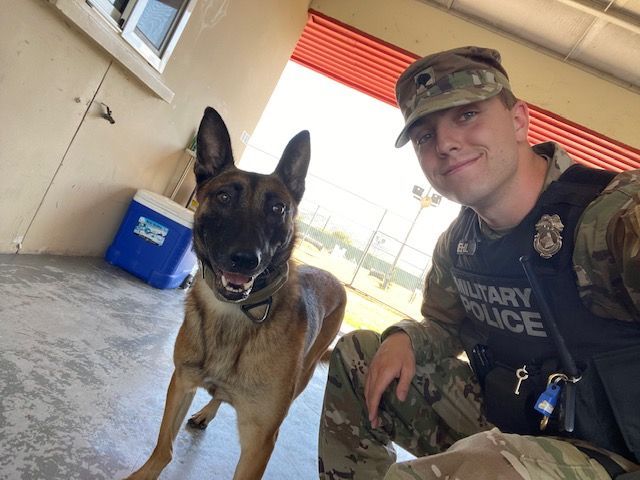
US War Dogs is proud to support Nox
Not Being With Dad Really Gets Under Drago’s Skin
Drago joined the Rx Program in 2021 when he was medically retired from his career as a patrol and explosives detection dog (PEDD) in the US Air Force, thanks to a complex and painful skin condition. He was also suffering with hip dysplasia, so it was time for him to slow things down.
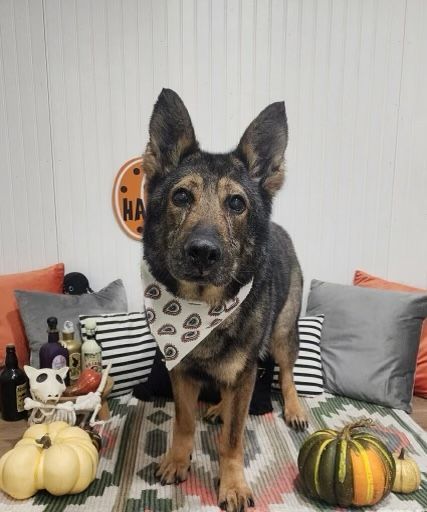
His former handler Bryan adopted Drago, who settled in well with his family. As he adjusted to a slower pace of life, his skin issues began to calm down and his zest for life increased. “He was clearly feeling so much better – it was wonderful to see. He was skipping around like a puppy again.”
Drago continued to take pain medication for his hip dysplasia and US War Dogs was happy to step in to cover the costs.
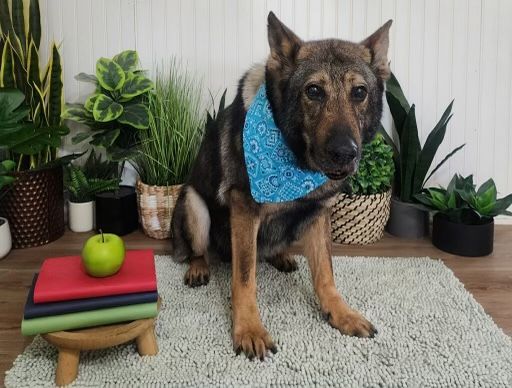
Around 15 months into Drago’s retirement – in August 2022 – Bryan was asked to deploy at short notice, which included an initial six weeks of training. Bryan said: “Drago started to show signs of his skin issues returning. His skin was raw from the bacteria and he was constantly licking, which made it worst.”
After a trip to the vets for more meds, Drago’s issues had been linked to separation anxiety with Bryan leaving. Bryan said: “I came back from training for about 20 days and although his skin was still raw, it wasn’t as bad as a few weeks prior.”
But when Bryan shipped out for his deployment, Drago’s skin reacted horribly. “Within three weeks of me being gone, his entire underbody was raw and the hair had fallen out.
“My wife had to take him to see the vet team and he was so bad, they needed to sedate him to clean and treat his skin. In that moment, we started to get really worried. Drago was getting on in years and that the vet warned that sedating a dog of his age is always a risk.”
As well as being desperately worried about Drago, Bryan and his family had the added worry of paying for emergency veterinary treatment.
“My wife was trying to sort everything out and with the time difference and being so far away, I felt really helpless. Everything happened so fast, we just wanted Drago to be better, so we paid for everything and took the vet’s advice on the best possible treatment.”
While the ordeal was unfolding, Bran reached out to US War Dogs to see if there was anything the organization could do to help Drago.
War Dogs president Chris Willingham said: “Our Emergency Care Program is designed to come into play in situations just like this. You have a deployed hander; a family trying to deal with the upset of a very sick retired MWD – who is now their beloved family pet – and mounting vet bills to pay. I was honored that US War Dogs could step in to alleviate some of the burden in those moments.”
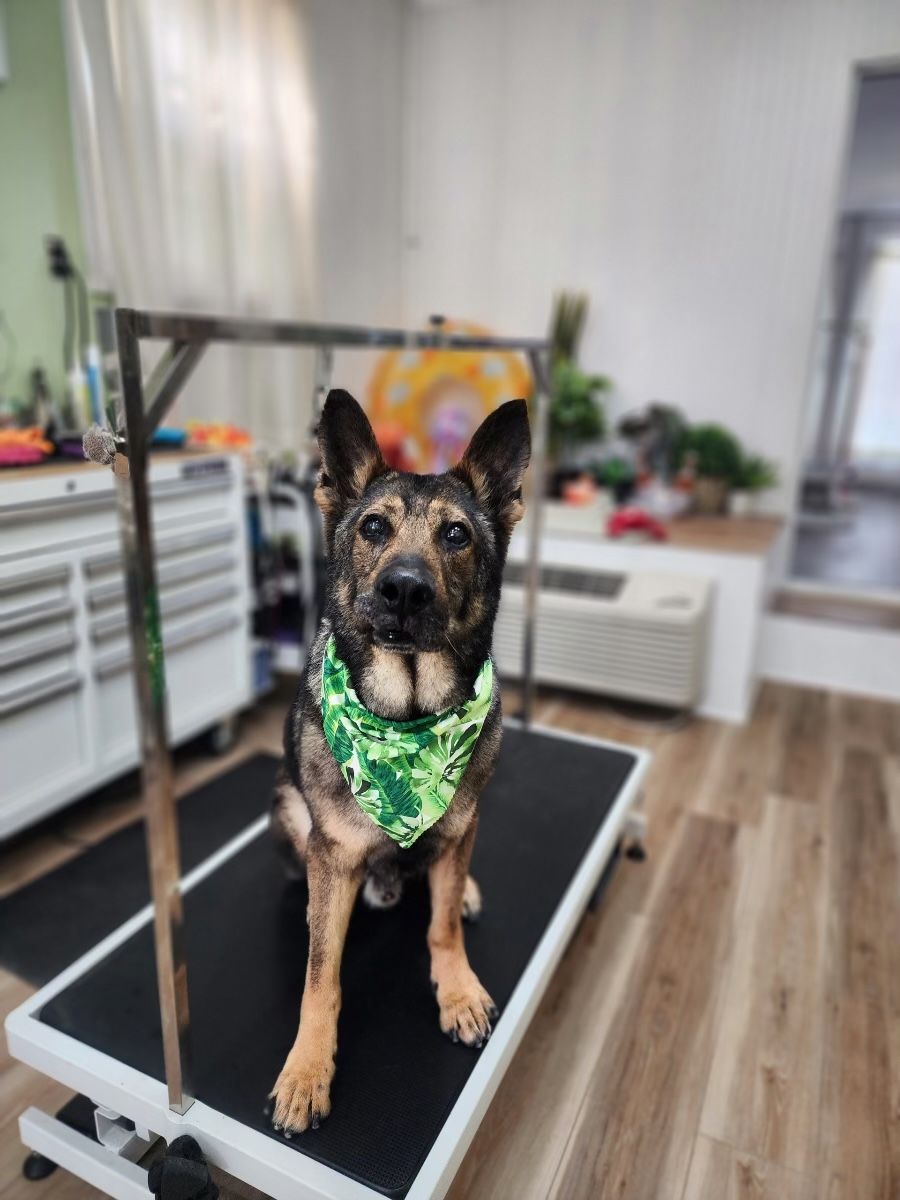
Bryan recalls, “After I reached out, Chris got back to me to say that they would reimburse all the money we’d spent on Drago’s treatment so far and that War Dogs would cover the remaining costs directly with the vet hospital.”
After a long period of recovery last year, Drago had a really good spell of health until a couple of months ago, when Bryan had to leave again for a month of training. “My wife spotted the signs straight away and took him back to the vets. I couldn’t believe his skin was so reactive to my leaving him. It really broke my heart.”
Drago had a long road to recovery but thanks to lots of TLC and some strong medication, he is much better. “There have been a few bad moments where his body has reacted badly to the steroids, because of his age, but he is in a really good place now and is back to his old self again.”
Drago is always going to have skin flare-ups, but thanks to US War Dogs, he receives the medications he needs.
Bryan said, “Drago, myself and my family are forever grateful for you guys and CANNOT thank y’all enough!”
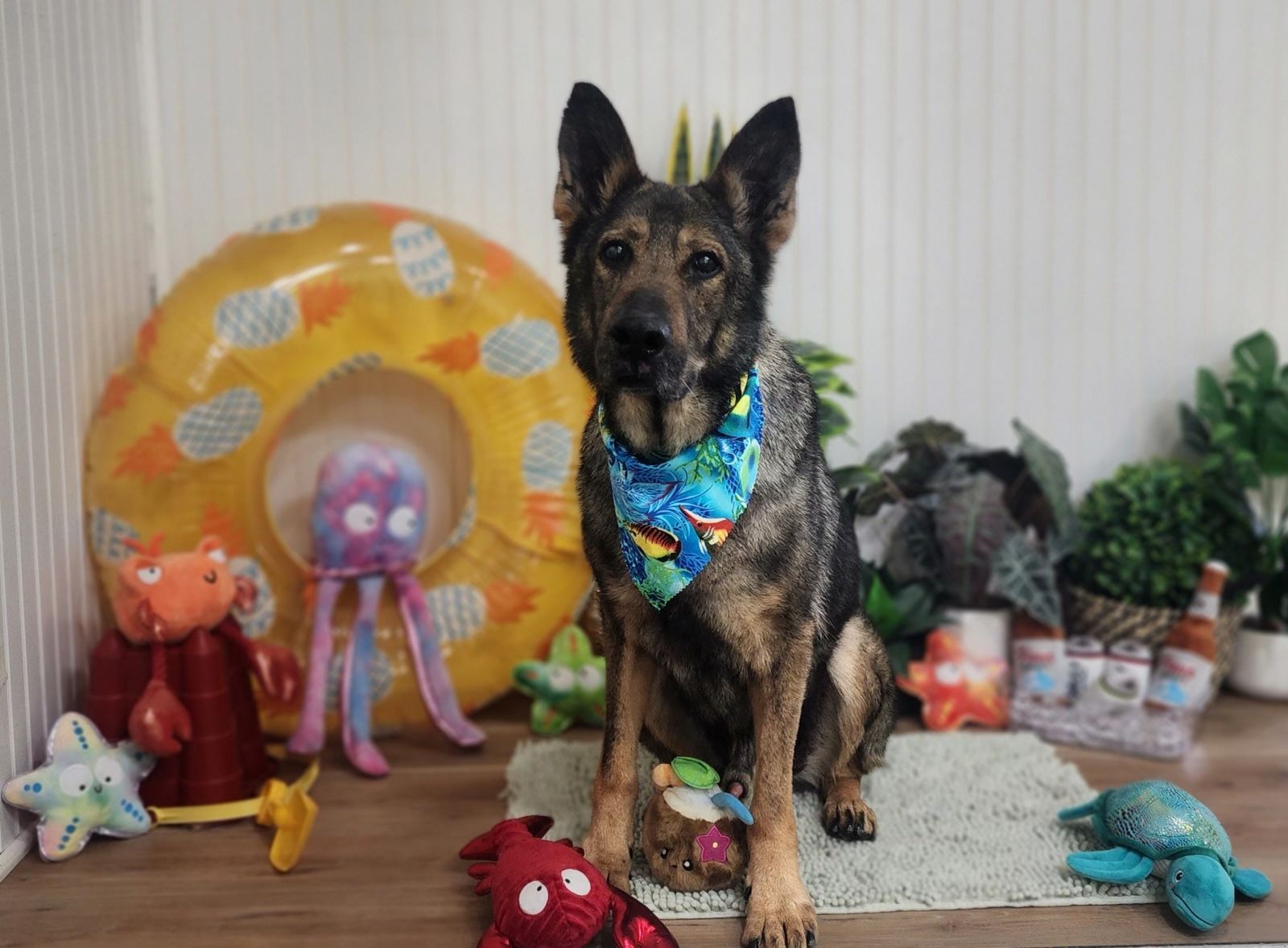
Welcome to the Pack, Vuk!
Our Rx Program is the entry point for all retired MWDs whose owners register with us to receive help. Often, owners don’t need to take advantage of the service straight away – which covers the cost of prescription medications through Curexa Pharmacy. But in cases like that of retired explosive patrol detector dog (PEDD), Vuk, a regime of medications was needed right away.
Vuk enjoyed an extremely busy career, certifying in Camp Lejeune in 2018. He was key to supporting a number of US Secret Service missions across the country, protecting political dignitaries and the POTUS.
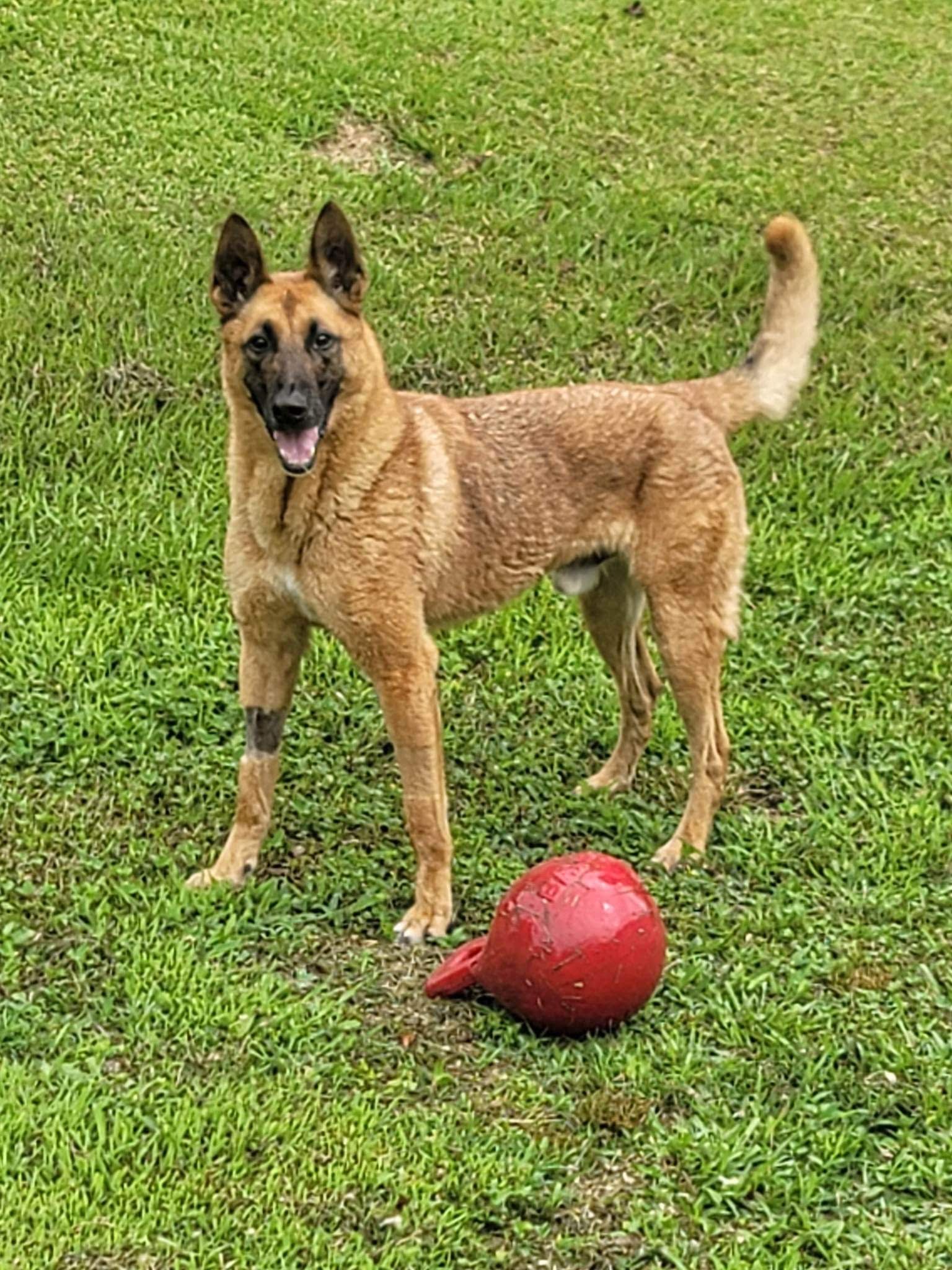
Vuk worked on high level missions, supporting the USSS
But Vuk’s career was cut short, thanks to a case of extreme arthritis which limited his mobility significantly. Vuk retired to live with his adoptive mom, Amanda, at their home in North Carolina, earlier this year. Amanda said: “Vuk is the second MWD I’ve adopted and he is a real sweetheart. He has taken to retirement like a pro, learning to love being a couch potato and running around with my three other dogs.”
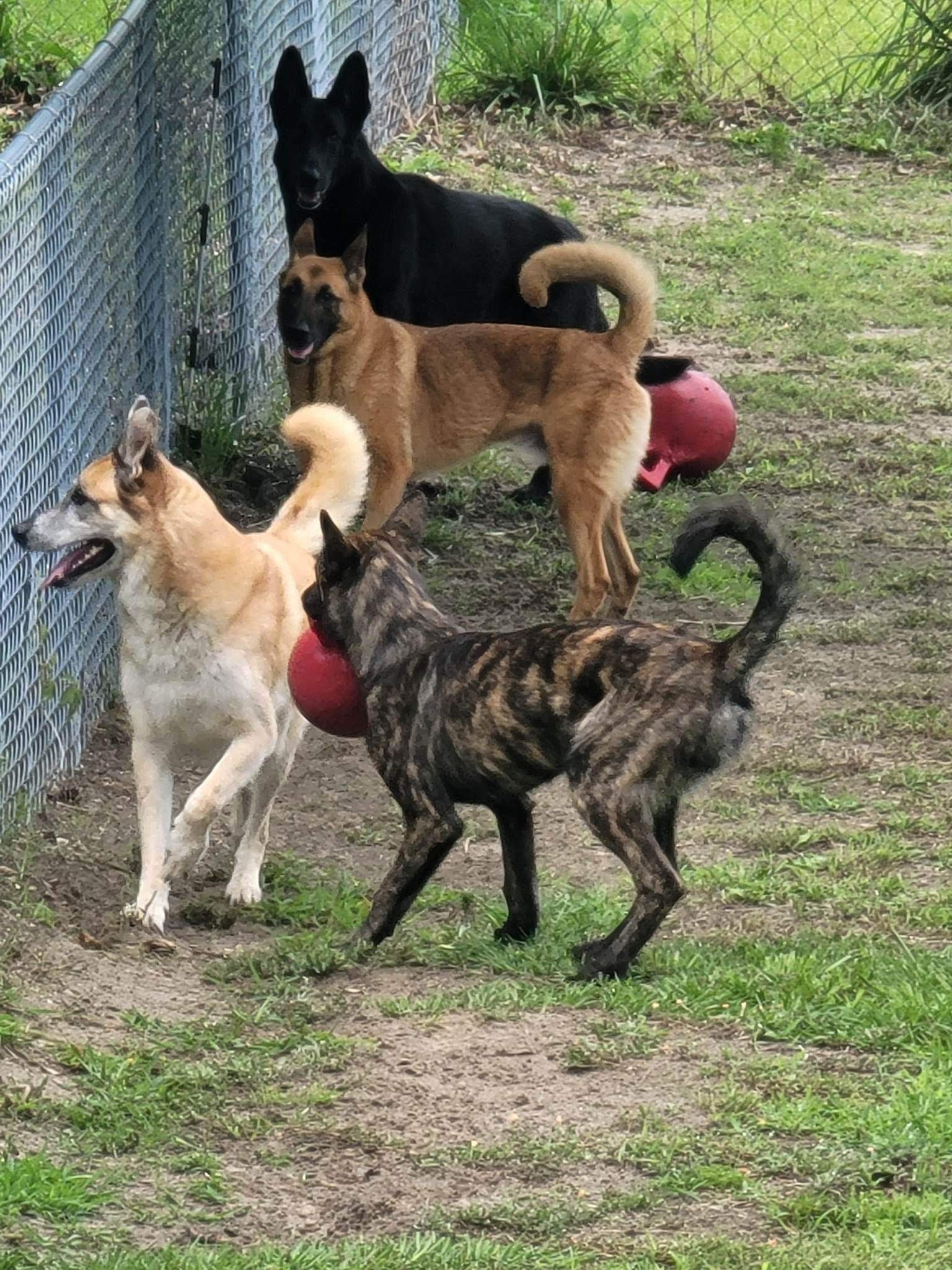
Vuk is firmly part of the pack
Vuk takes three different medications each month, at a cost of over $100. US War Dogs covers that cost, freeing Vuk’s family from the financial burden of taking care of him, after he gave his best years in service to our country.
Amanda said: “Vuk takes a cocktail of meds to keep his joints supple and his pain managed, and I couldn’t be more grateful to US War Dogs for this support. These dogs deserve the best and I am honored to give Vuk a loving home.”
If you’d like to support our mission, click here to make a donation.
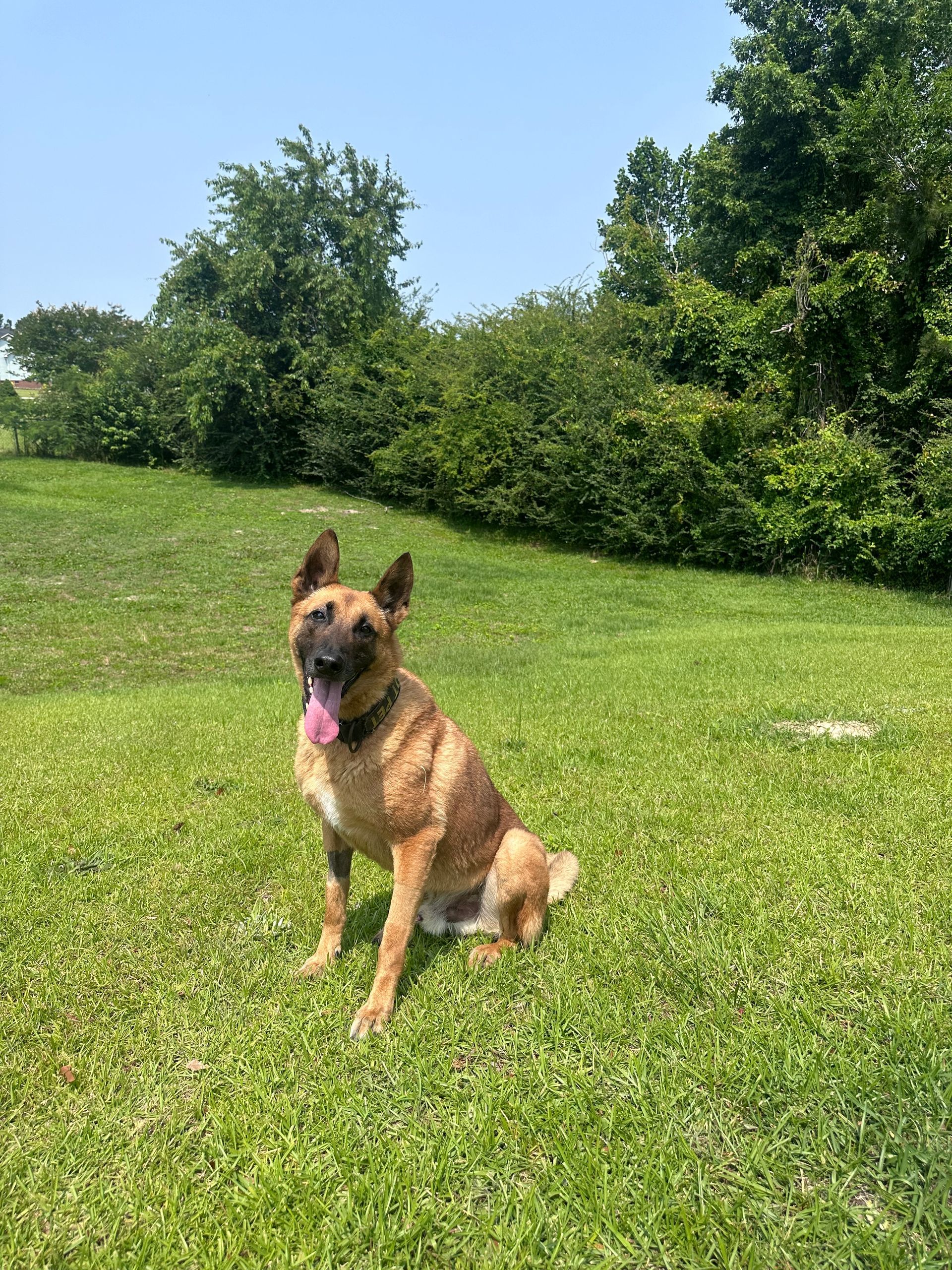
Vuk receives regular meds through our Rx Program
Handler Highlight: Jessica and MWD Mega
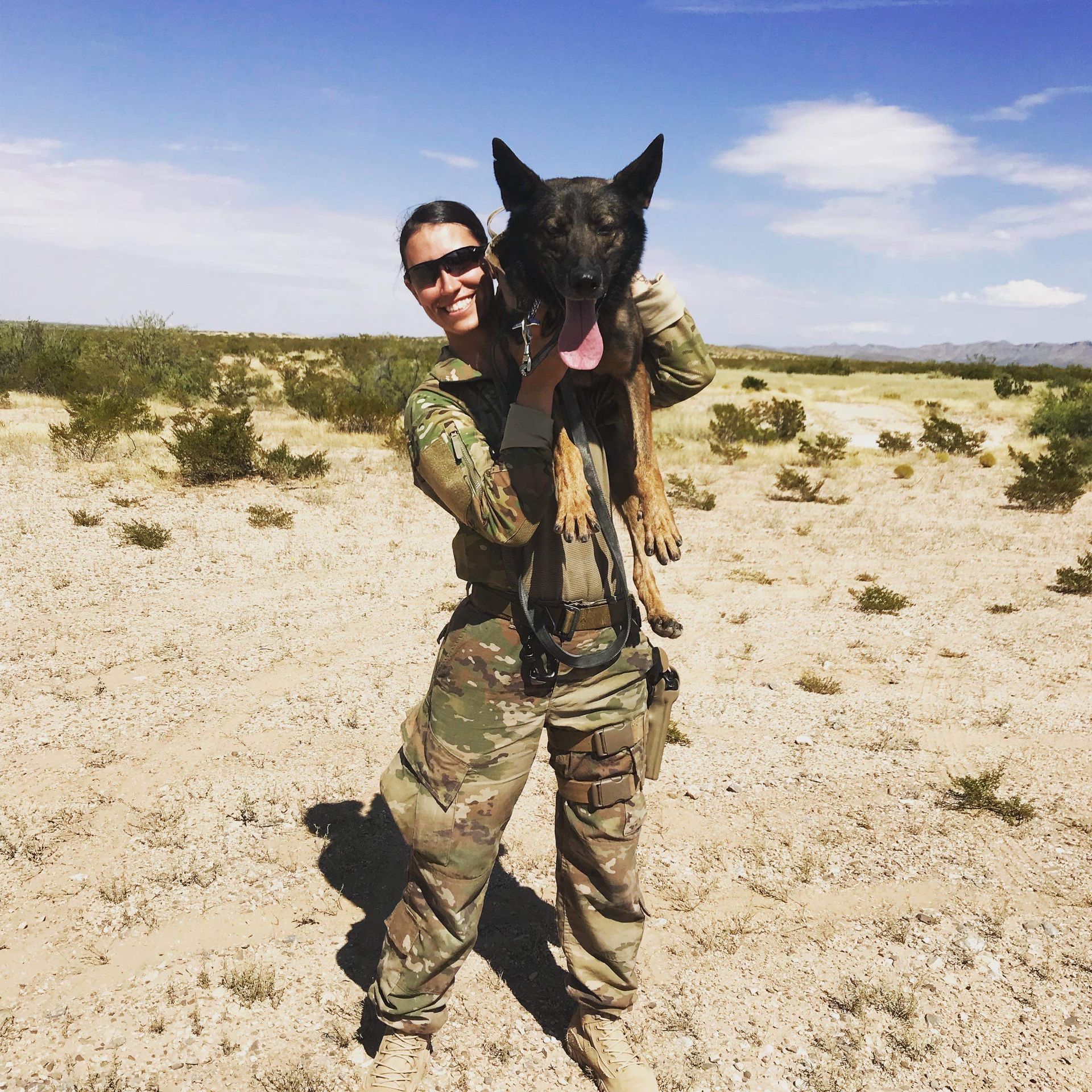
Anyone who has spent time working with military working dogs understands the power they have to entertain, enthrall, and inspire. The love they show and the skills they possess are infectious and their amour is one of the million reasons why the K-9 community is one of the tightest-knit brotherhoods on earth.
We were recently inspired to hear the story of one of our former Rx dogs who sadly passed away recently – Retired MWD Mega R119 and her handler, Jessica. Not only did Mega bring Jessica the love and devotion that only an MWD can – she also inspired her handler and adoptive mom to choose a whole new career path.
Service
Jessica served with the United States Air Force from November 2012 to February 2019. Stationed in Luke AFB in Phoenix, AZ and Altus AFB, OK, Jessica started her military career in the security forces before transitioning to K-9, where she would be paired with patrol explosive detector dog (PEDD), Mega.
“Mega was assigned to different handlers in support of global contingency operations alongside the US Secret Service and Joint Department of Defense Operations, which included presidential security”, Jessica explains. “As part of those key duties, she dedicated countless hours to explosive detection, executing more than 1,440 random anti-terrorist measures; safeguarding 12,500 military and civilian personnel.
“Mega also deployed to Qatar, Kuwait and Jordan in support of both Operation Enduring Freedom and Operation Inherent Resolve. Needless to say, she was a hero who served honorably!”
Jess and Mega served side by side for seven years
Shortly after their last deployment together, Mega began showing signs of arthritis, lower spine disease and hip dysplasia, all of which required her to retire from military service. Jess was given the chance to adopt her, which she jumped at. In 2019, as Mega was preparing for retirement, Jessica transitioned away from the Air Force to pursue her dream to study to become a veterinarian. She said: “That was a big year for both of us, but I was so thrilled to bring Mega home to live out her remaining years with me. During our time working together, we had formed an unbreakable bond, but as time passed with Mega sharing a home with me, that bond grew extraordinarily strong.”
Jessica enrolled Mega into US War Dogs’ Rx Program, which covered the cost of the medication to keep the pain caused by her various conditions at bay. “It was definitely a load off my back to have Mega’s medications taken care of, particularly as a full-time student. It was heartwarming to know that organizations like War Dogs existed to support these beautiful animals, who give their best years in service to the military.”
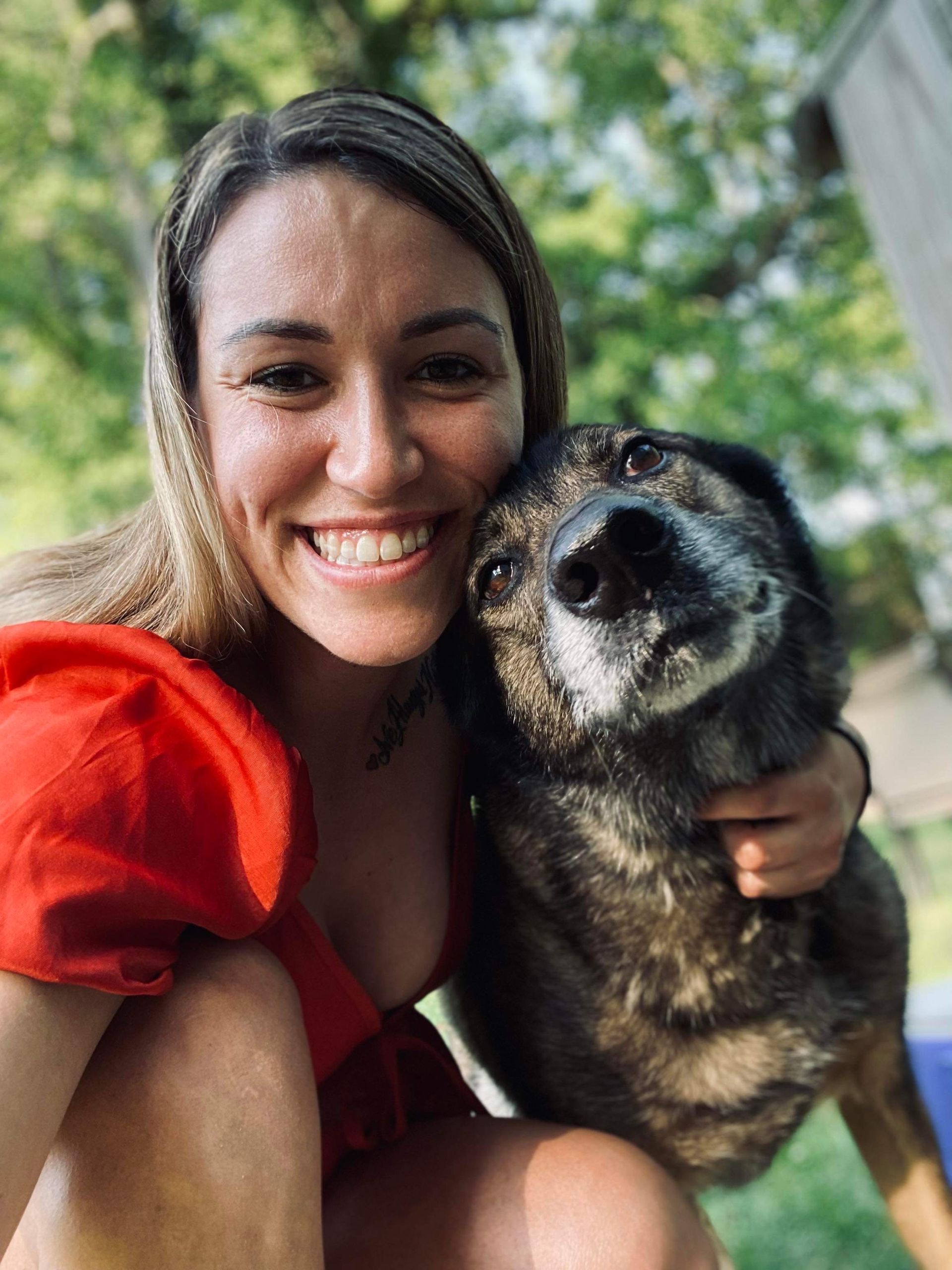
Mega enjoyed the very best retirement with Jess
“As anyone I worked with and they will tell you that I treated Mega more like a princess than an attack dog – and I won’t deny it! I would have done anything in the world for her and continued to do just that until her time on this earth ended.”
A Mega Inspiration
Jess’s time as an MWD handler helped her to gain an invaluable appreciation for these incredible dogs and the contributions they make to our nation’s military services. “Being a K-9 handler provided me with amazing experiences and some of my proudest moments. Deploying with Mega was one of those moments – seeing her execute daily operations filled me with pride. We conducted over four thousand vehicle searches and searched ten tons of cargo to protect $3 billion dollars’ worth of assets and over two thousand personnel. Mega’s skills made a genuine difference – she was incredible.
“Being a K9 handler in the Air Force inspired me to become a military veterinarian. Most importantly, what inspired and motivated me to this very day to go into the veterinary world and continue to accomplish my goal to become a military veterinarian, is Mega. Without Mega, I would not have been able to see how special and how important these military working dogs are.
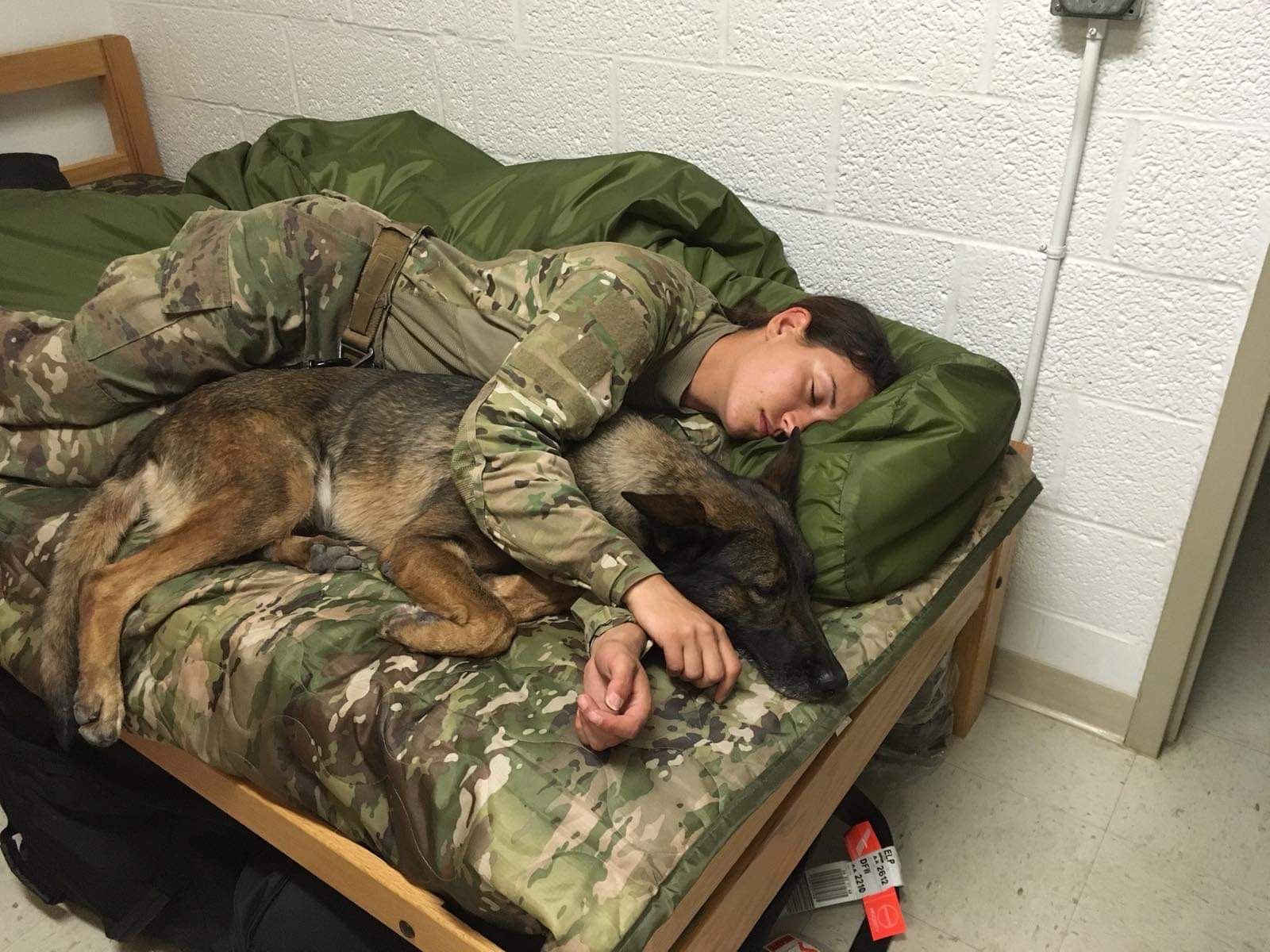
Jess’s career in veterinary medicine has been inspired by her bond with Mega
“Our bond was out of this world, and it is unexplainable. The love and experience Mega gave me helps me to empathize with the dogs I treat now, because I know exactly what they are going through on a day-to-day basis. I also want to help these dogs to do their job and then leave the military so that they can actually have a retirement like Mega did.
“Mega will forever be a part of me and she changed my life for the better. She is the reason I am on this path and I am doing it for her.”
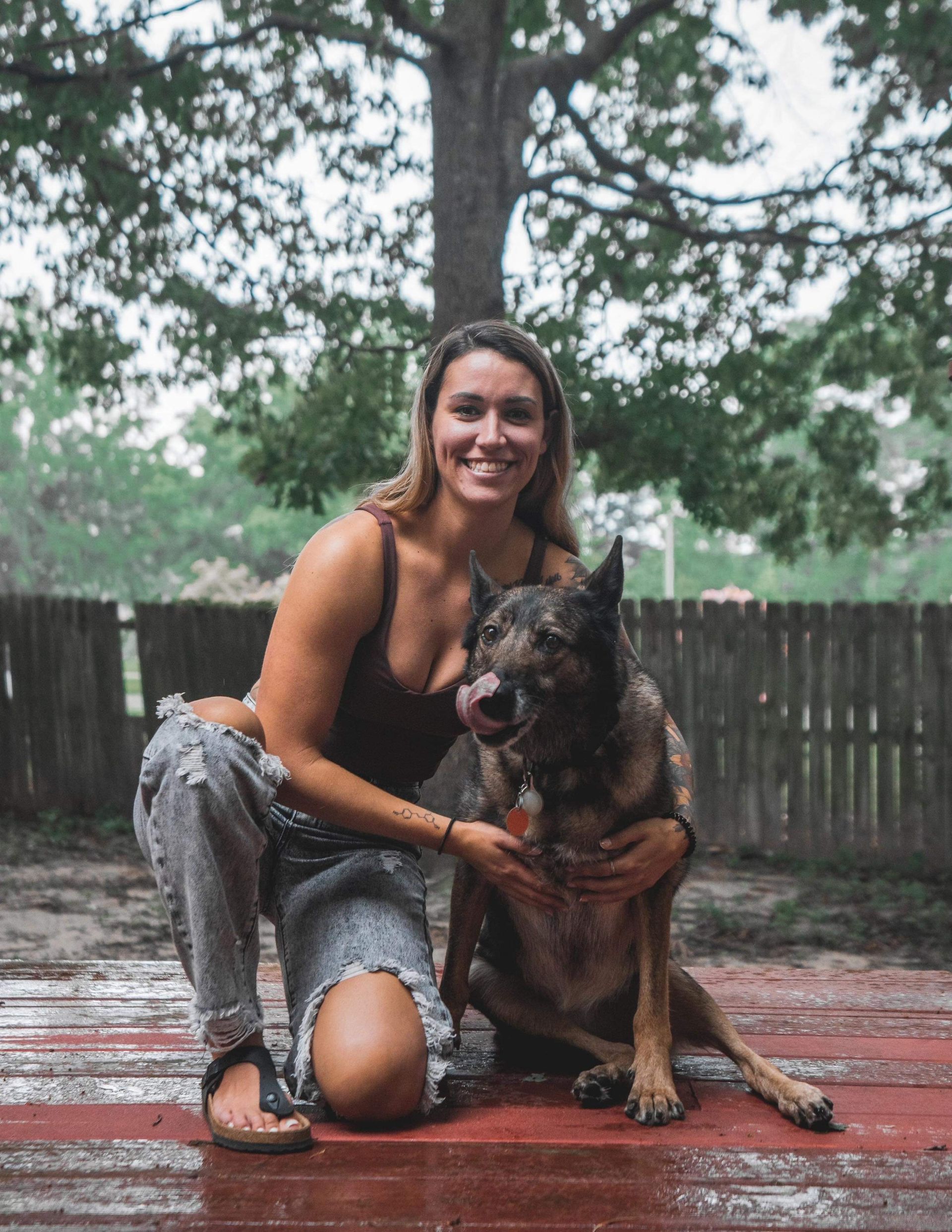
Always beside you – Mega’s memory will live on through Jess’s work
JACK’S JUMPING AGAIN, THANKS TO US WAR DOGS
Retired US Air Force patrol and explosive detection (PEDD) dog, Jack has been adjusting to life as a tripod after a nasty infection meant that he needed his hind leg amputating. Through US War Dogs’ partnership with Compassion First, we were able to facilitate Jack’s treatment pro bono, alleviating the financial burden on his adopted owner and former military service member, Amanda. Here’s Jack’s story.
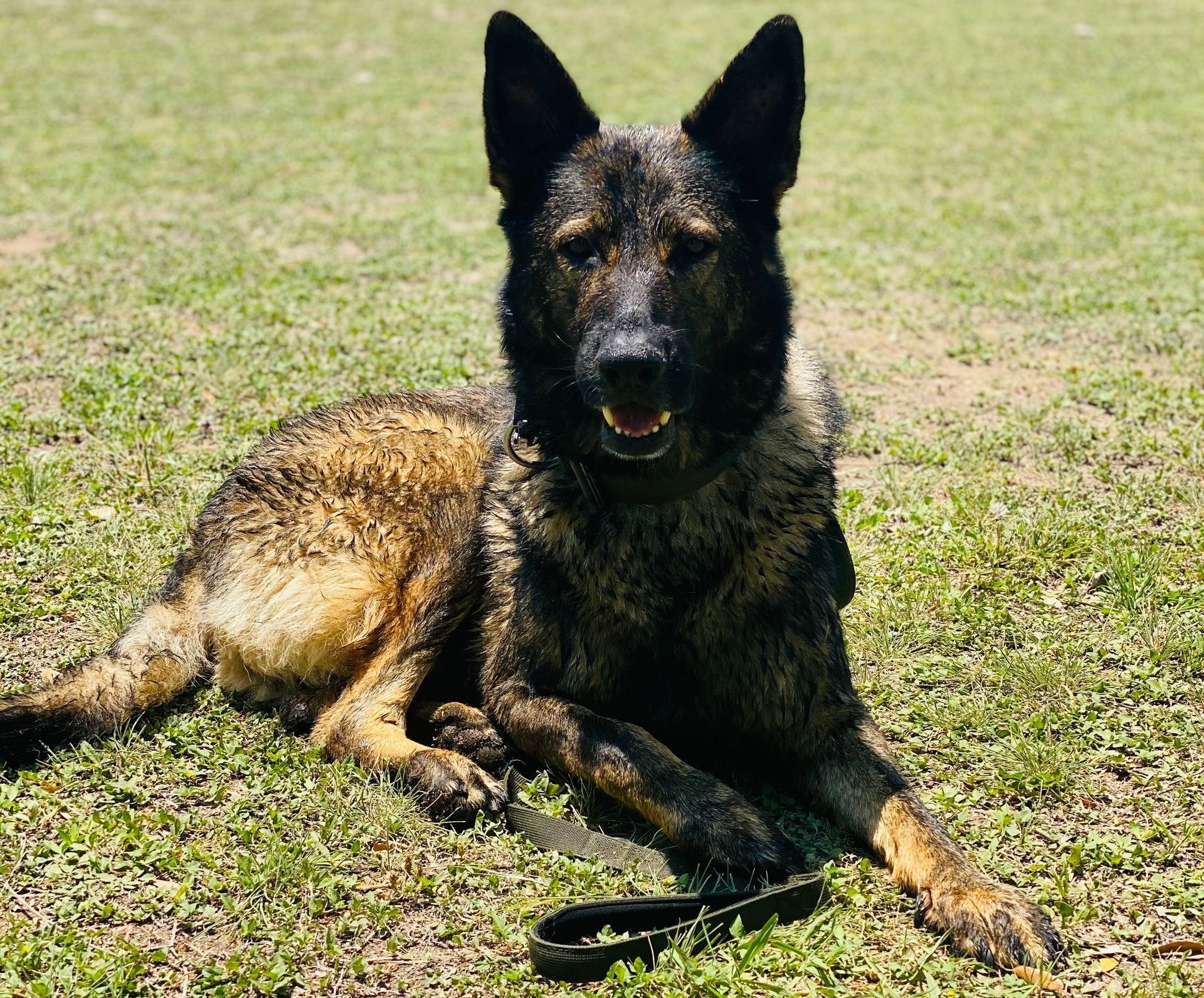
“Jack was trained as a bomb dog”, explains Amanda, who lives in San Antonio, TX. When we first got him home, I walked him to the mailbox and he started sniffing and sat down. He had found a piece of firework and he was indicating on it. Old habits die hard!”
Jack and Amanda’s paths crossed when she was working as an animal caretaker for the MWDs at Lackland Air Force Base. Jack was admitted to the veterinary unit on his return from Guam, where he was stationed when he broke his leg in 2021. Amanda explains: “Jack had corrective surgery to try and save the leg, which he broke while bite training. But when he was flying home, he escaped from the crate and was running around on the plane. He was a sneaky boy to get out like that and his mischief could have killed him if he’d have been an older dog. He was very lucky.”
Despite the best possible care, Jack continued to have problems with his leg. “He had an infection and was resistant to the medication, so the infection was getting worse. The vets tried to stabilise the leg by inserting a metal rod because the bone was being eaten away.
“The worst part was that you could tell he was in pain. He’s only five years old and although he still wanted to play, you could see it was making him miserable.”
The perfect storm for Jack came when the infection, which continued to resist medication, caused the bone to fuse to the rod that had been fitted to stabilize his leg. “His issues were so complex that the only option now was amputation. It was a scary prospect but it was Jack’s only hope.”
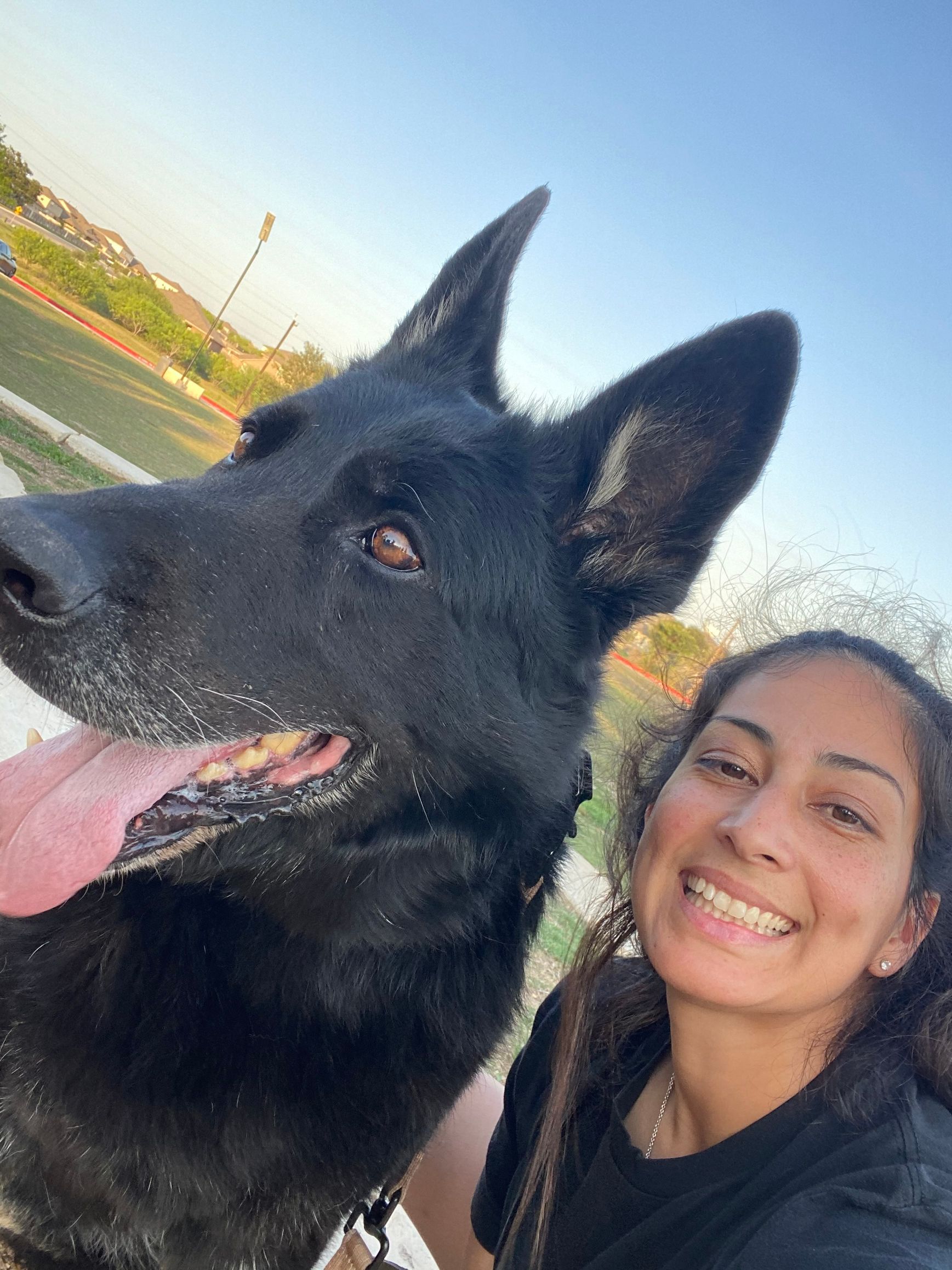
Amanda reached out to US War Dogs to see if they could help with the surgery. “We were quoted $2,000 for the surgery, which is money we don’t have laying around.”
But thanks to US War Dogs’ partnership with Compassion First, the team were able to assist. “I called our contact at Compassion First to see if there were any veterinary hospitals local to Jack that would be able to help with the surgery”, explains US War Dogs president, Chris Willingham.
“Our partnership began with Red Bank Veterinary Hospital in New Jersey back in 2014, but when they were bought out by Compassion First – who owns over 100 hospitals across the US – we have been able to reach out to see if local veterinarians would be willing to assist with discounted or pro bono surgeries for retired MWDs.”
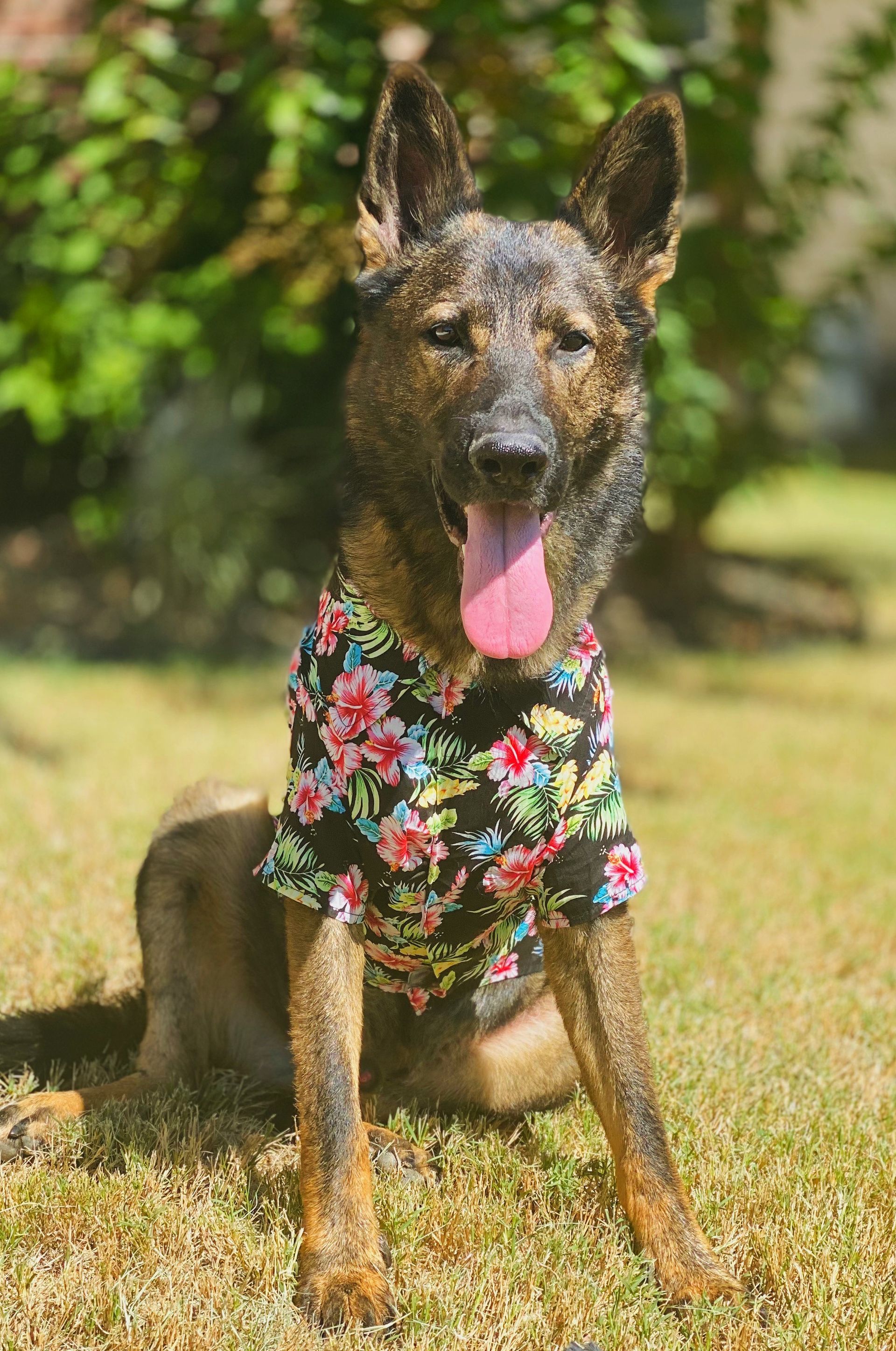
Chris reached out to Nicole Garcia at Mission Vet Specialty Emergency, who was happy to perform the surgery on Jack.
“Chris confirmed everything and we called to book Jack in. I dropped him off in the morning at 7am and I didn’t get to pick him up until the next day. They called me before and after surgery and were so great at keeping me informed.”
The team informed Amanda that the amputation was fairly normal but she was still concerned as to how he would adjust. “He rested for the first two weeks and we had to make sure he stayed downstairs (where he normally sleeps). He did really well and recovered beautifully.
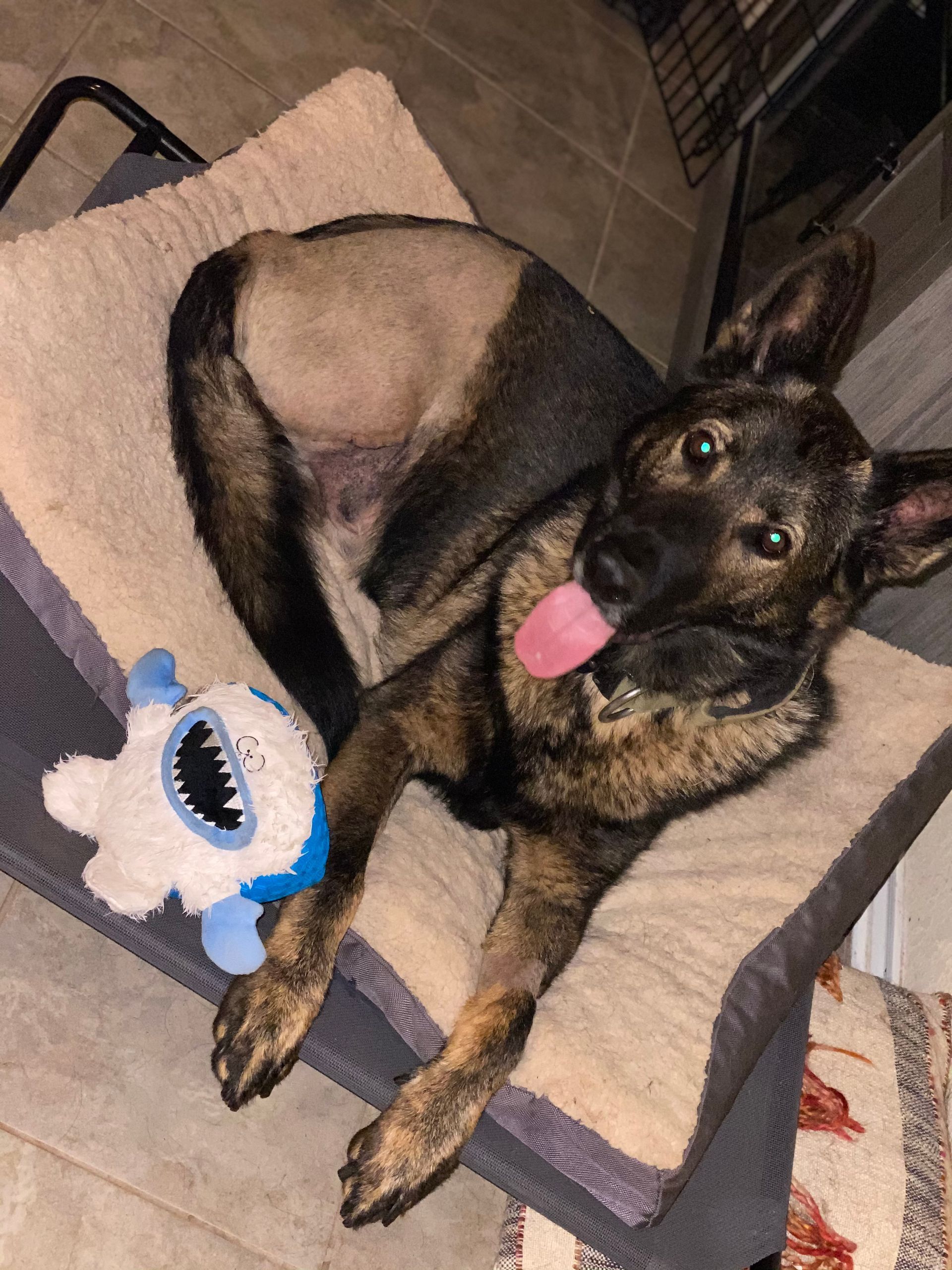
“After a couple of weeks, he was like a new dog! Jumping and running around like a puppy – it was so great to see.”
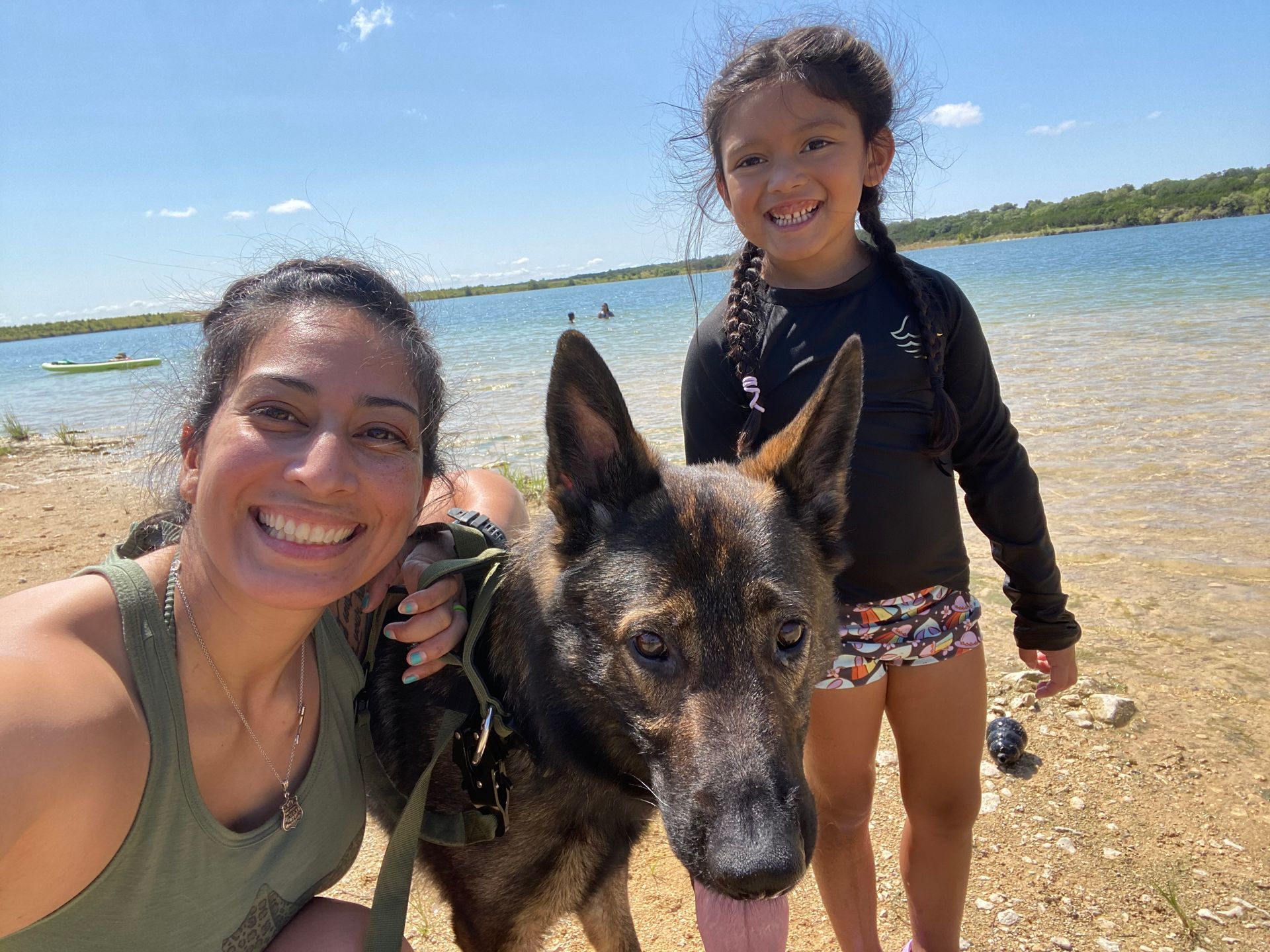
Jack has taken to life on three legs with all the zest and enthusiasm expected from a GSD. Amanda said: “He is still super sweet and friendly. It actually takes people a while to notice that he only has three legs. He hasn’t lost his youthful bounce either – sometimes I race him to the mailbox and he still beats me!
“Whenever I take him with me to my daughter’s school, he loves kids. He thinks everyone wants to pet him.”
And what does Amanda think of US War Dogs? “The team are amazing and they pulled out all the stops to take care of Jack. They wanted updates on how he was doing and have been super sweet. I am so grateful to Mission Vet and to US War Dogs for taking such great care of our boy.”
Here’s to many happy years on three legs, Jack!
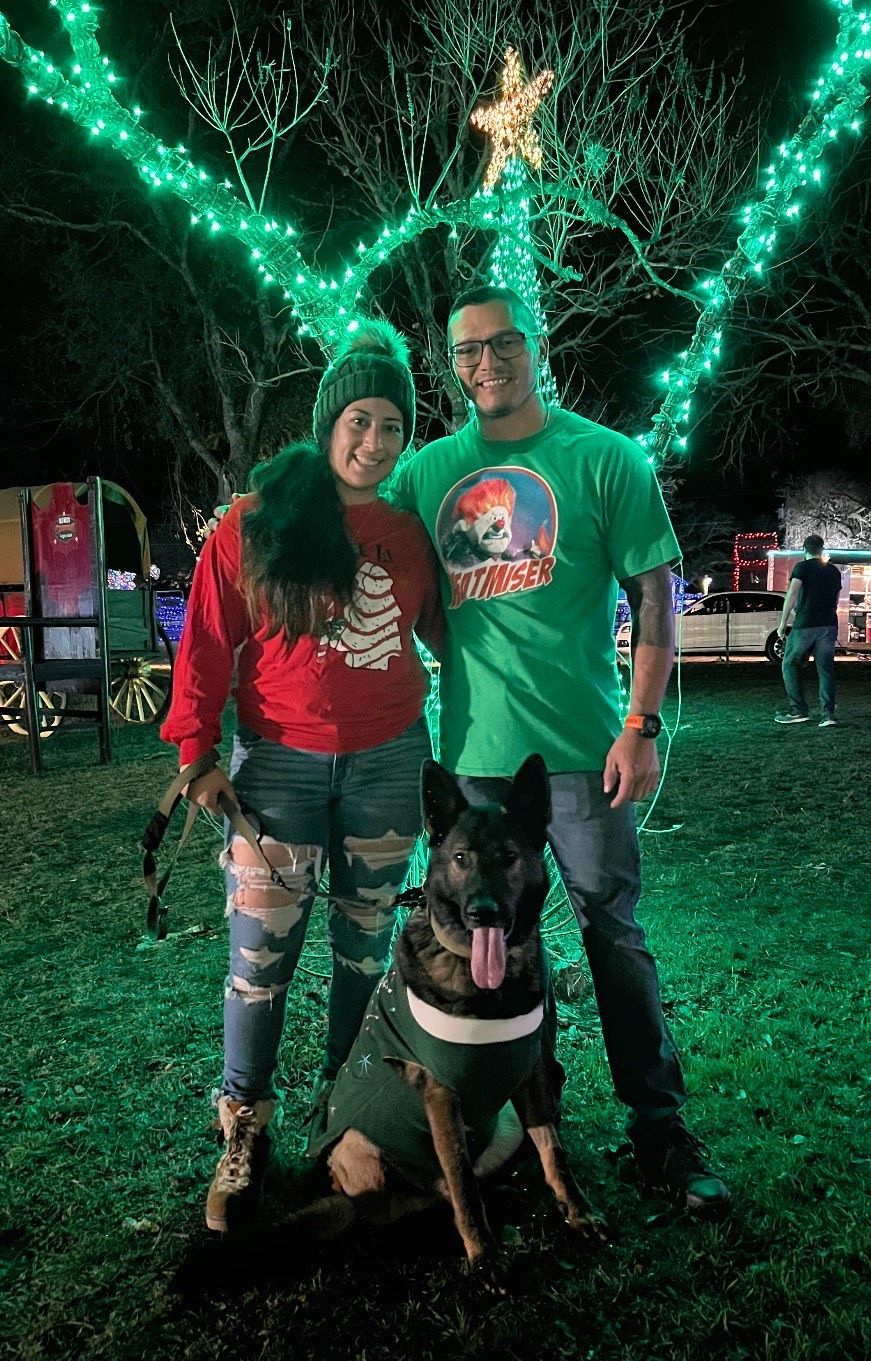
Rony’s Second Chance
As part of our commitment to honor and support MWDs, US War Dogs runs a host of programs that provide financial support to the families of retired MWDs, to assist with their veterinary care. Since 2014, we have worked in partnership with the fantastic team at Red Bank Veterinary Hospital in New Jersey, who have helped us to provide specialized care for MWDs with a wide range of health issues.
Red Bank’s parent company, Compassion First, has also been very generous in recommending veterinary hospitals that have been willing to provide similar services to Red Bank, for MWDs who can’t make the journey to New Jersey.
Rony’s story showcases how the program works, as well as highlighting the precious bond a handler has with his dog – even after spending time away from each other.
Rony’s Story
Rony was trained at Lackland Air Force Base, TX, as a patrol explosive detection dog for the US Air Force and was paired with handler Chris in 2018. The dog team were posted to Andrews Air Force Base, MD, and often supported Secret Service missions and performed countless sweeps of Air Force One and Air Force Two.
“We travelled all over the US together and even got to go to Jerusalem in support of presidential visits”, explains Chris. “Rony was a great worker: Diligent and calm at work, who loved to play and be petted when the working harness was off.”
After two years of working together, Chris shifted roles from dog handler to trainer and it was time to hand Rony’s leash onto another handler. “There was no doubt that Rony was my dog”, explains Chris. “My wife Renee and I were always going to adopt him when the time came.”
After requiring major spinal surgery in 2020, Rony returned to his duties for a further two years before the Air Force decided it was in his best interests to retire. “They called me and asked if I still wanted to adopt him. It was an easy decision”, recalls Chris. With the help of Mission K-9 Rescue, Rony made the journey from Maryland to San Antonio, TX where Chris was now stationed – and the pair was reunited in September 2022.
But their much-anticipated reunion was interrupted when Chris noticed something wasn’t right with Rony’s jaw. “As soon as I put my hands on Rony, I knew something was wrong. I knew every inch of this dog and I could tell that all was not well.”
“We made an appointment with the vet but Rony seemed fine in himself, so we weren’t overly concerned” explains Renee.
A month or so later, Rony’s bottom teeth started to separate and looked sore. “We took him to an emergency vet, who identified an aggressive mass in his jaw, removed six teeth to make him comfortable, and sent a sample away to the lab for testing. They weren’t certain what the mass was, but they knew Rony would need additional surgery to remove the tumor , along with any impacted tissue and bone.”
After the initial emergency visit, Rony was referred to a local surgeon who informed Chris and Renee that there was a two-month wait for surgery and oncology treatments with them. “We were feeling pretty desperate and scared at that point. Because of the aggressive nature of the tumor, we felt that Rony wouldn’t have two months to wait for surgery. We needed to act fast for him.”
“Rony was already enrolled in US War Dogs’ Rx Program, so we reached out to the organization to see what our options might be.”
US War Dogs president, Chris Willingham, said: “Having chatted through Rony’s case, I knew he was a strong candidate for our Emergency Care Program, but paying for the surgery wasn’t our only concern. Rony needed surgery fast and with his current vet citing an eight-week wait for treatment, we were able to make some calls to our network to find a quicker solution.”
Chris put Renee and Chris in touch with Dr Jacqueline Cavalcanti at Austin Veterinary, Emergency and Specialty (AVES) clinic, who agreed to take on Rony’s case as part of US War Dogs’ Specialized Care Program. “Dr Cavalcanti was a godsend”, explains Renee. “Chris had so much anxiety about what Rony had to go through, but she was so calm, experienced and positive, she set both of our minds at ease.”
Within two days of contacting Dr Cavalcanti, Rony was undergoing the life-saving surgery he needed to remove the tumor, along with his lower jawbone and all but two molars on the right side. Some teeth on the left side of Rony’s mouth also needed to be removed as a result of the tumor, leaving him with a shortened lower jaw.
Rony’s dad, Chris, said: “Dr Cavalcanti also did some fantastic work to reconstruct Rony’s jaw to allow him the ability to eat and drink comfortably. We were so worried about how his quality of life would be impacted but the skill and dedication of the team in removing the cancer and rebuilding his face in this way, were incredible.”
Rony returned home just a couple of days after surgery and was about to face his biggest challenge to date. Renee explains: “The poor boy needed to spend four weeks in his cone and needed complete rest to help everything heal. We hand fed him during that time too, to help him get used to his new normal.
“Despite everything though, Rony’s loving personality didn’t change at all. We are so proud of how he has handled everything.”
The team at AVES sent Rony's removed jaw to University of Colorado for extensive testing, which determined that he had basal cell carcinoma. The surgical team had managed to achieve good margins on the bone and narrow margins on the soft tissue, so Rony was given a clean bill of health, with no follow-up treatments required.
Chris reflects: “Rony has been through so much but, thanks to Chris and US War Dogs, he has been able to beat this terrible disease, leaving him free to enjoy his well-deserved retirement with us. Our local vet here in San Antonio will monitor Rony every three month to check he remains healthy but apart from that – and his dangly tongue – you’d never know that he’d survived a brush with death.
“We are so grateful to US War Dogs for everything they have done for us and Rony. They really did save his life and for that, we can’t thank you enough.”
The Scooby Snack That Left Pedro Sick
Retired US Air Force patrol explosive detection dog (PEDD) Pedro got himself into a spot of bother recently, when his mischievous pastime turned into a real pain in the gut.
“He’s always been a knucklehead with eating things he shouldn’t and it’s gotten him into trouble before”, explains Pedro’s former handler and adoptive owner, Tony.
“His retirement was delayed earlier this year when he swallowed something in the kennels that lodged in his gut. I had to wait two months for him to recover from surgery before he was able to fly home to me from Guam.”
Tony and Pedro served two years together in Guam from 2017-2019 – providing security support to their attachment and showcasing the capabilities of K-9 to local military and law enforcement units.
As Tony returned to the US, Pedro stayed in Guam and was paired with another handler, but when the kennel master recommended him for retirement, he called Tony to see if he was interested in adopting him.
Tony was able to retire Pedro in April of this year and he has taken to civilian life perfectly with Tony’s other dog, Nala – a rescue crossbreed, or ‘boonie’, from Guam. “He loves sleeping on the couch with Nala and demands plenty of fuss when he wants it. Pedro also has a huge collection of toys but he loves to chew them and the less hardy toys can end up as lunch.”
When Tony went on a Thanksgiving trip to visit family, Pedro and Nala stayed with a nearby friend. “My buddy has a smaller dog with smaller toys and we think that Pedro must have gotten a hold of one of them and chomped it down. My friend called me to say he was puking and not himself, so I cut my trip short.
“As soon as I saw Pedro, I knew something wasn’t right so I took him straight to the emergency vet, who x-rayed him when I explained my suspicious.”
Tony correctly identified that Pedro had eaten a toy that had lodged in his intestines. Emergency surgery to remove the toy was Pedro’s only option.
Tony had already been asked to pay a $1,500 deposit so when he reached out to US War Dogs to see if Pedro qualified for our Emergency Care Program, he was really hoping for some support with the remainder of the bill.
“I would do anything for my dog and there was no question I would pay whatever needed to see Pedro receive the care he needed. But with the help of US War Dogs, my financial worries were taken care of and I am so grateful to them for their amazing support.”
Chris Willingham, president of US War Dogs Association, said: “Cases like Pedro’s show exactly why we set up this Program: To help dogs and their families out in times of crisis. Tony and Pedro have served their country faithfully and Tony continues to do so in his role as an active-duty Air Force dog handler, so we were thrilled to be able to help him out.”
As for Pedro – Tony says he was back to his normal, goofy self as soon as he came round from the anaesthetic. “He gets his staples out this week and is raring to go. Keeping him calm so he doesn’t bust his stitches, seems to be my biggest worry!
“I’ve Pedro-proofed the house to make sure that anything he deems edible is well and truly out of the way!”
We wish Pedro and Tony a very Happy – and incident-free – Christmas! Thank you both for your service!
Providing Support with US War Dogs’ Rainbow Bridge Program
Our Rainbow Bridge Assistance Program exists to help handlers and families of retired MWDs to cover the cost of euthanasia and cremation when the time comes to say goodbye.
The program recently supported Marla and her husband as they were forced to make the heart-breaking decision to say goodbye to their retired US Army Patrol and Drug Detector Dog, Menine.
Trained at Lackland Air Force Base, Menine completed over 20,000 barracks checks, searched vehicles at checkpoints; patrolled countless hours with his handlers, and was even deployed to Vicenza, Italy for a short period of time. When Menine was eight years-old, he was medically retired with myelopathy and arthritis.
Marla said: “In late 2016 my family and I were interested in adopting a soon-to-be retired Military Working Dog (MWD) German shepherd while we were stationed in Kaiserslautern, Germany.
“During our visit, the Kennel Master told us that they also had a Belgian Malinois that was already cleared for adoption, had not officially worked in several months, and was ready for a new family. We decided to meet him and see what he was like. I’ve heard the saying that you don’t choose your dog, your dog chooses you. Well, that’s exactly what happened to me. He looked so intimating coming out of the kennel with his muzzle covered in painted fangs, but he had no qualms about coming up to me and leaning his head against my leg and gazing up at me. It was like he was trying to tell me something. I knew there was something different about this dog.”
The kennel master took Menine out onto the training field and showed Marla what he had been trained to do. He ran through an obstacle course with lightning focus and concentration and took off after his beloved tennis ball, returning it to the kennel master’s feet, ready for the next round.
A soldier wearing a bite suit waddled out onto the field and on command, Menine launched at him. Marla recalls: “I was in awe of the speed, tenacity, and energy of this animal. And, to top it off, when he was finished, he would come right back to me and lean his head on my leg again. That was it. I told my family in the car on the way home that the Malinois should come with us.”
Menine enjoyed the very best of retirements with Marla and her family:
“We showered him with love and affection by giving him his own spot on the couch, in the car and on our bed. He had loads of stuffed animals (most were beheaded), towels, cardboard boxes that he would playfully shred and rip apart, treats from his favorite store and hours of walks in the woods.
“Menine loved to go everywhere with our family and we tried not to disappoint when going on adventures at a dog’s pace. He rode in a three-man canoe on Lake Bled in Slovenia, strolled the gardens of Linderhof Palace in Germany, visited Hohenwerfen Castle in Austria, played in Wallace Falls in Washington State, ran on Cannon Beach in Oregon, and rode cross-country from Washington to Florida. Just about every weekend, Menine would be hitting a trail, a park, a field, or a playground to do some new exploring and get in some new sniffs! Our family filled his days with constant pets, evening massages, nightly cuddles, heavy praise, and our undivided attention.
“For the past six years since we’ve had Menine, my husband and I decided that I would be a stay-at-home dog-mom, so that I could remain at his side to give him the retired life he deserved. I always felt it such a privilege to give back to him the way he gave himself for us, for our service members, and for our country.”
A week before he turned 14, Menine’s health began to rapidly decline. Marla said: “He was getting very thin, weak, heavy bouts of panting and his tongue began to lose color. After a visit to the vet, we learned that Menine was anemic and that two organs were enlarged and displaced in his body. The vets couldn’t run any tests on him for cancer because his blood counts and platelets were too low. A blood transfusion was seen as the best route to help bring up his strength and get him to a point where more could be done to find out what was going on.
“Even after that, his numbers only increased slightly, still not enough to keep him out of an emergency situation” recalls Marla. “Every option came with risks that we weren’t willing to take on behalf of Menine’s health. After much consideration and a lot of prayer, we decided that the best thing to do was have Menine laid to rest. We knew our boy couldn’t go on being the strong, brave soldier he was.”
Marla had reached out to US War Dogs to seek assistance with some of his potential treatment but as the news came back that nothing could be done, the offer of help through our Rainbow Bridge program was made.
US War Dogs president, Chris Willingham, said: “Many of us will have experienced the crushing weight of making the ultimate decision in the best interests of our dogs. Nothing will lessen those awful moments and the days that follow, but if, as an organization, we can do something to ease the burden for the families, we are honored to step in. It is our final salute to the MWDs who have served our country faithfully, just like Menine.”
Marla said: “It has been, by far, the hardest thing we’ve ever had to do. I thank God that we were able to be there to love on him, whisper in his ears, kiss his face, and hold him in his final moments. The most affectionate, brilliant, and tenacious dog who changed our world was no longer suffering.”
Following Menine’s passing, Marla shared with us a short memoir about Menine’s life which ended with a short tribute to her boy:
The best boy ever! We love and miss you so much. We know that you’re enjoying running around with strong legs and a healthy body, eating “chicky” and policing all of your friends. It was such an honor having you as our boy. What an amazing life you had! You set the bar so high! A slow salute rendered from your best Daddy and a sweet kiss from your favorite Momma. Well done Menine! Guardians of the Night. EOW: SFC (R) Menine (P637) 25JUN22/ 1434hrs.
For more information about US War Dogs’ Rainbow Bridge Program,
Click Here
US War Dogs – Here for Dogs Like Ivan
Retired US Air Force Dog, Ivan, served eight years with the 7 th Security Squadron before retiring to Oklahoma with adoptive ‘dad’, Mark. Mark is the evidence supervisor for his local police force, who supplied him with a truck complete with K-9 compartment, so he could bring Ivan to work. “We hang out together all day”, says Mark, who says that German Shepherd Ivan is now living the life of luxury and how loves plenty of cuddles.
Ivan, who spent several years on overseas deployments to the Middle East, suffers with hip dysplasia and ear problems. His sight is starting to fail too, although that doesn’t stop him for living life to the full.
Ivan is enrolled on our Rx Program and receives a number of medications that would cost Mark in excess of $600 each month.
“Your meds are a godsend” says Mark. “I cannot thank you enough for everything.”
US War Dogs Service Medal Program
Our Service Medal Program provides the chance for dogs retiring out of the military to receive a Service Medal, just as their human counterparts do across all branches of service. This keepsake serves as a memento to their families will often be treasured for many years to come.
We were honored to recognize retired US Marine Corps multi-purpose canine (MPC) Ziggy, with his Service Medal, earlier this year.
Ziggy deployed five times with his handler, Sean Hemphill. Over those deployments, Ziggy took part in over 50 heliborne raids; found 43 weapons caches, 12 homemade explosive facilities, one vehicle-borne improvised explosive device (IED), 330 anti-personnel IEDs and over 5,000lbs of explosives.
Ziggy’s tenacity and skill undoubtedly saved countless lives and we are thrilled that he is now able to relax at home with his former handler and adoptive dad, Sean.
It’s true that Ziggy is no stranger to decoration. In March 2022, he received the Animals in War & Peace Medal of Bravery, for his outstanding career and unwavering bravery.
We thank you for your service, Ziggy. Good boy!
Emergency Care Program Saves K-9 Hero Ggarbo
Our new Emergency Care Program was rolled out to provide financial support with diagnostics and treatment for retired MWDs across the country. It is the sister to our Specialized Care Program, which is provided in partnership with Red Bank Veterinary Hospital in Tinton Falls, NJ, but rather than having to travel, owners can access the care their retired MWD needs, in their hometown.
Each case is considered individually, depending on circumstances, but it is our hope that with continued generosity from our supporters, we can expand this program to help more dogs in the coming years.
One recent recipient of our help through this program is Ggarbo, who retired from military service in December 2021, with his handler of three years, Blake. Ggarbo performed a number of domestic security duties, including supporting the US Secret Service with the protection of the POTUS.
Ggarbo was recently diagnosed with a tumor in his mouth, which had spread and required surgery to remove parts of his jaw bone, to stop it returning. Blake reached out to US War Dogs for help and we were more than happy to support them through our Emergency Care Program, which exists to provide financial support to dogs who desperately need specialist veterinary intervention.
Ggarbo is back at home and recovering well from his operation, which was hailed a success by his surgeon. Blake says he’ll soon be able to chew his beloved Kongs again.
Retired MWD Bbutler P283
2010-2021 United States
Marine Corps Base Camp Smedley D. Butler, Okinawa, Japan
Born in February 2009, Belgian Malinois Bbutler served with the US Marine Corps as a Patrol Drug Detection Dog from 2010-2021.
Bbutler was born at Lackland Air Force Base in Texas as part of the US Military’s puppy dog program. He was fostered until he started his military training and on qualifying as a military working dog, he deployed to Okinawa, Japan, in 2010, where he worked until his retirement last year.
Bbutler met his adoptive mom, Jenna, when she attended the US Marine Corps’ basic handlers’ course in 2015. Bbutler was Jenna’s first MWD and the pair worked together for two years. “He was very strong and determined, with a huge amount of energy, so he gave me a decent challenge when I was first learning the ropes as a dog handler.
“As we got to know one another though, he and I were completely inseparable. Being out in Japan with no family or means to get out and about meant that he became my family. Spending time with Bbutler was the highlight of my time out there and our bond was completely unbreakable.”
When Jenna left Okinawa in 2017, she posted her request to adopt Bbutler, knowing that he had a number of years of service left to go. She said: “I always hoped that I would get him when the time came, but while COVID caused delays to him coming home to retire, he got really sick with an autoimmune disease and we didn’t think he was going to make it.”
Luckily for Bbutler, Mission K9 Rescue helped to fly him home from Japan and drove him from San Diego to Jenna’s home in Texas. Jenna explains: “I was so happy to have him back with me and honestly, it was like we’d never been away from each other. His health has improved so much since he has been with me – he has such a huge will to live and in spite of his condition, he is pretty healthy for his age.”
Bbutler’s autoimmune disease has been in remission and with the help of frequent vet visits regular medication, provided to Jenna through US War Dogs’ Rx Program and totaling $240 each month. “Thanks to US War Dogs”, Jenna explains, “Bbutler is living out his best days. He loves going to the beach; spending time with his three other dog sisters, playing with his toys and laying on his orthopedic dog bed.
“At 13 years old, he is still very much full of life and the bond between him and me is untouchable. The support that we receive from US War Dogs is so important and lifts the financial burden of providing Bbutler with the care that he needs.”
US War Dogs’ Emergency Care Program Helps Shadow
One of the first beneficiaries of our very exciting new program is retired MWD, Shadow. Shadow served with the 3rd Battalion 7th Marines, deploying to Sangin, Afghanistan in 2010. Shadow is charged with saving countless lives from the deadly threat of IEDs, which she was trained to detect.
Her adoptive owner and fellow former Marine, Tim Read, reached out to US War Dogs for help with costly diagnostic tests to determine the cause of Shadow’s severe breathing issues.
They may not have served together in combat, but Tim and Shadow have formed a bond like no other, during their retirement. Tim was seriously injured when he stepped on an IED in Afghanistan in 2010, rendering him a double amputee.
Tim explains: “I met Shadow when a buddy of mine took me to 32nd Street Naval Base in San Diego to lift my spirits. Shadow was in the kennels and ran straight to me – it was love at first sight. My wife and I adopted her a few months later. She has become my therapy dog and is like a child to us.”
Thanks to help from US War Dogs, Shadow is undergoing radiation treatment at a veterinary hospital in Florida and continues to be the center of Tim’s world. US War Dogs president, Chris Willingham, said: “We are humbled that our organization has been able to act swiftly to support our veterans – both K-9 and human – in this way and look forward to continuing to offer swift and decisive action to help more K-9s with this vital program.”
